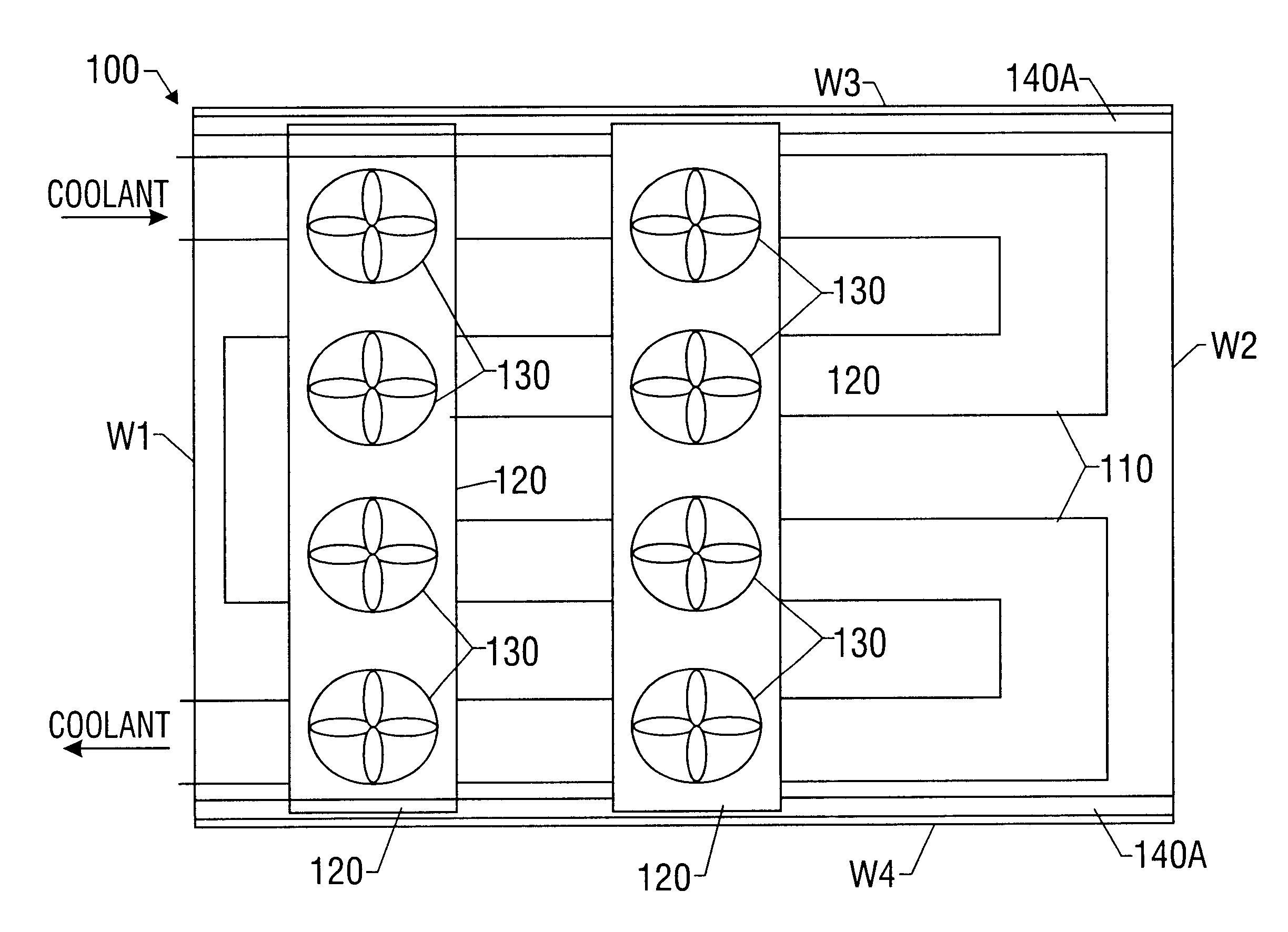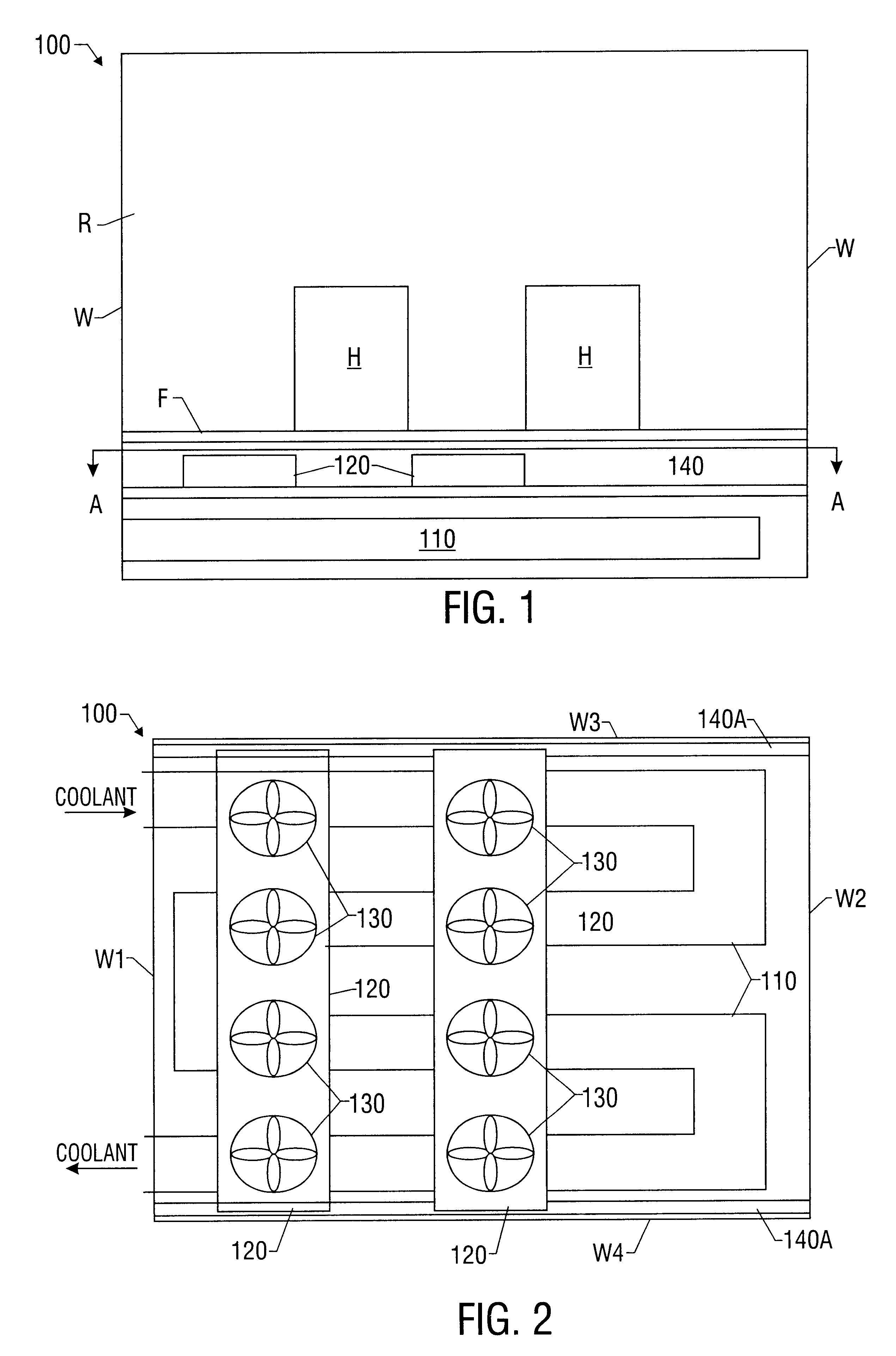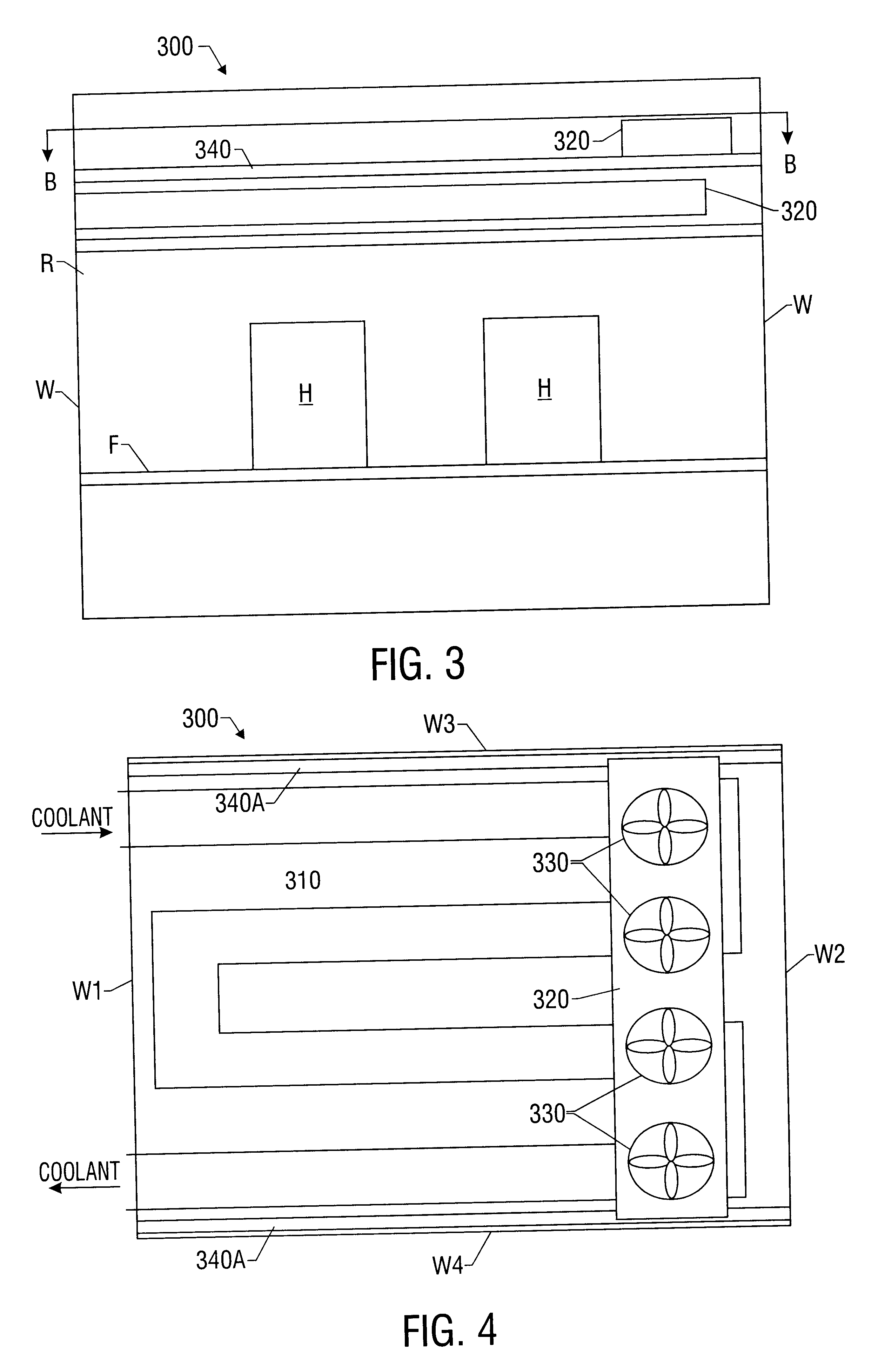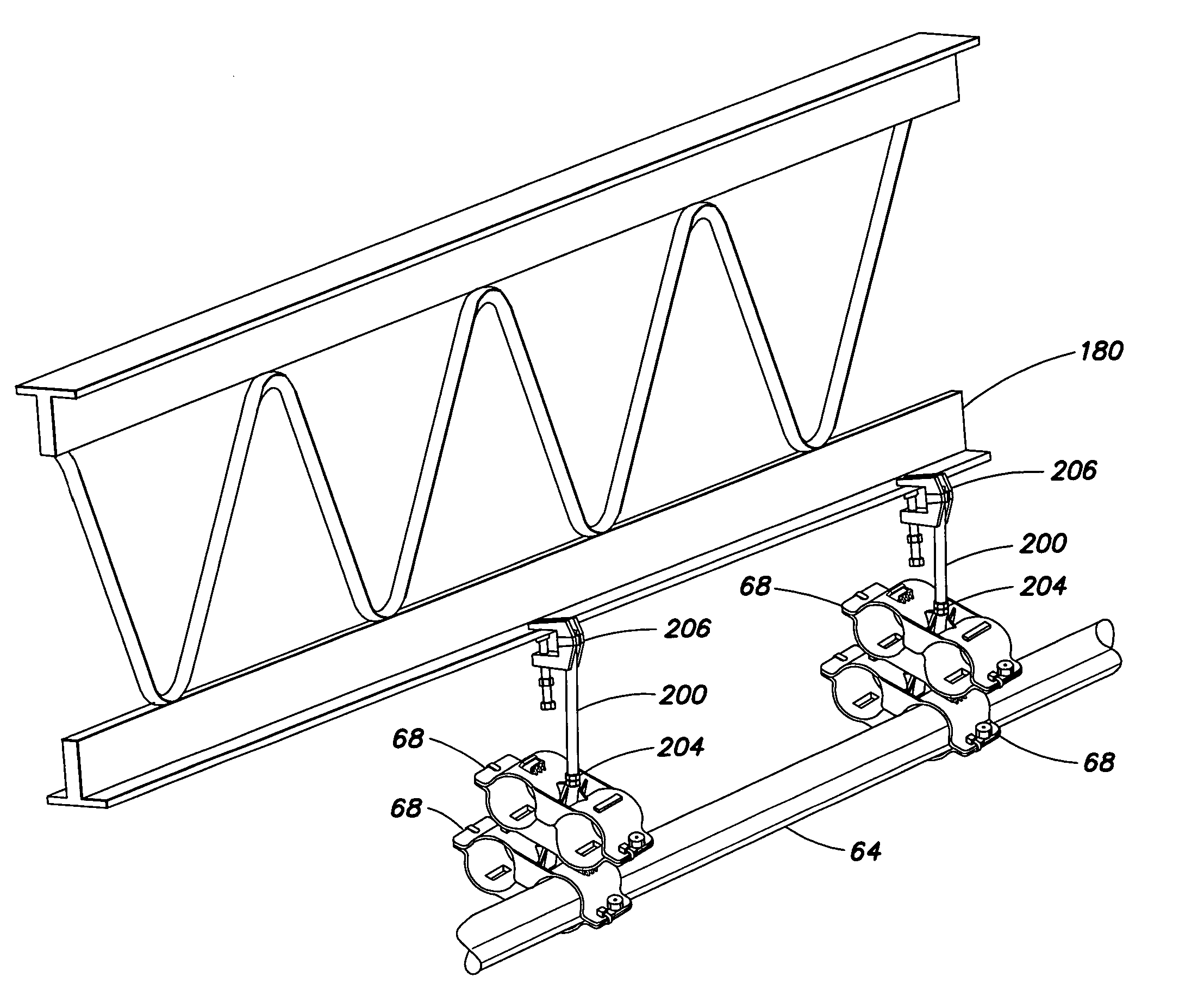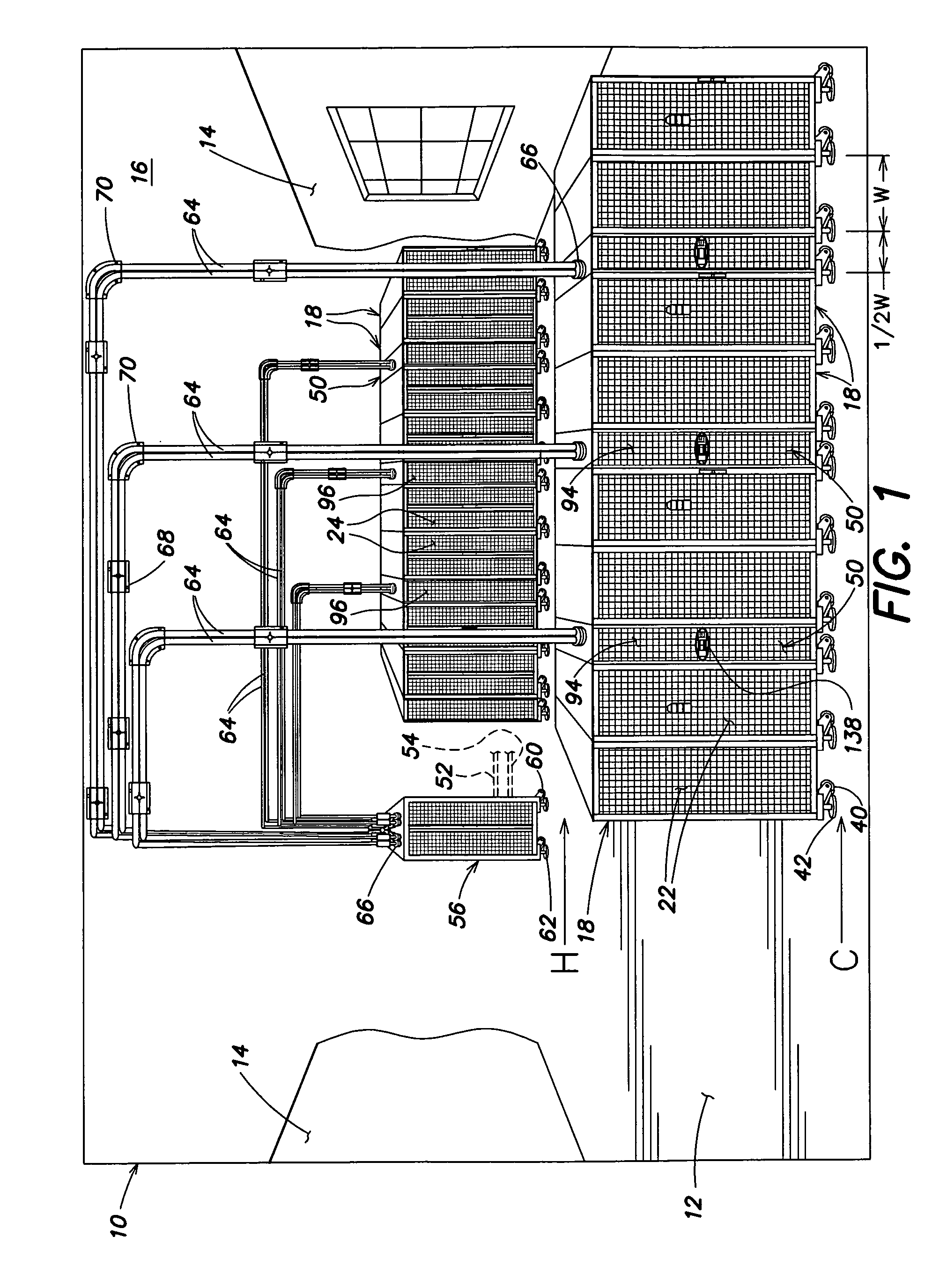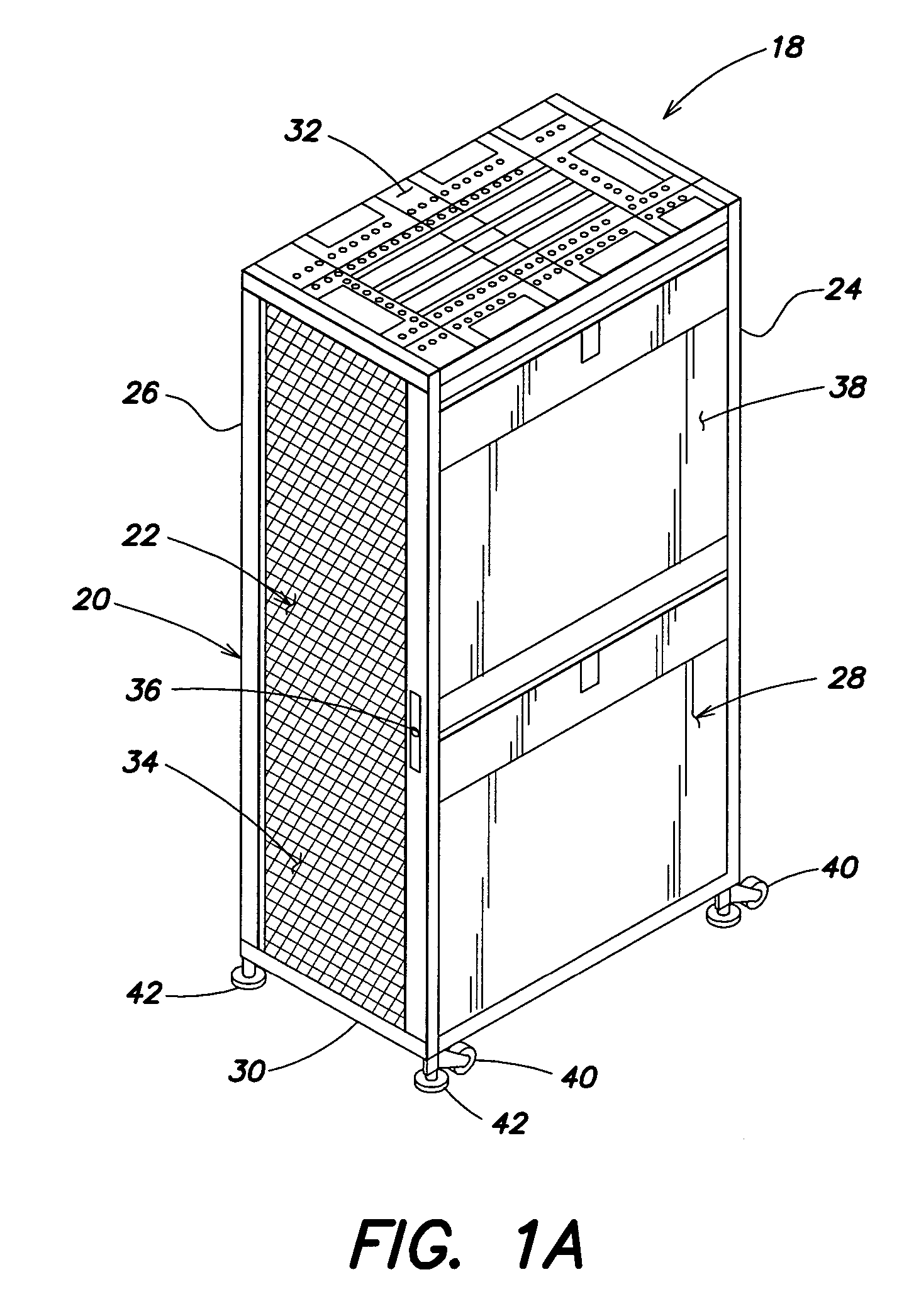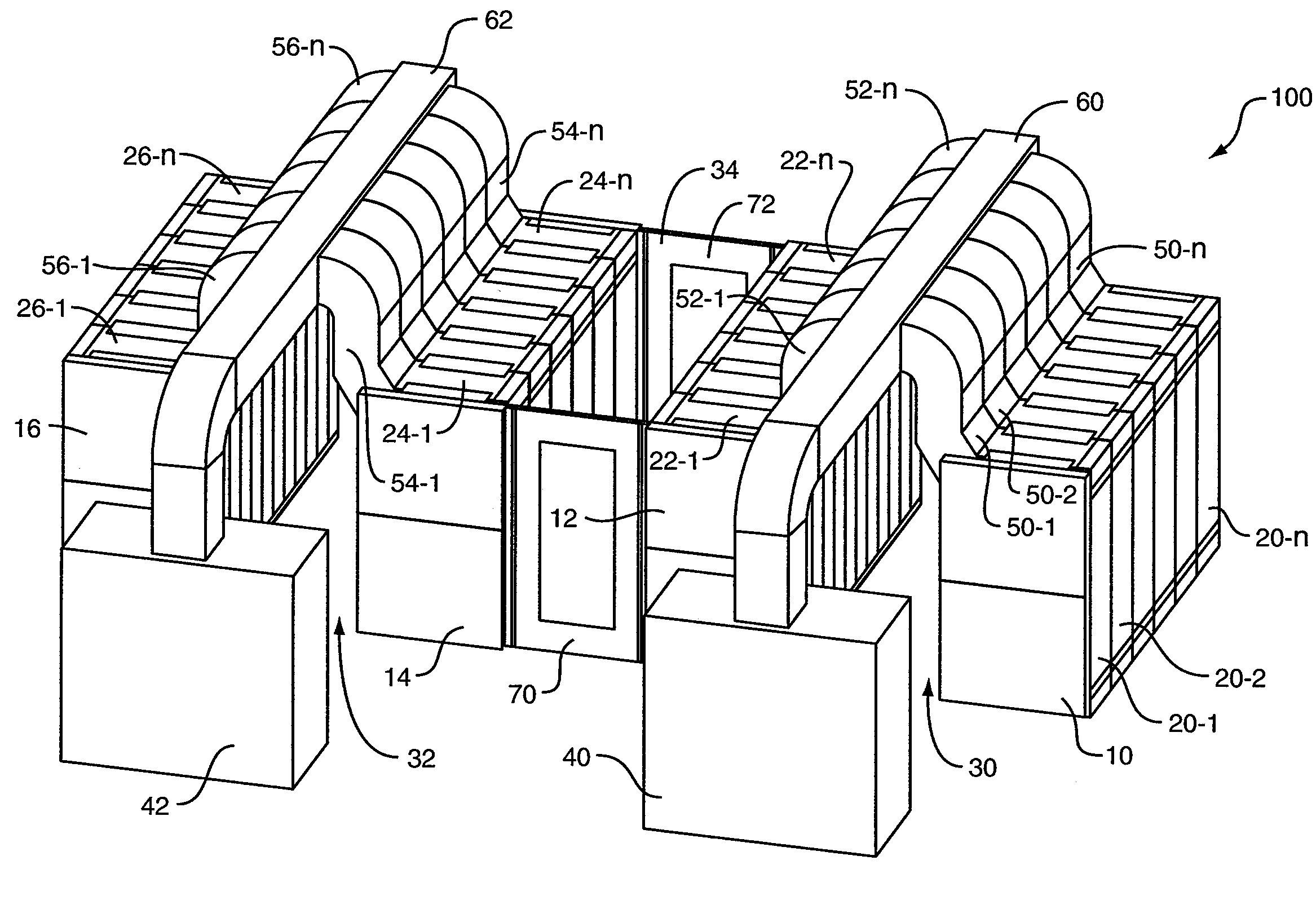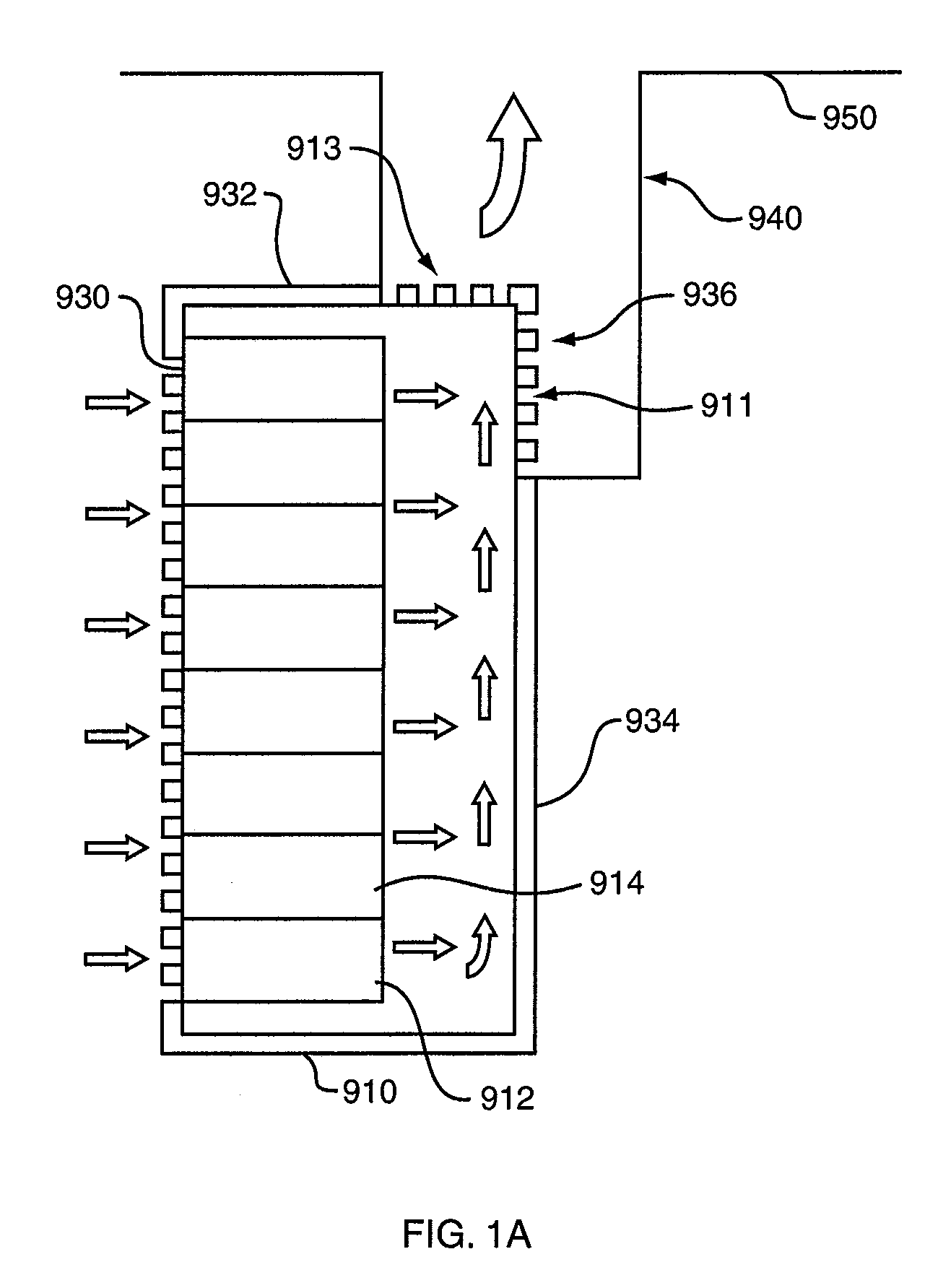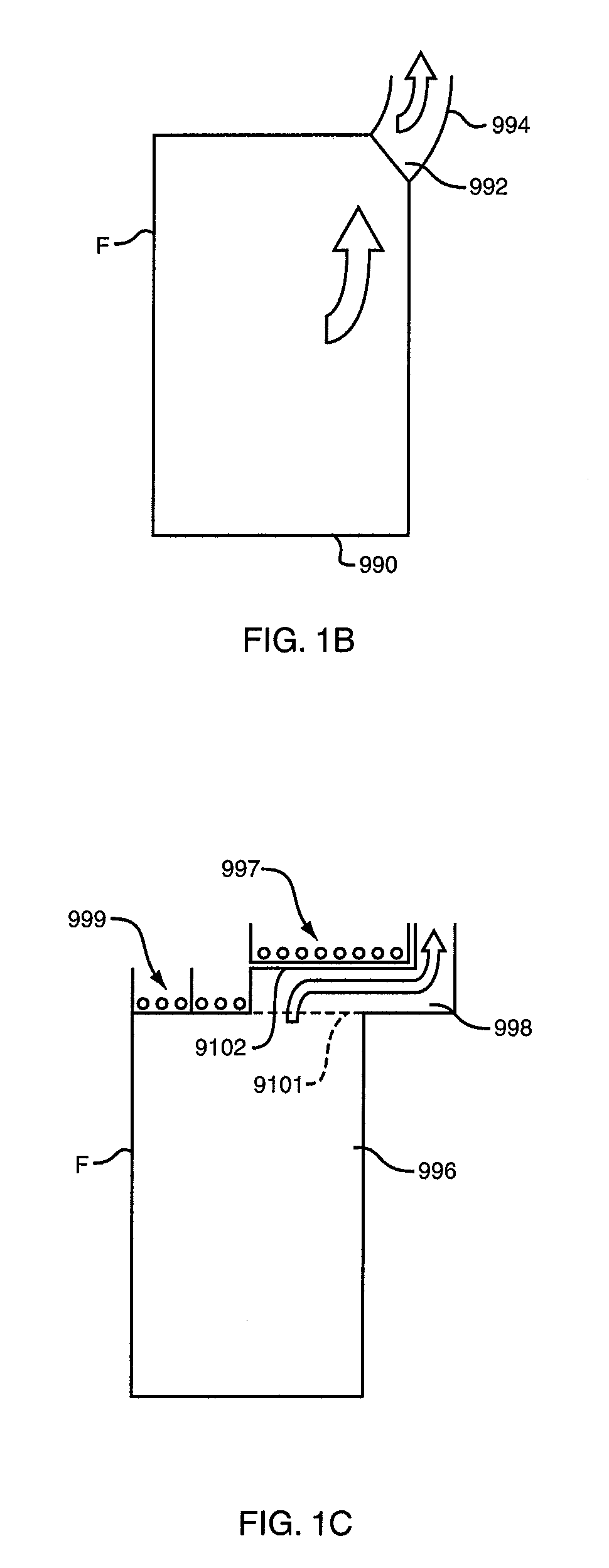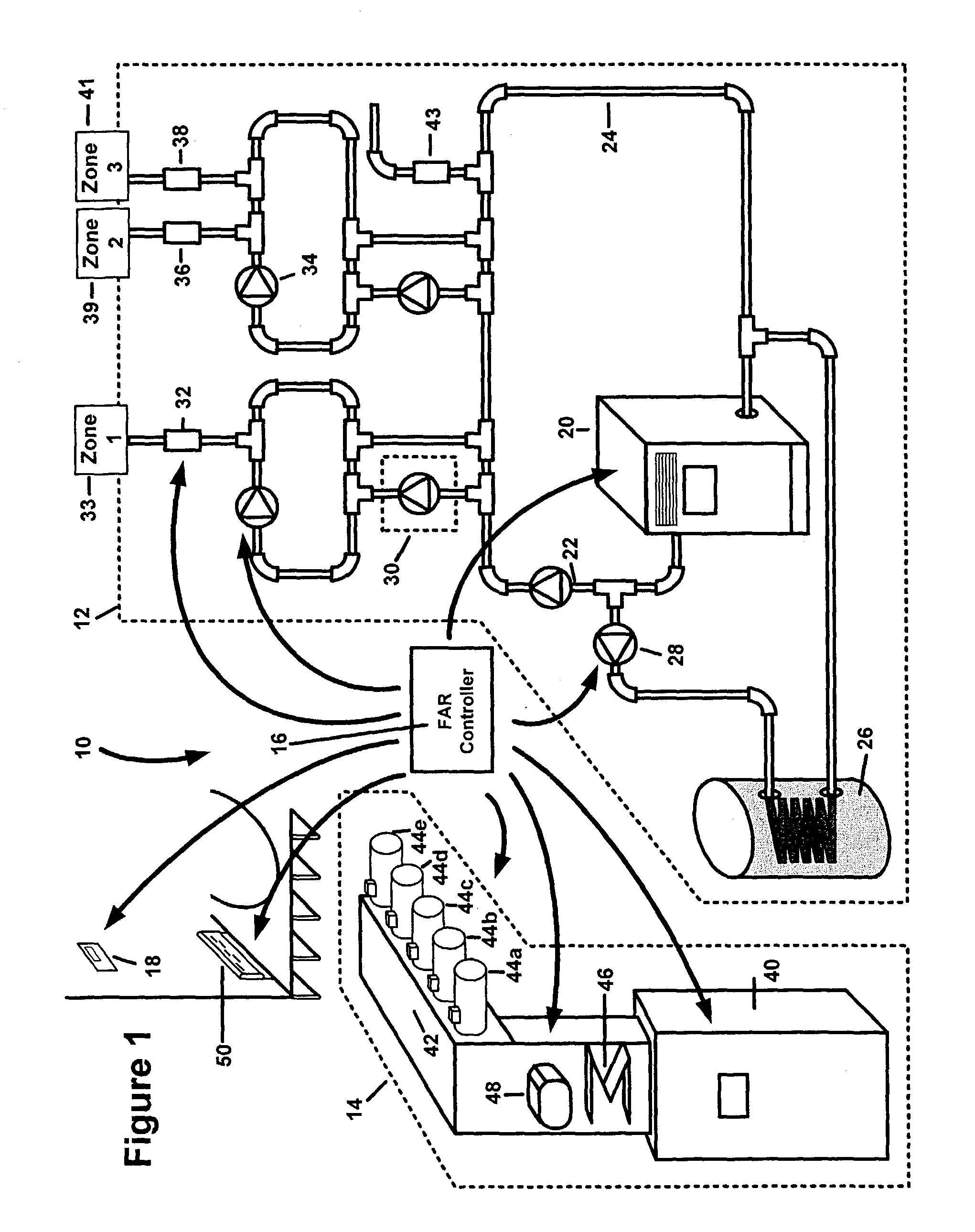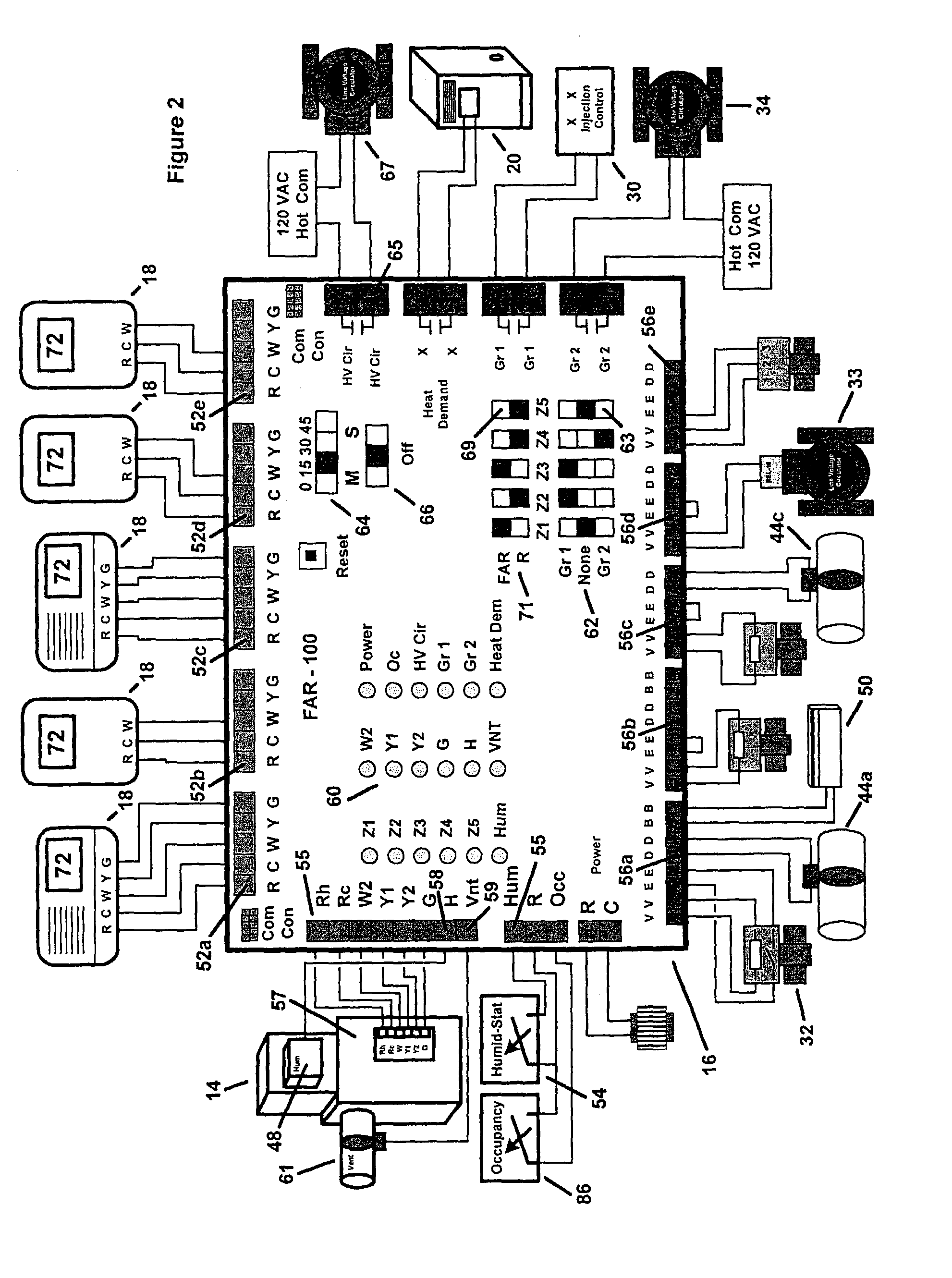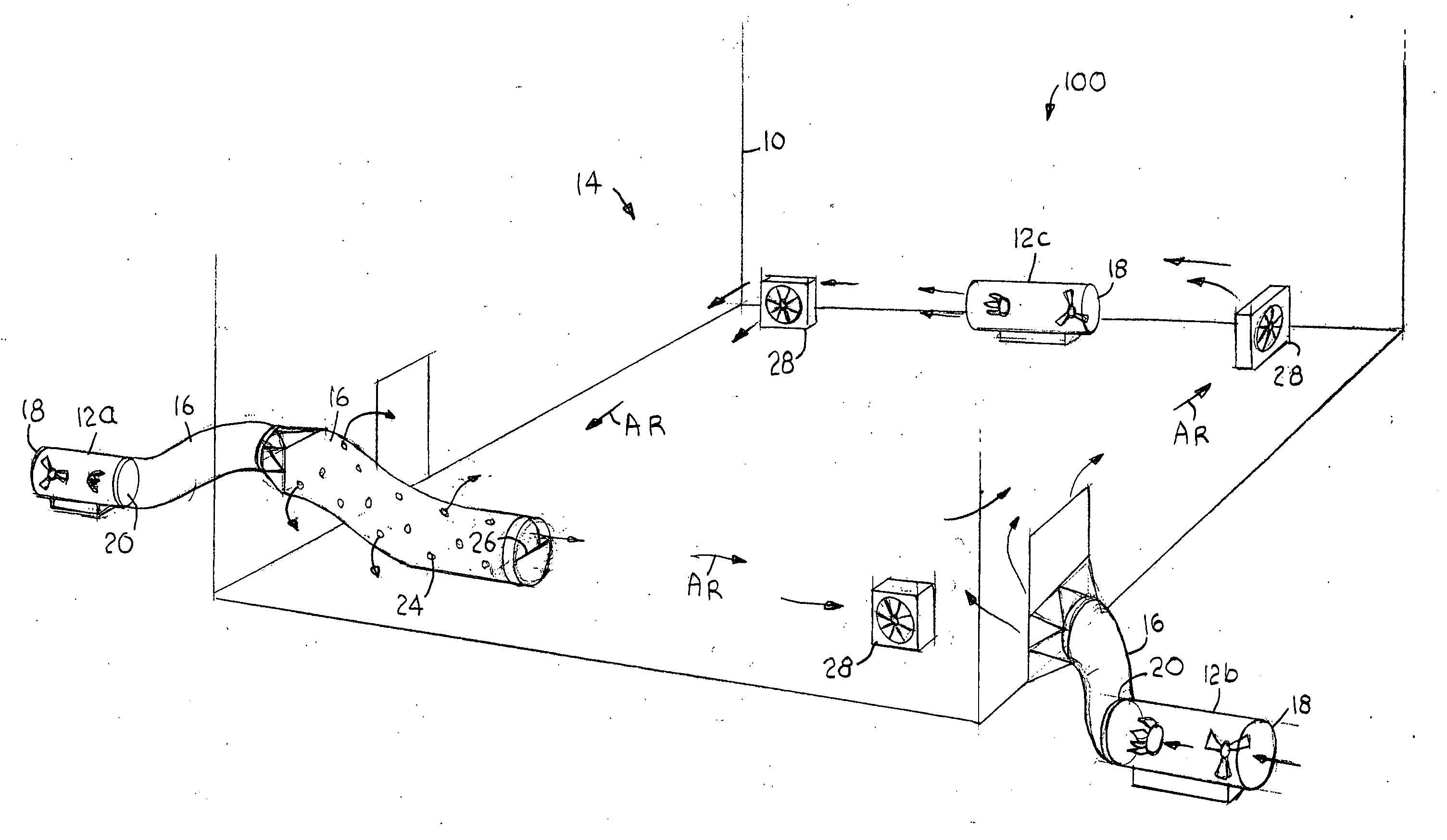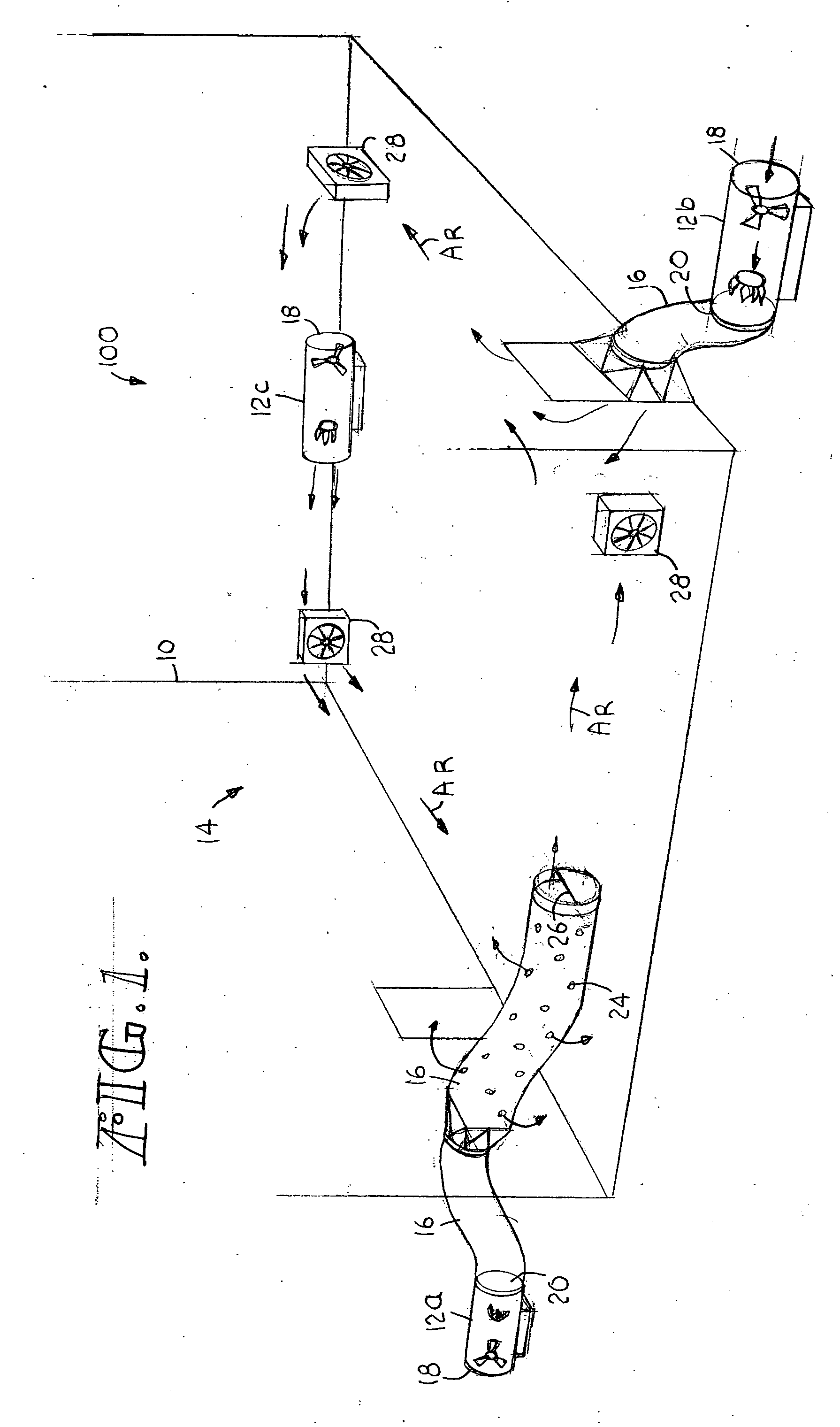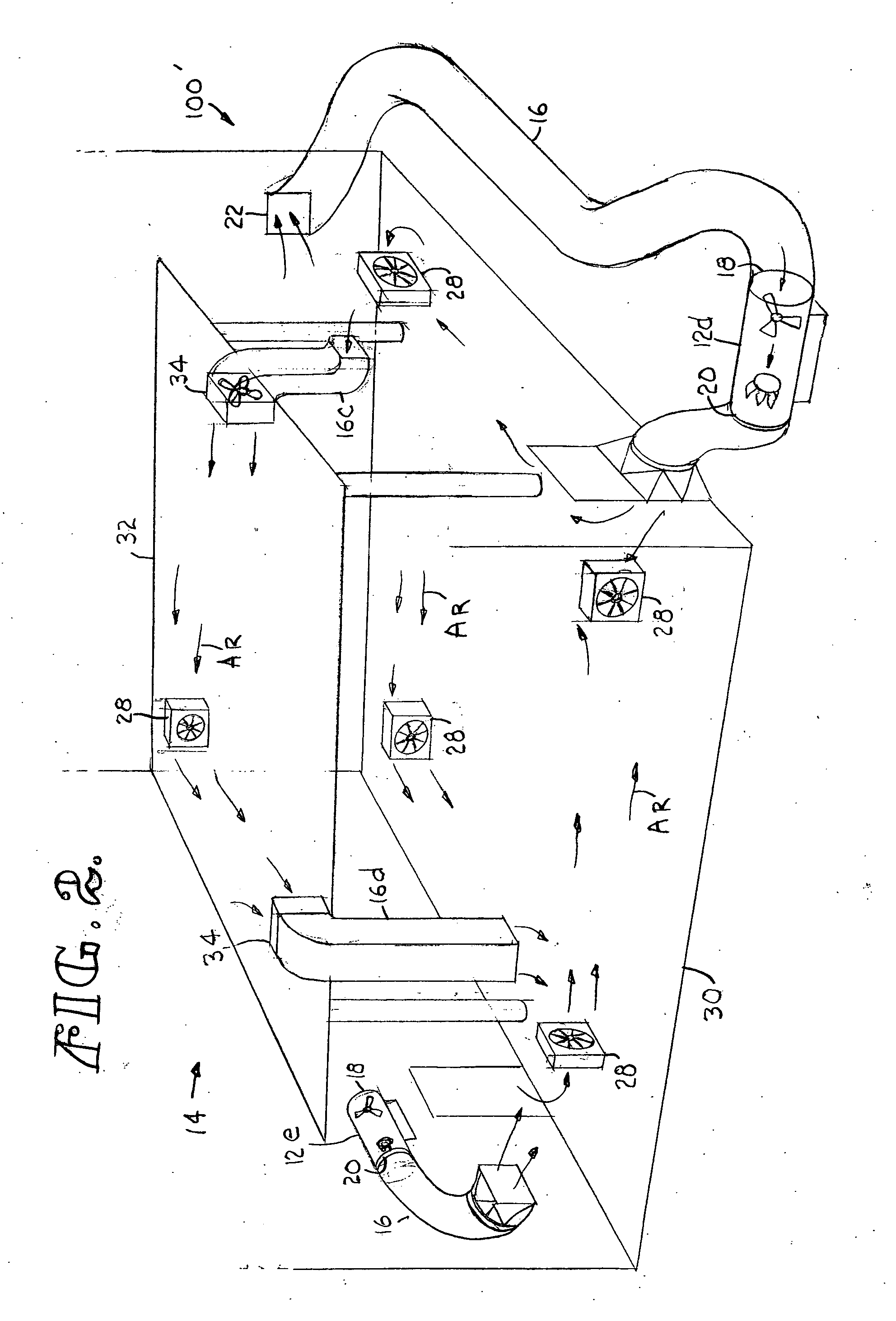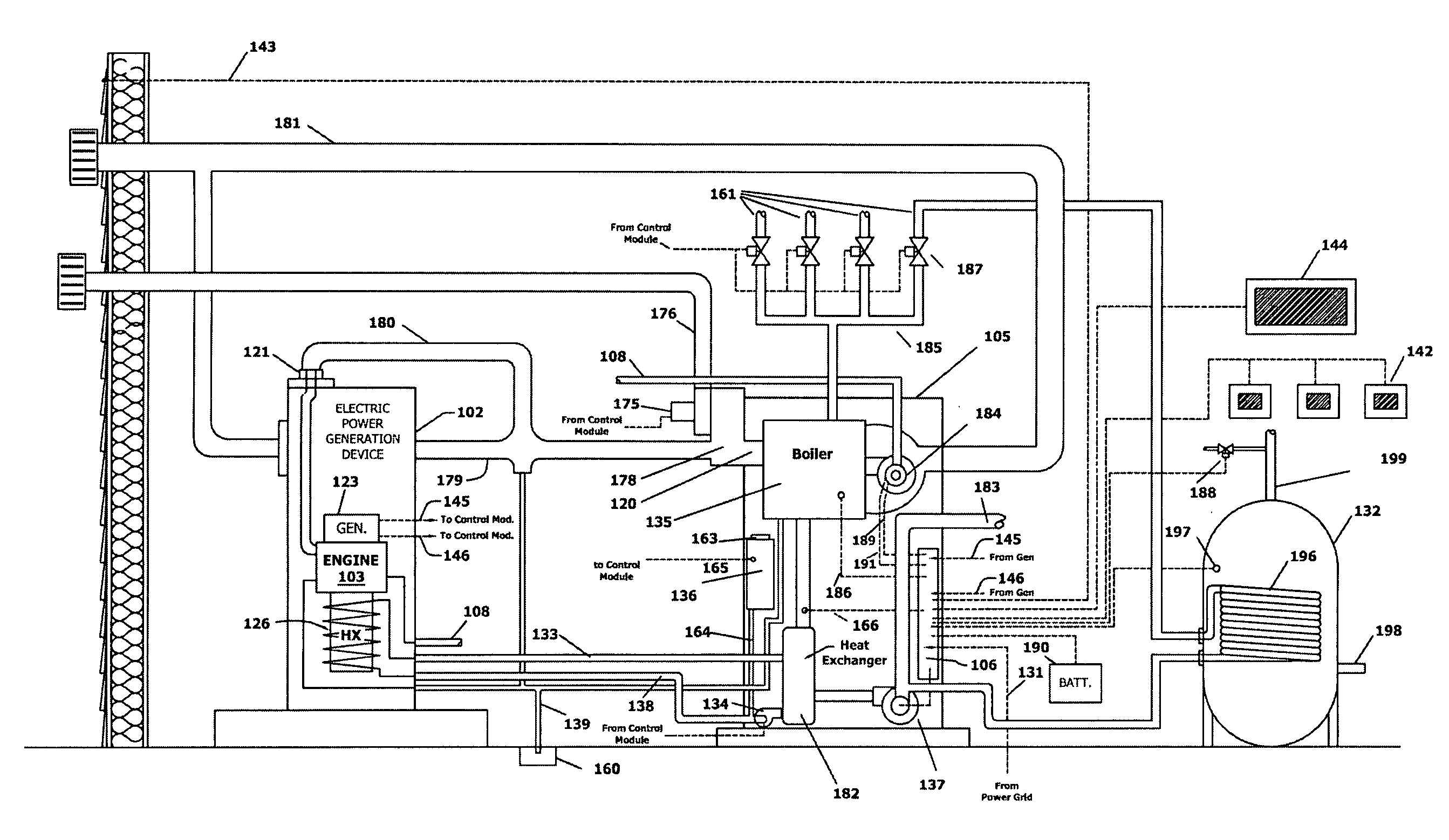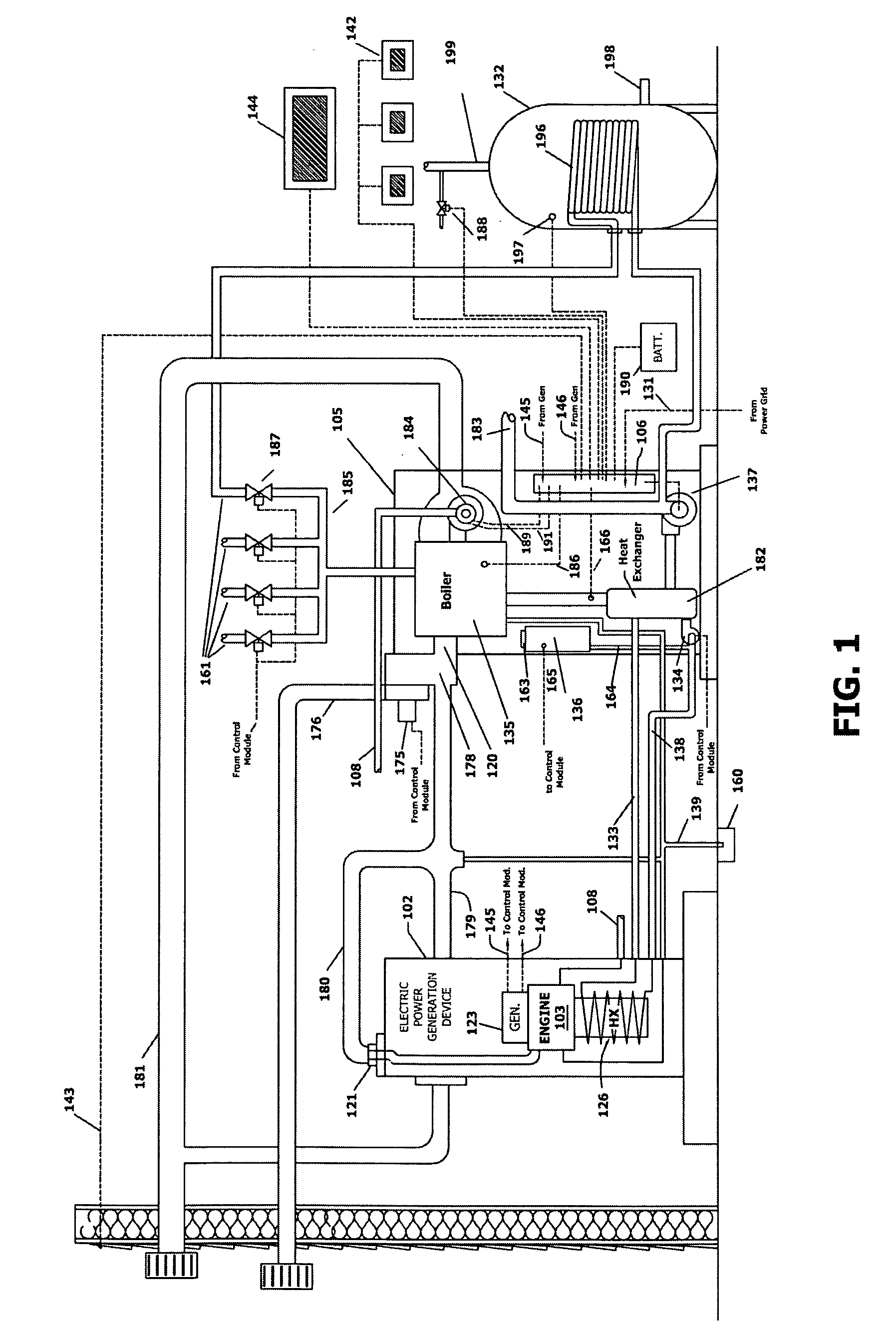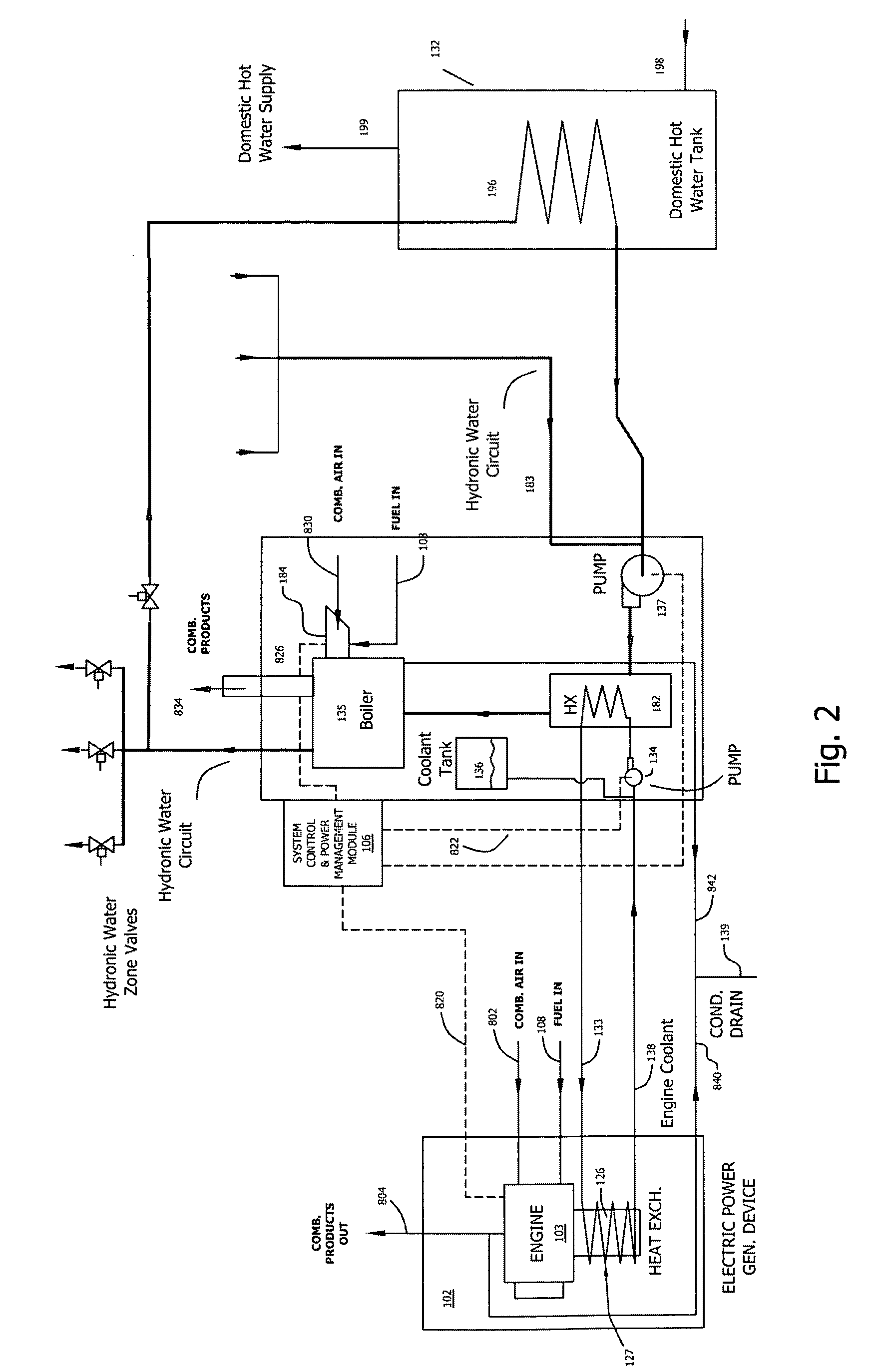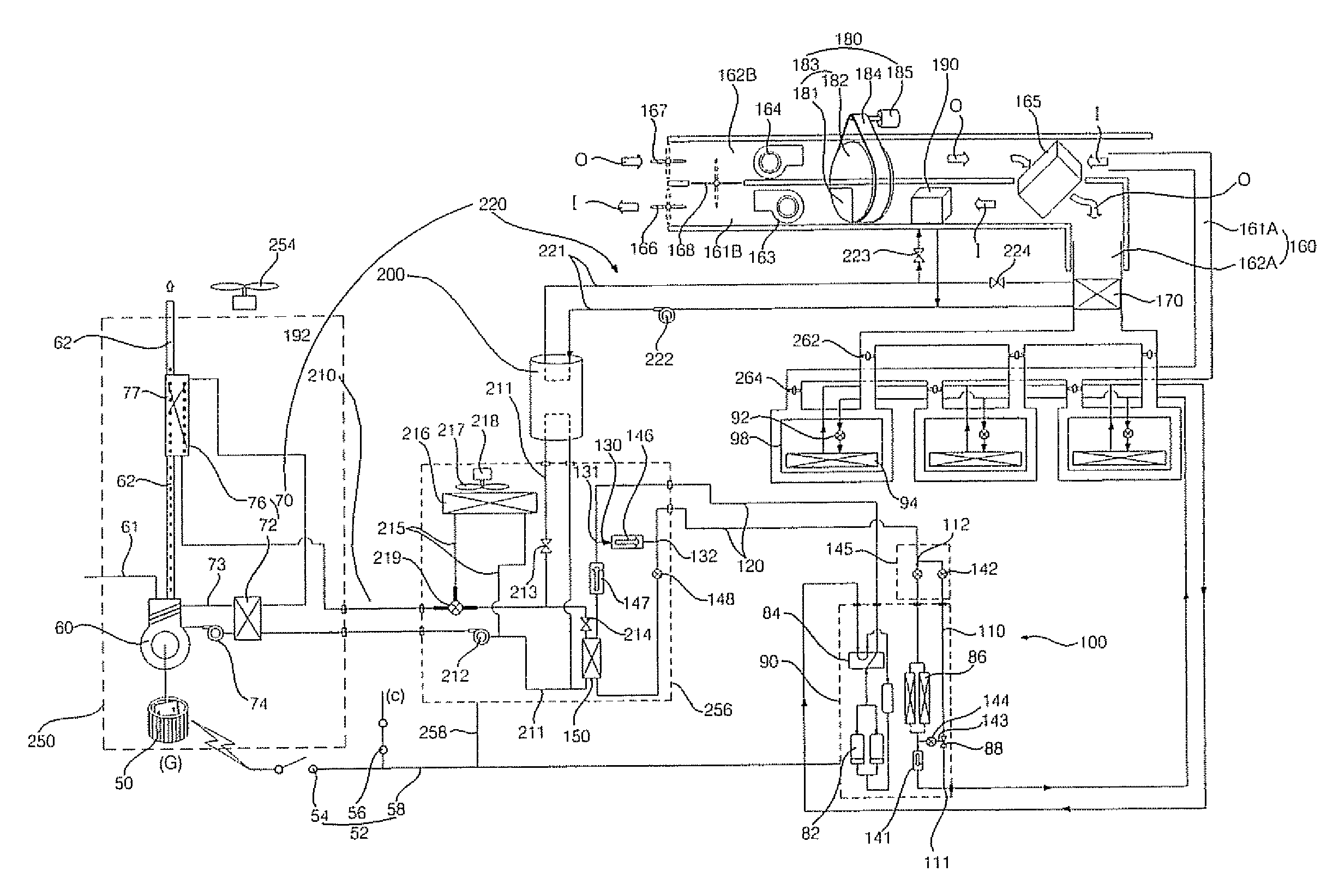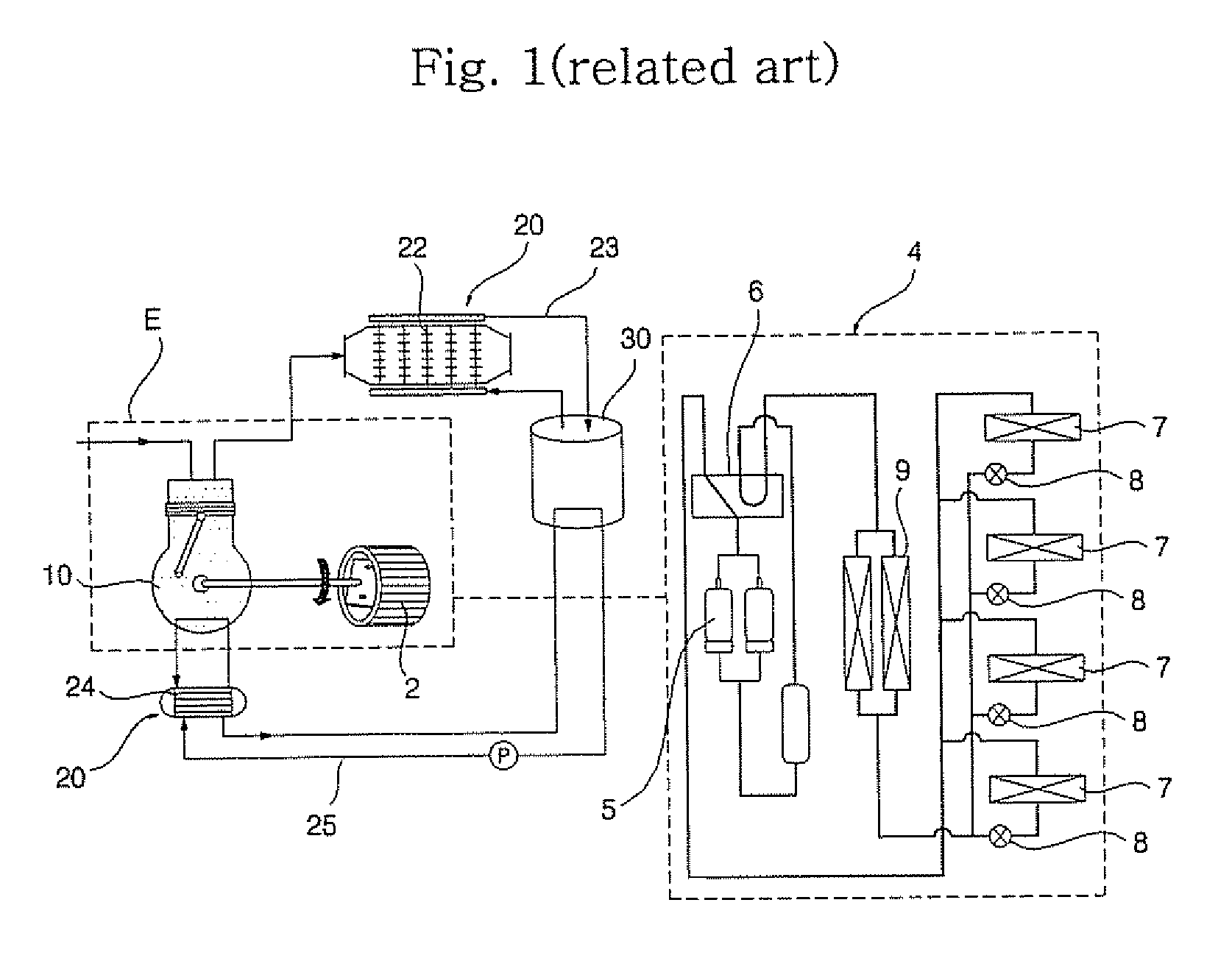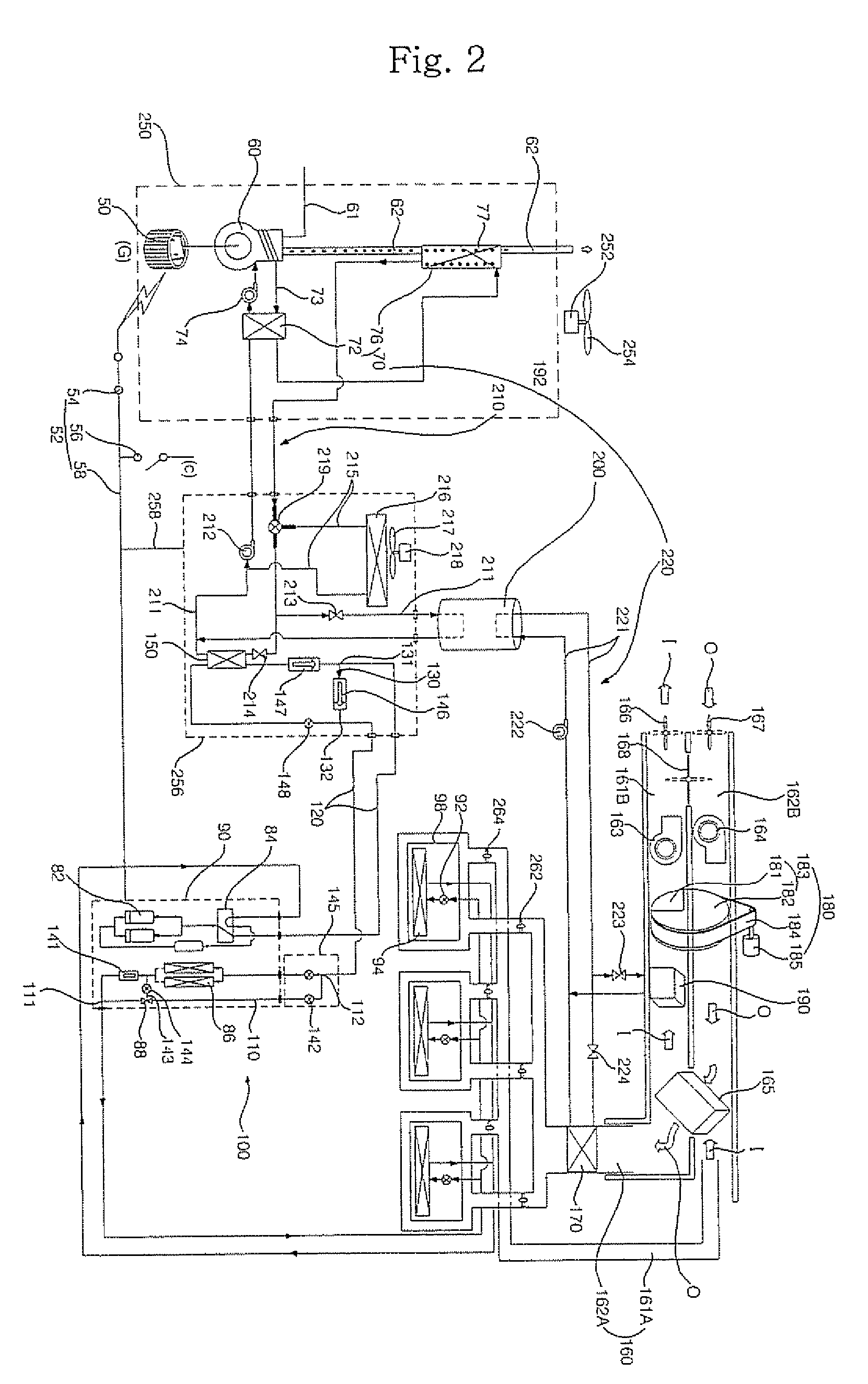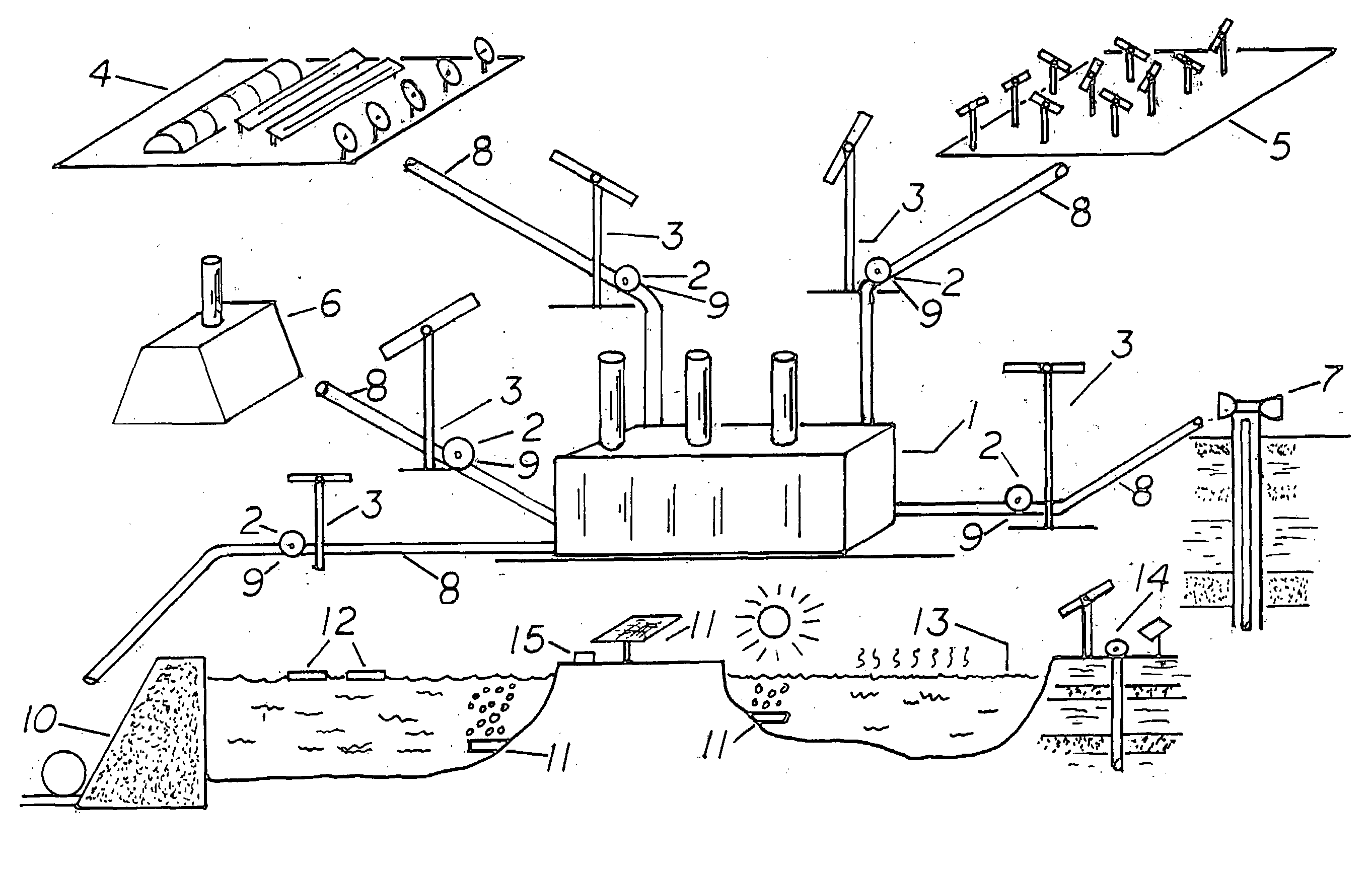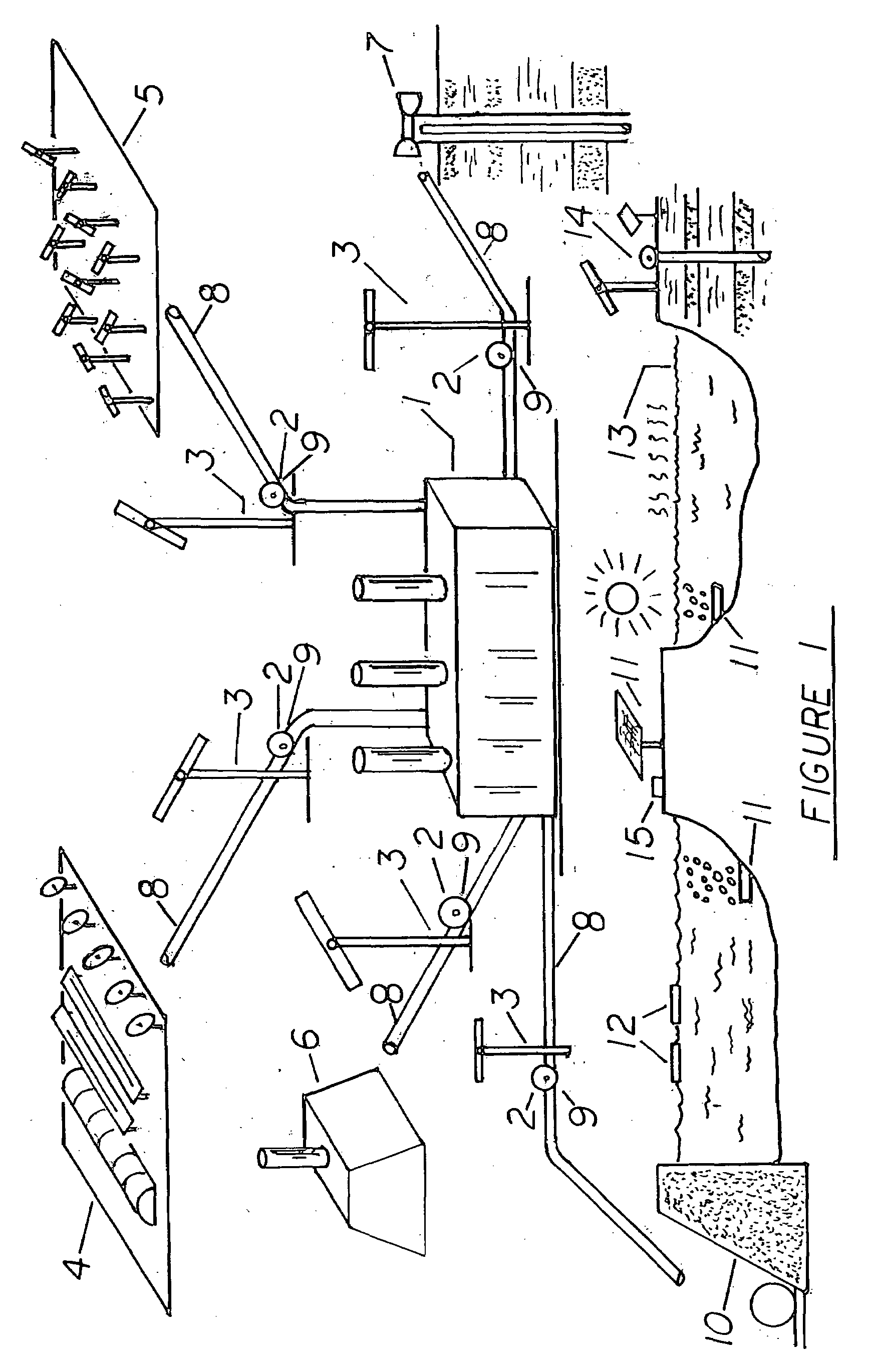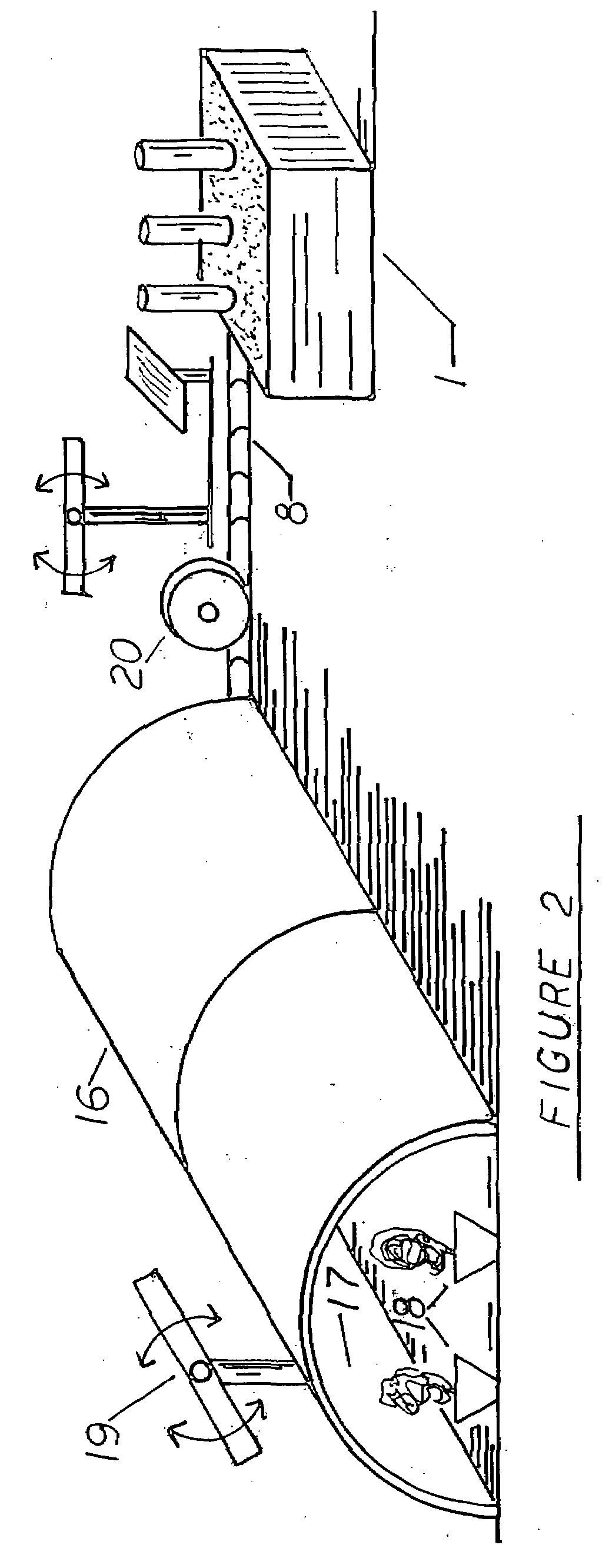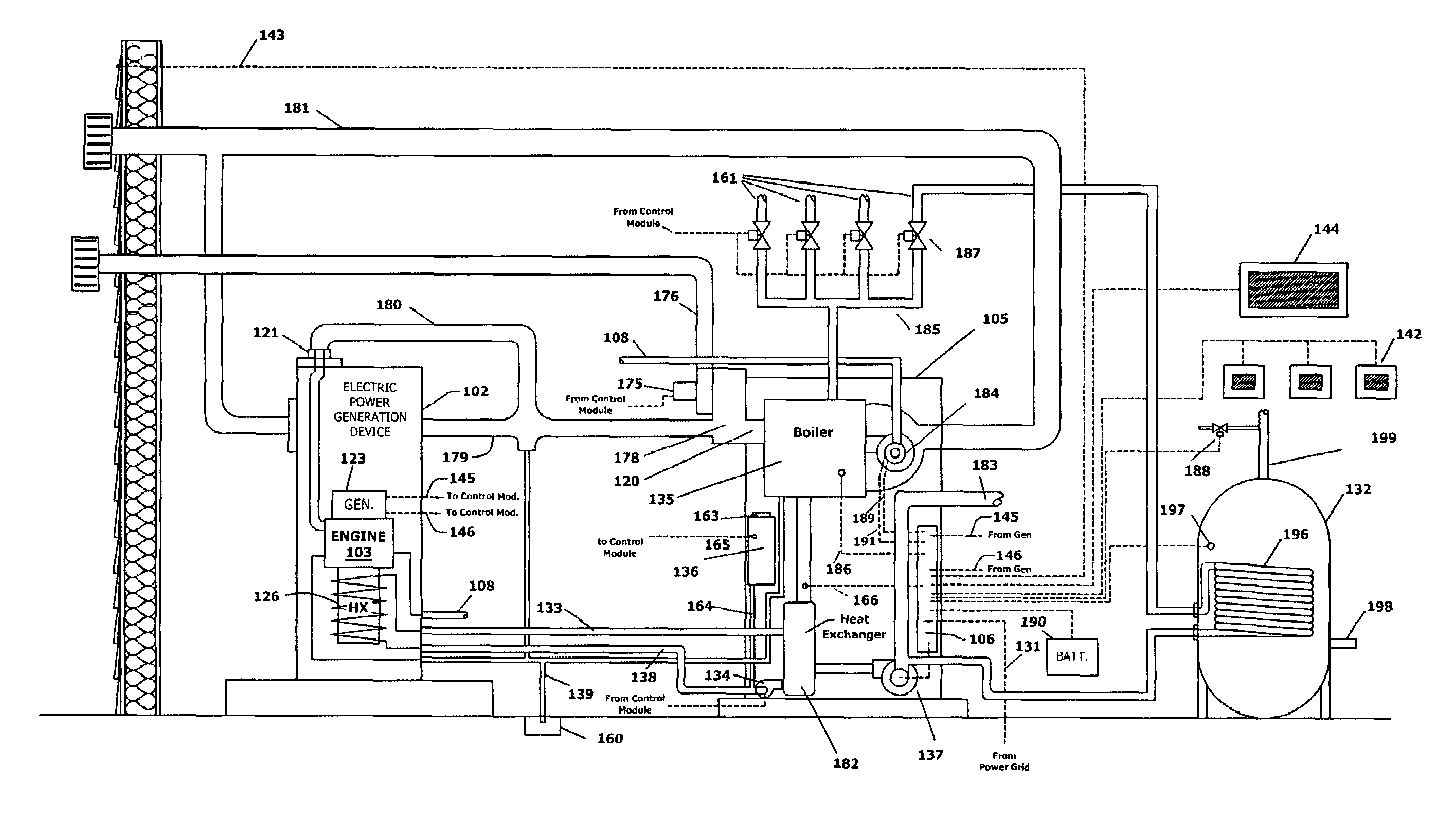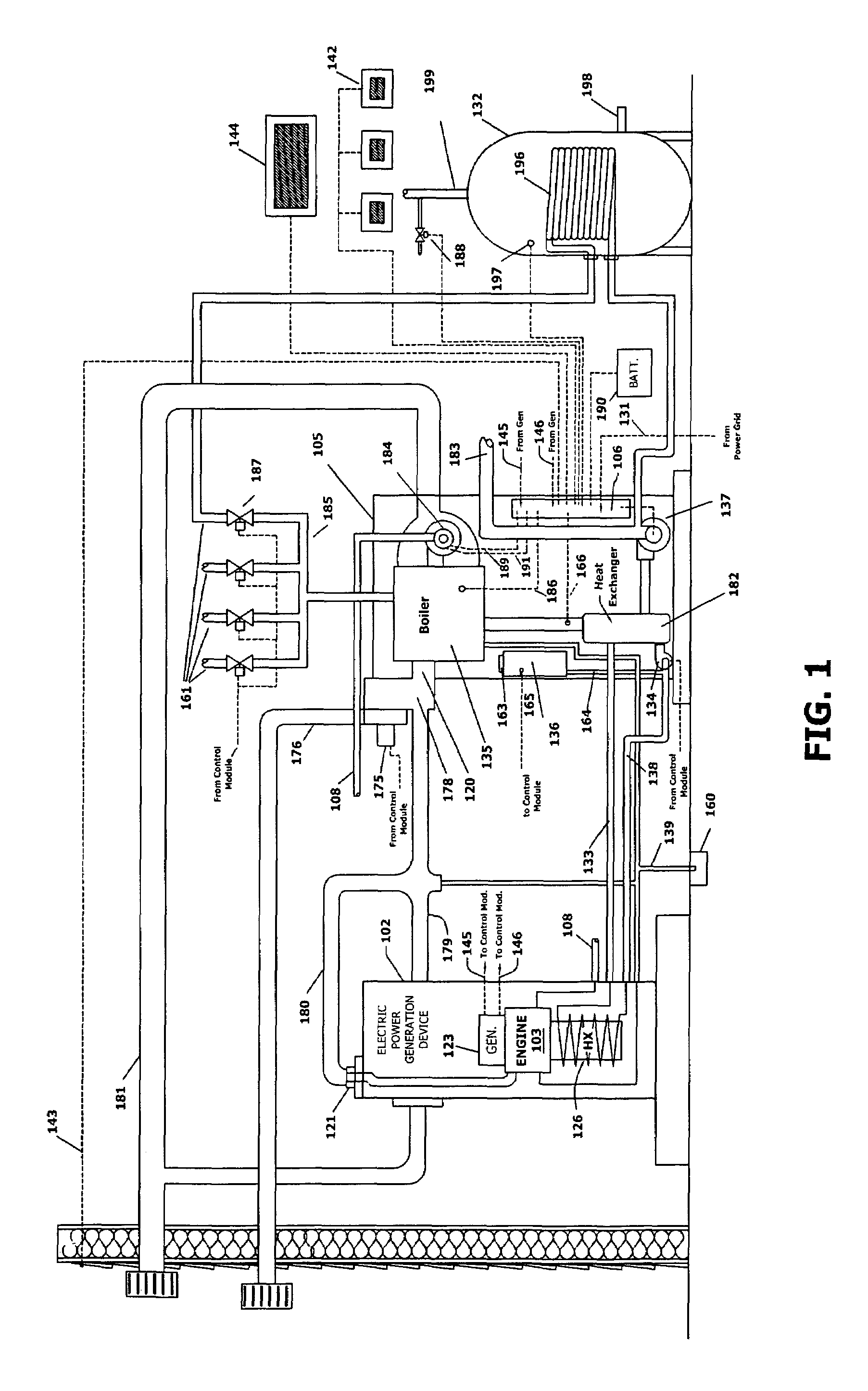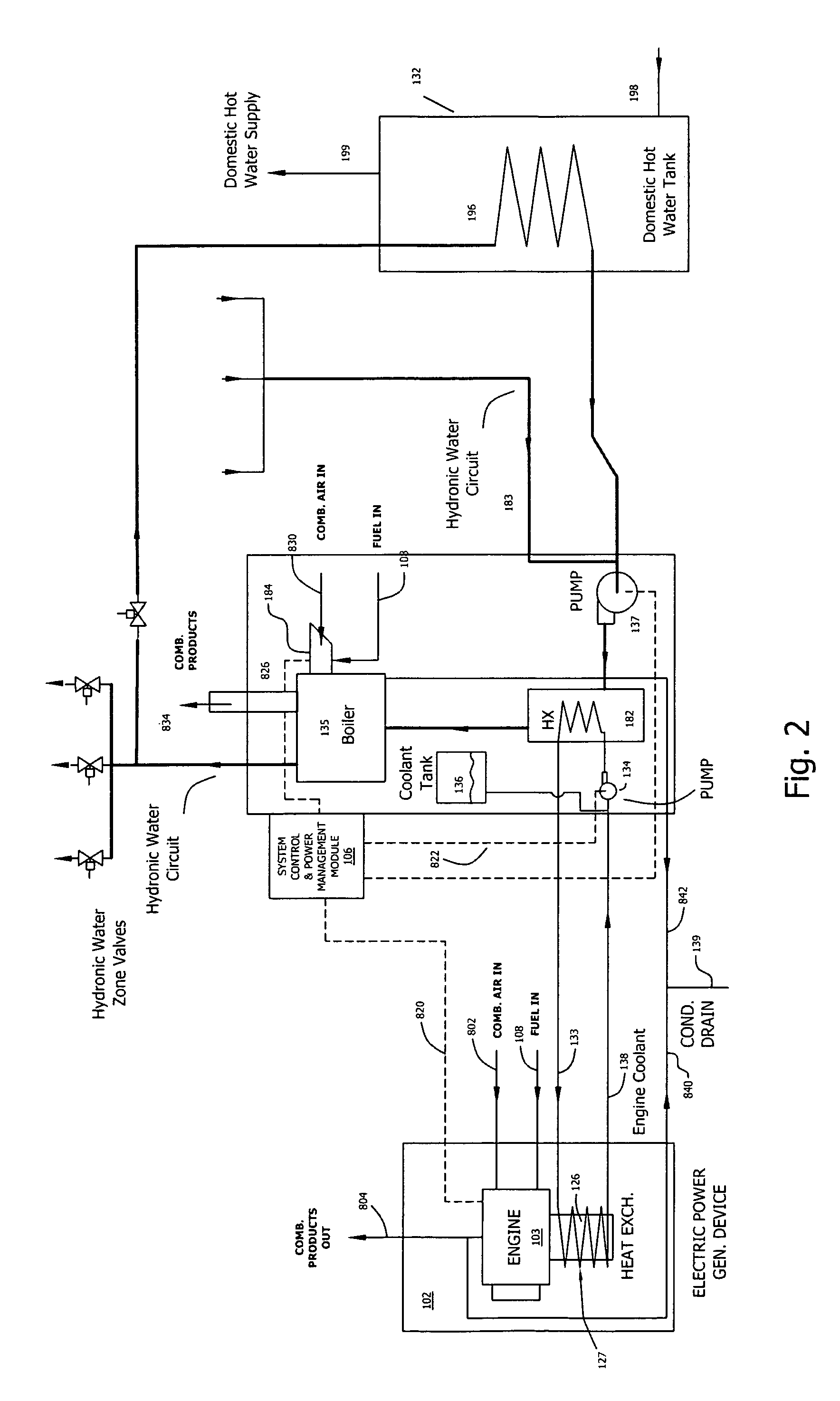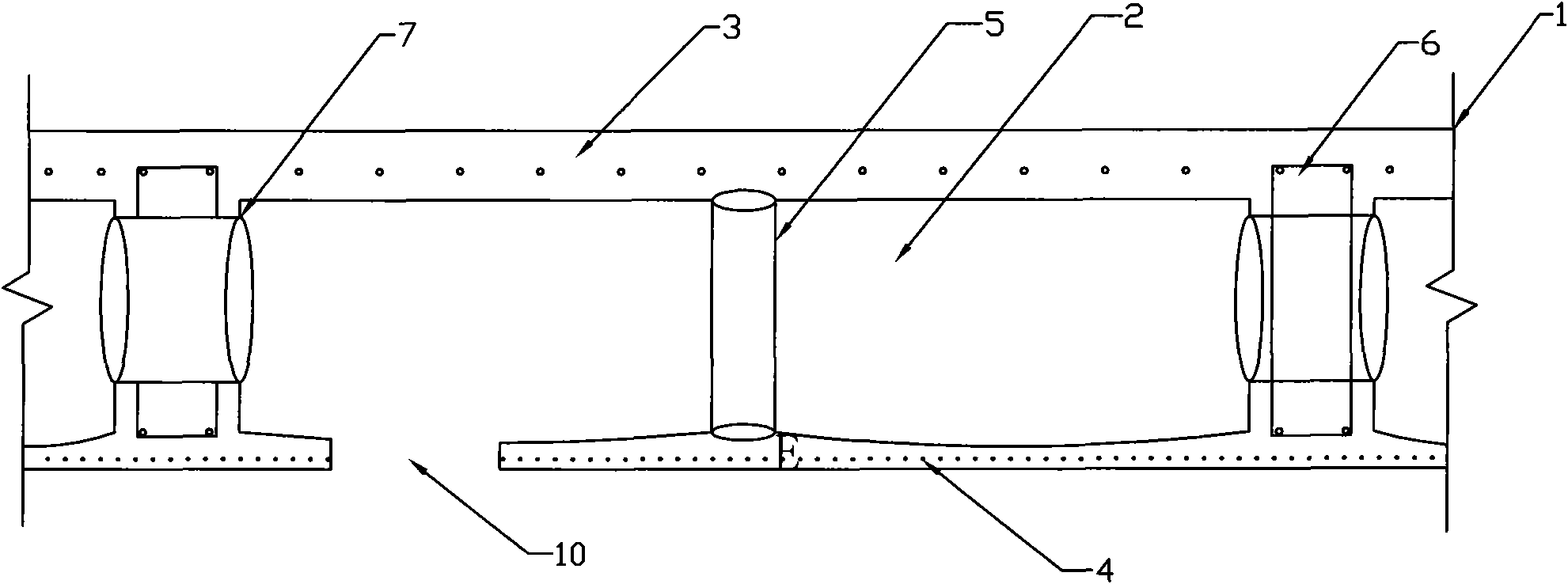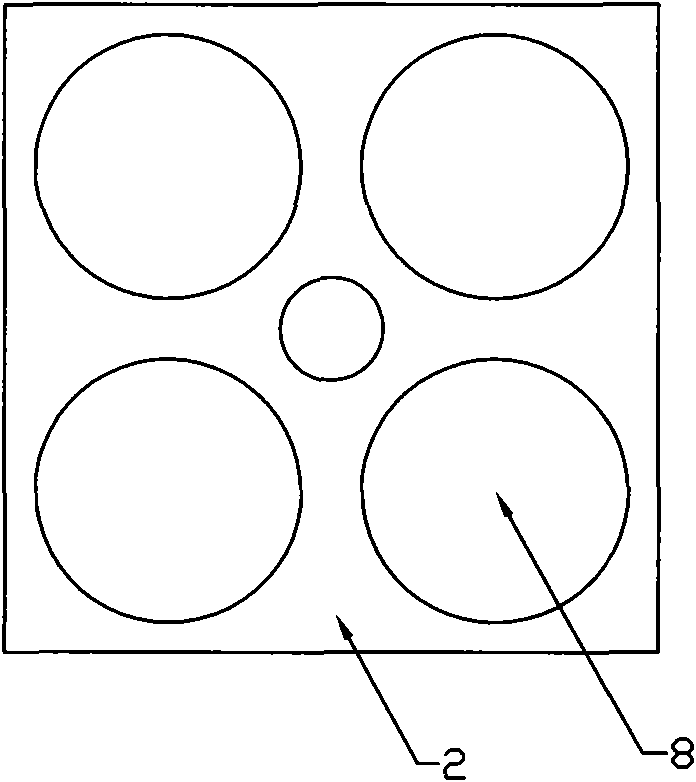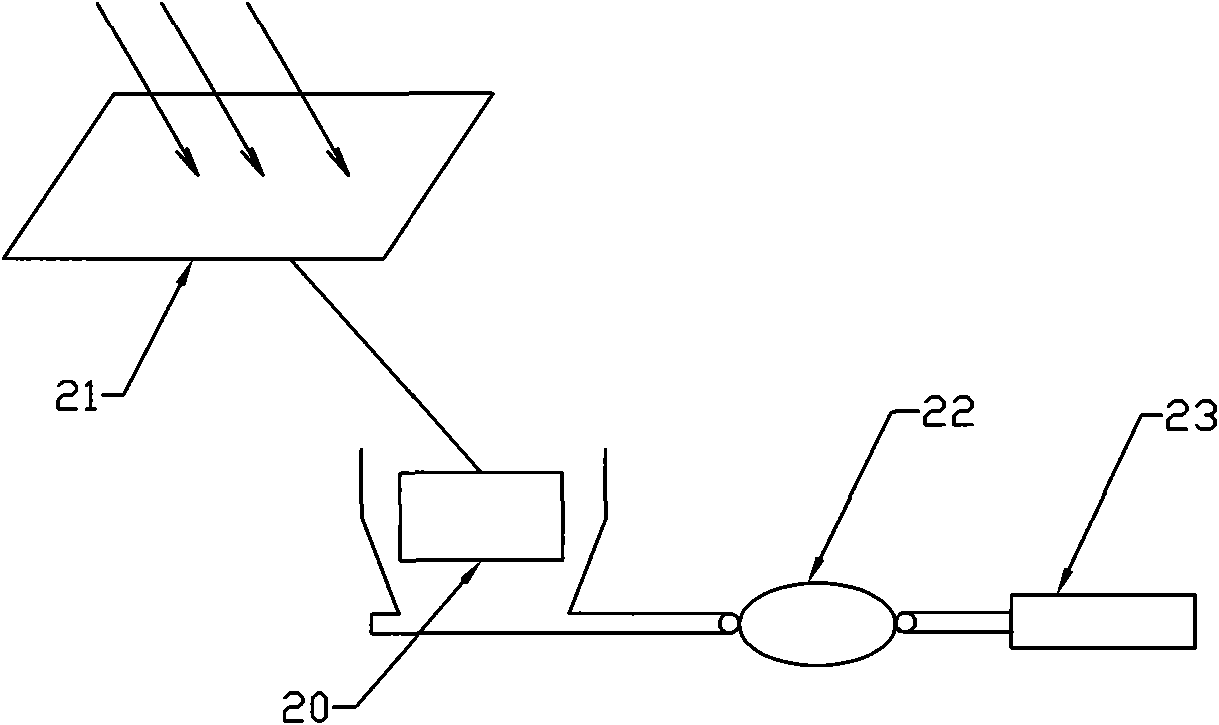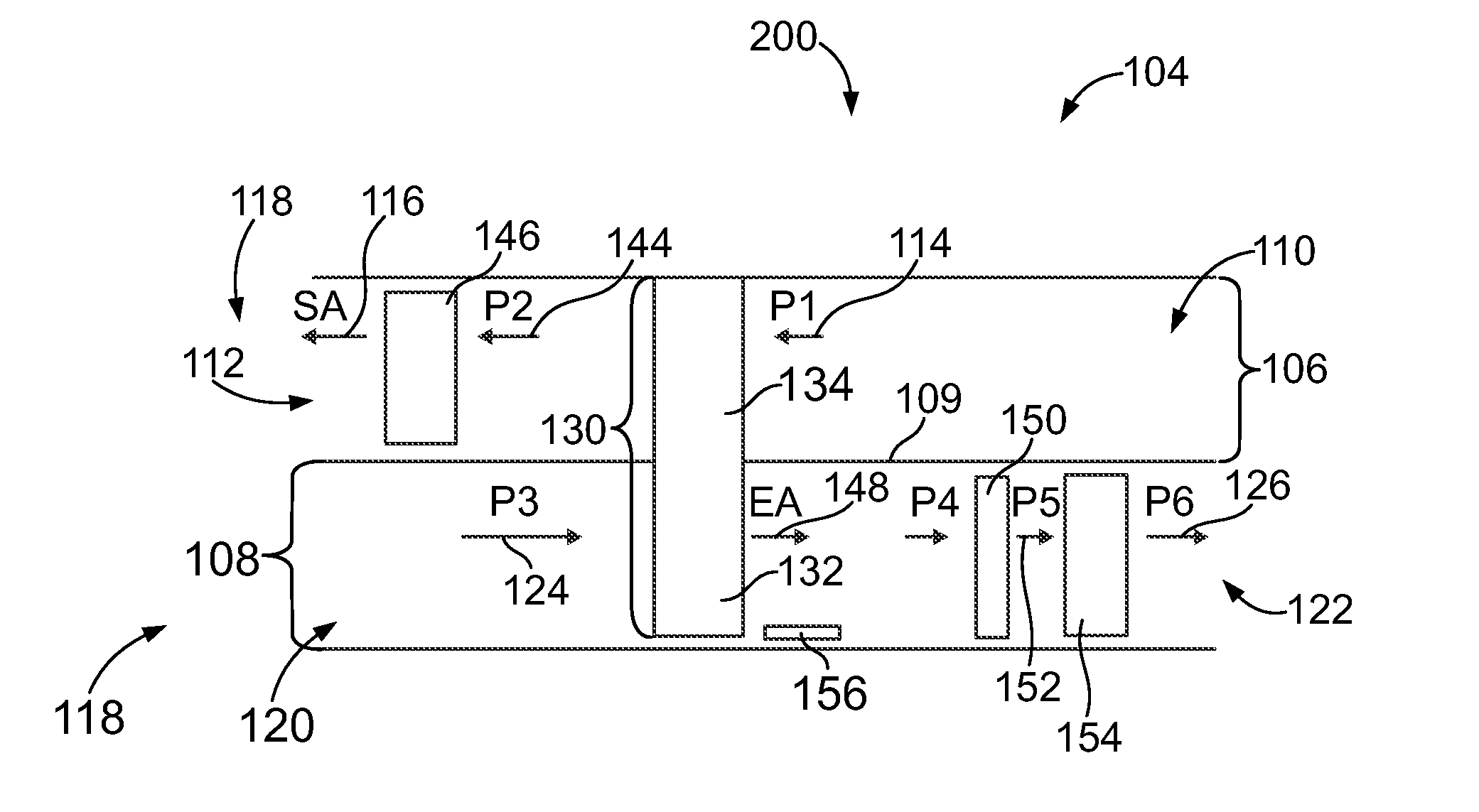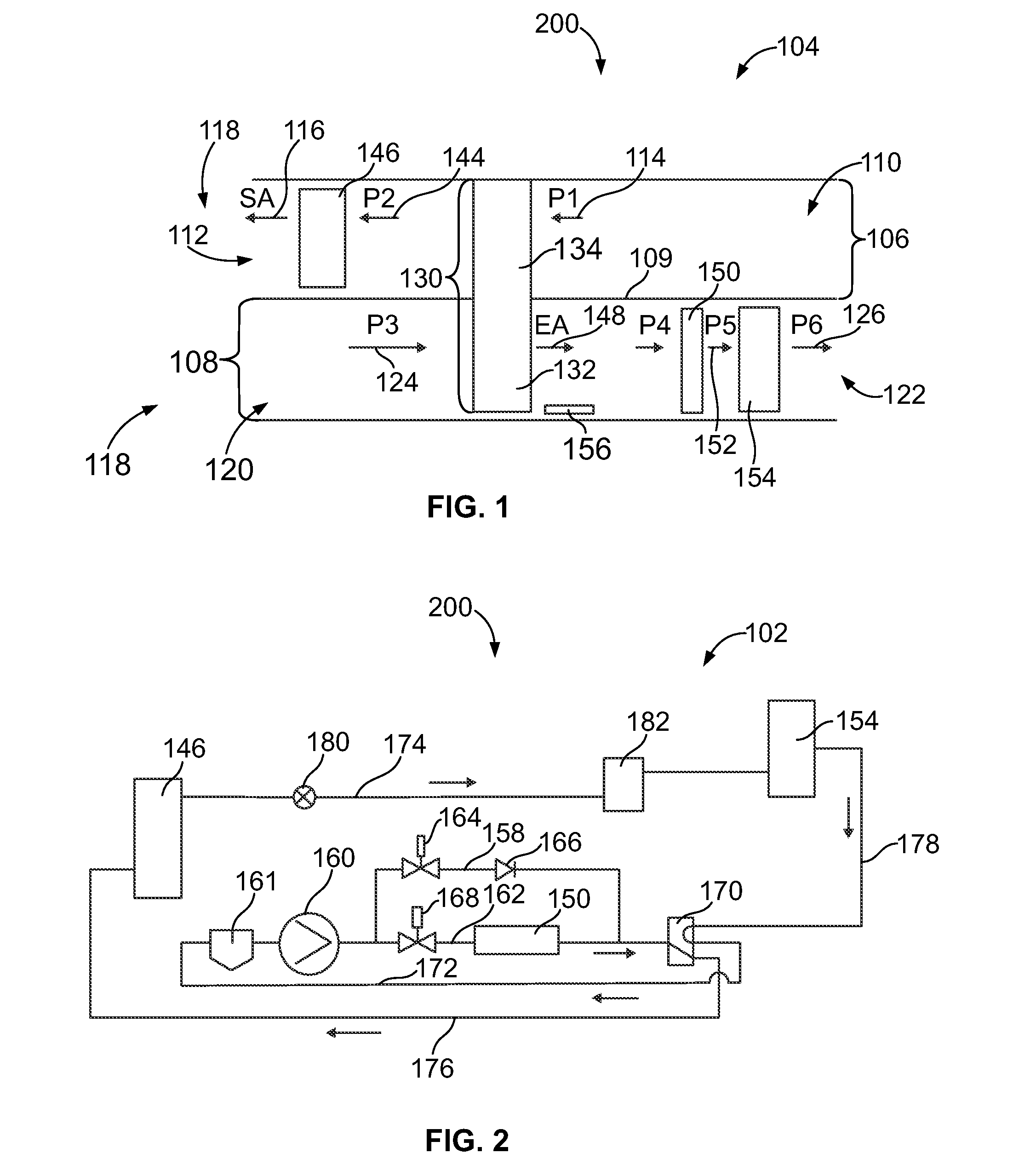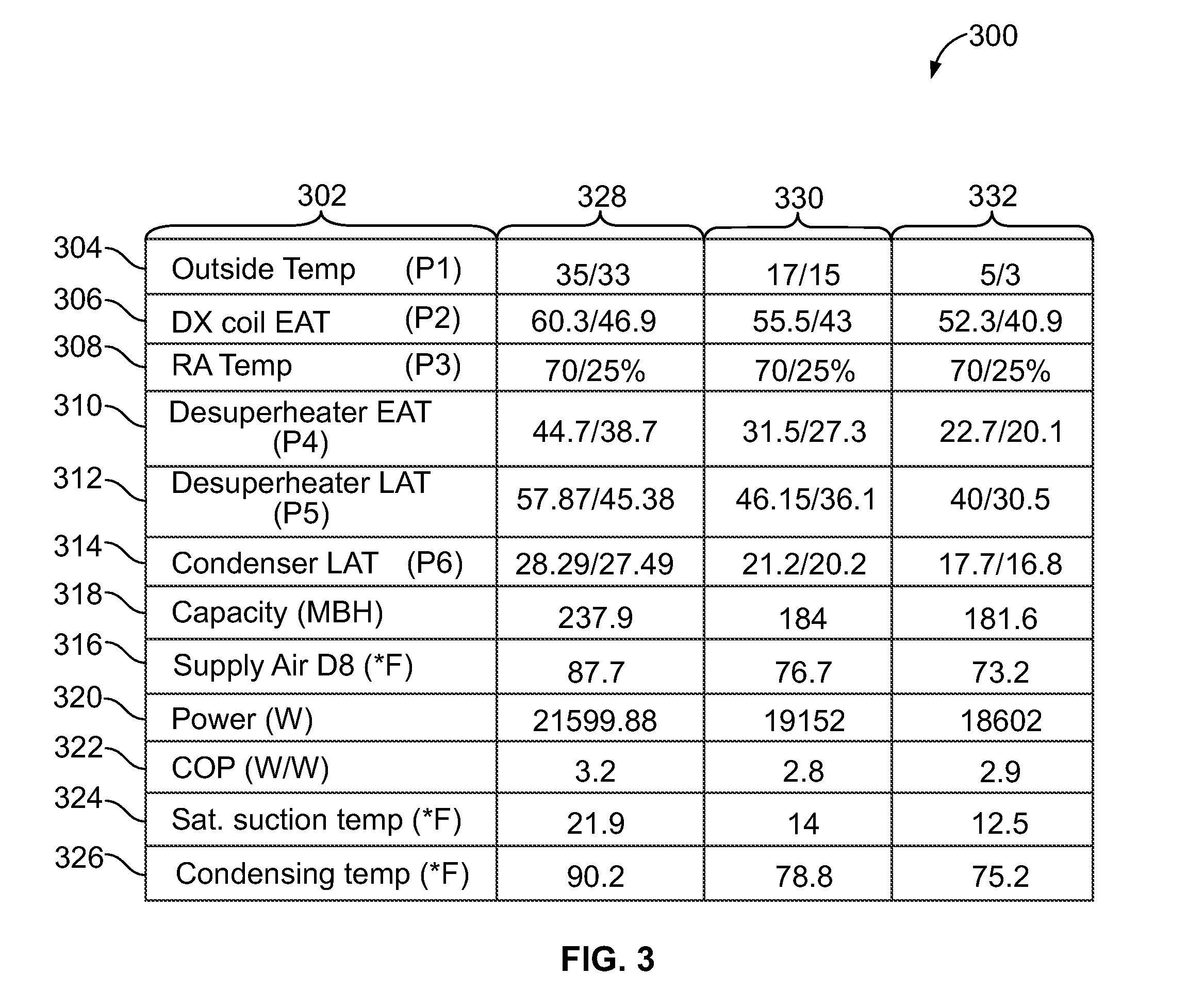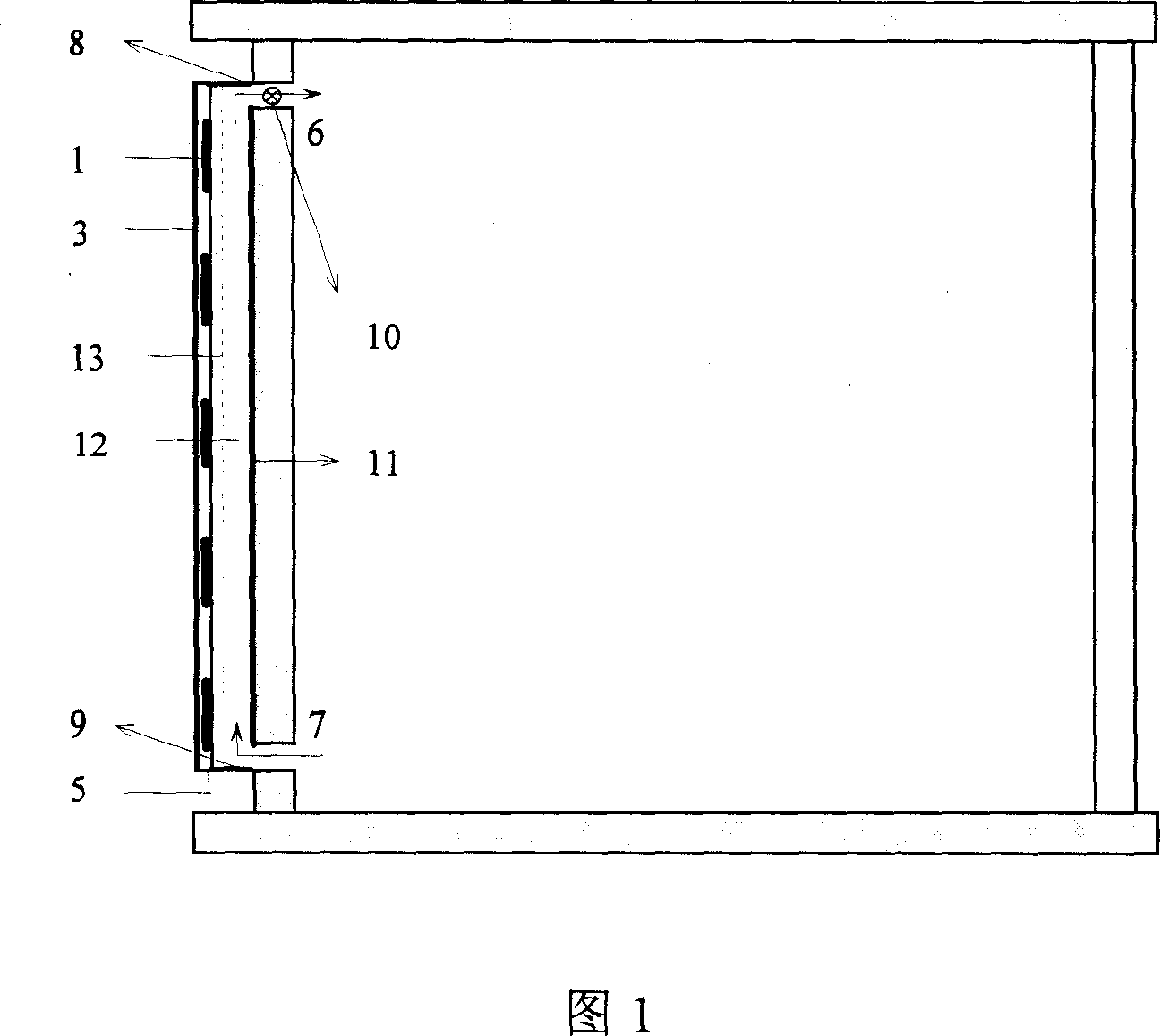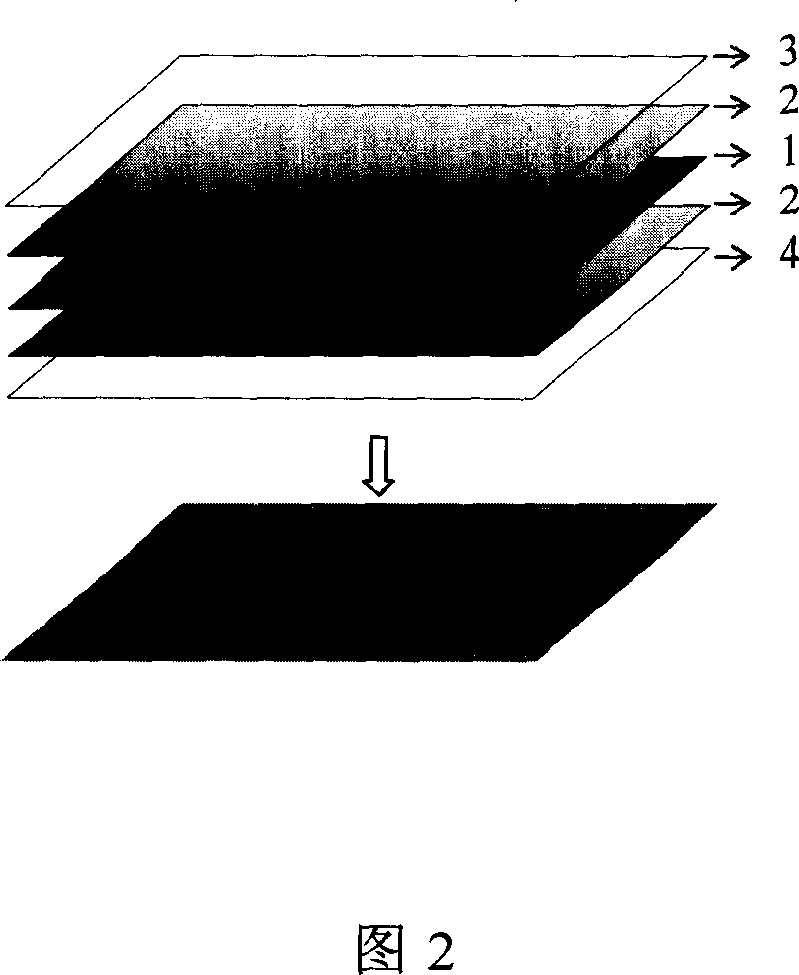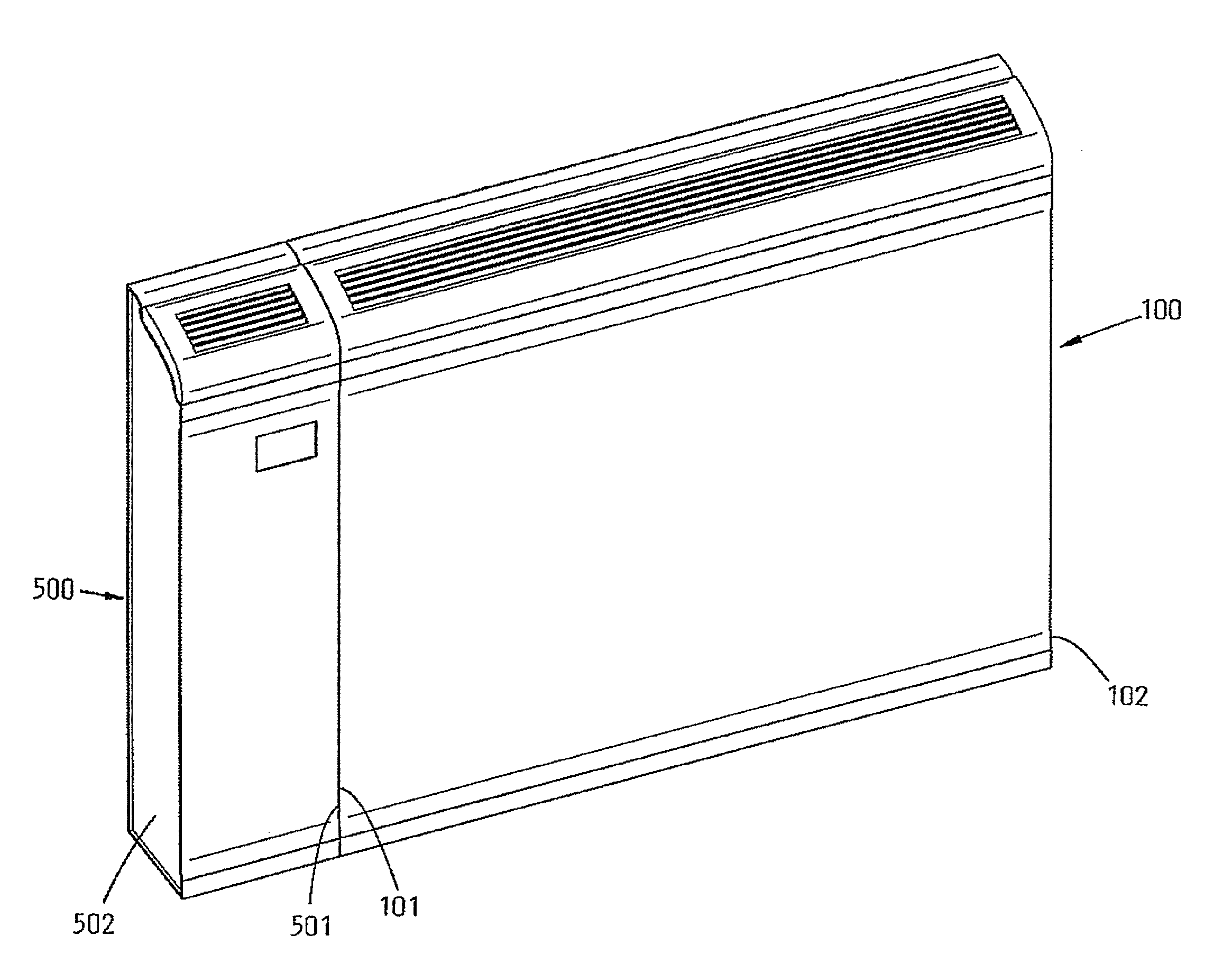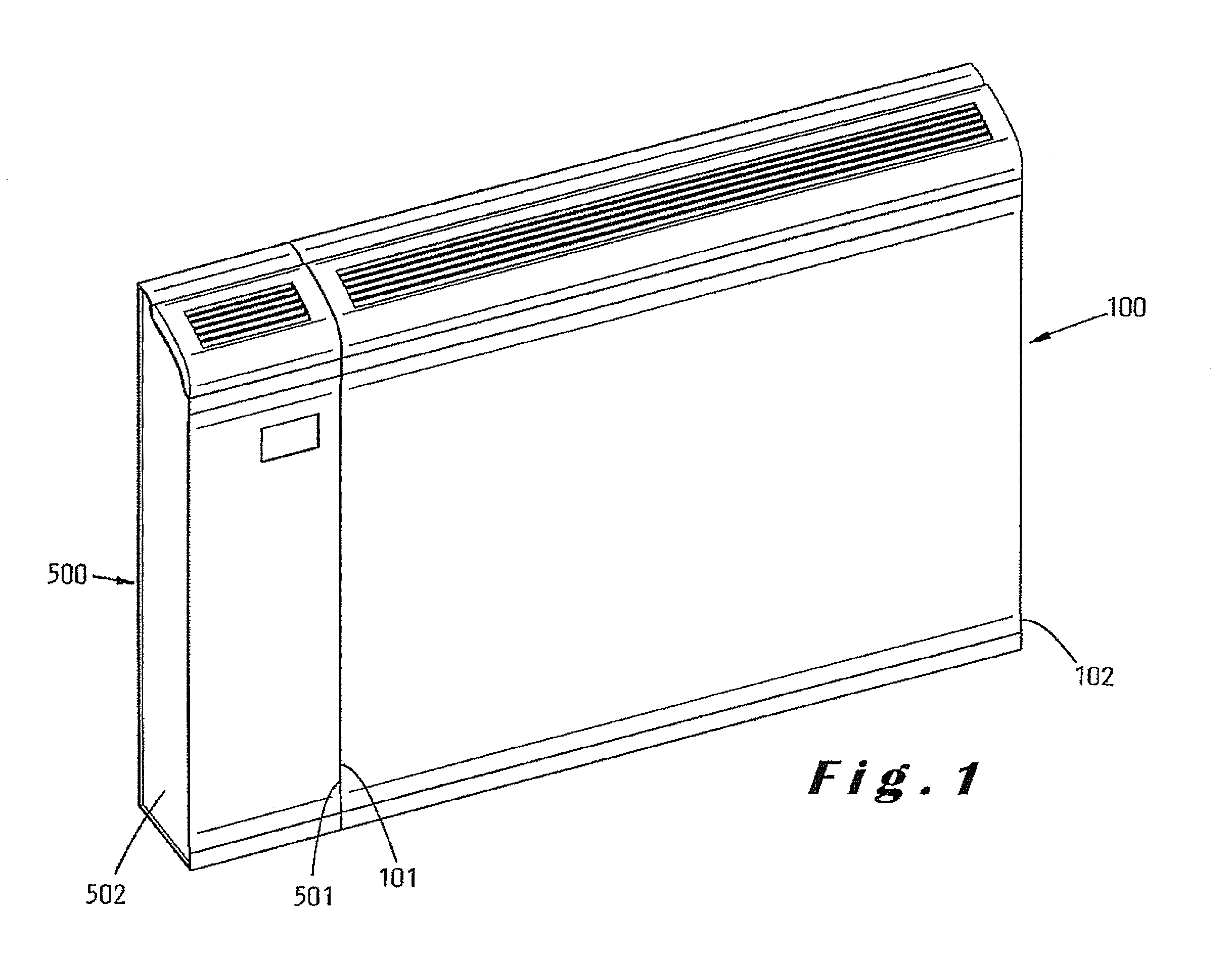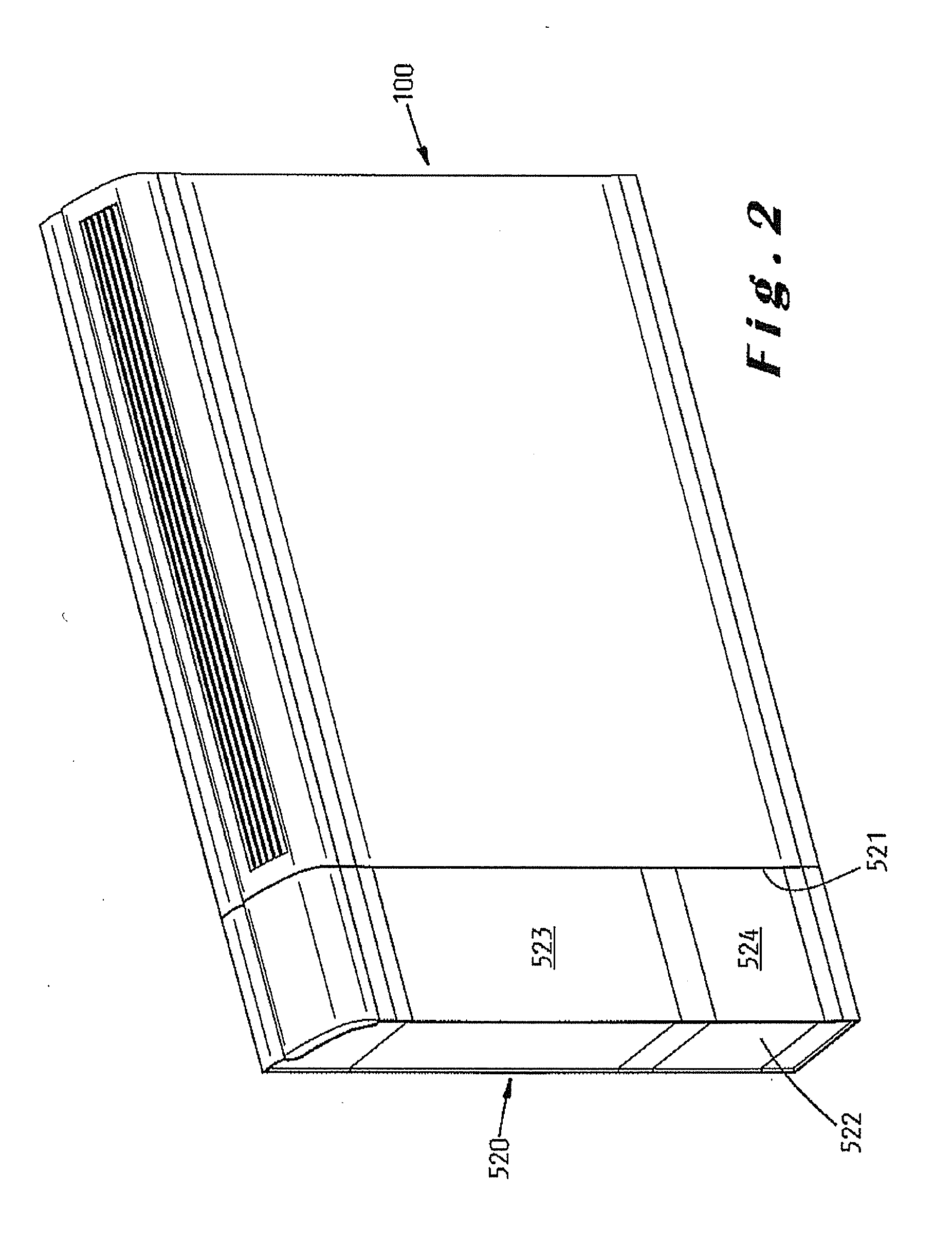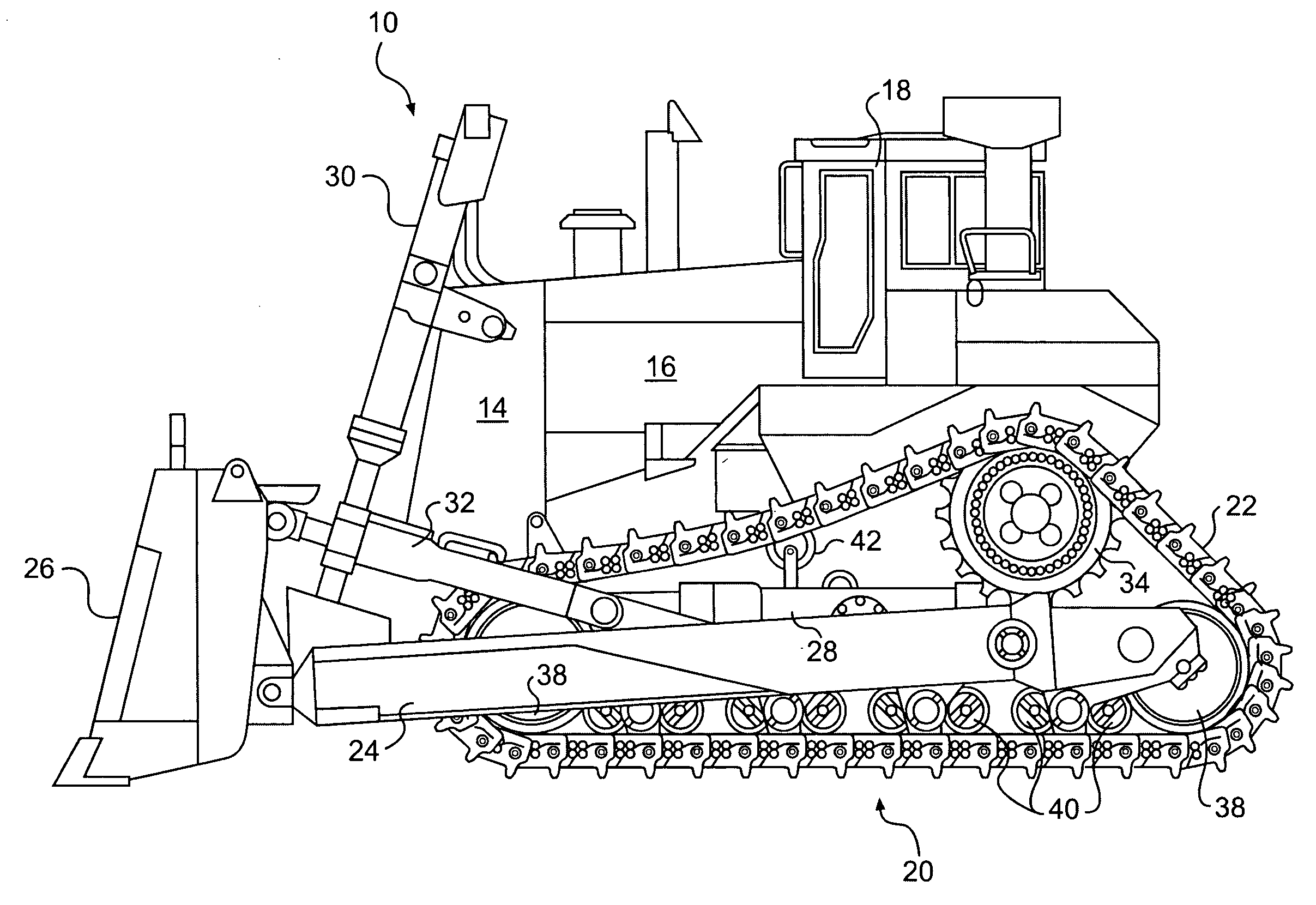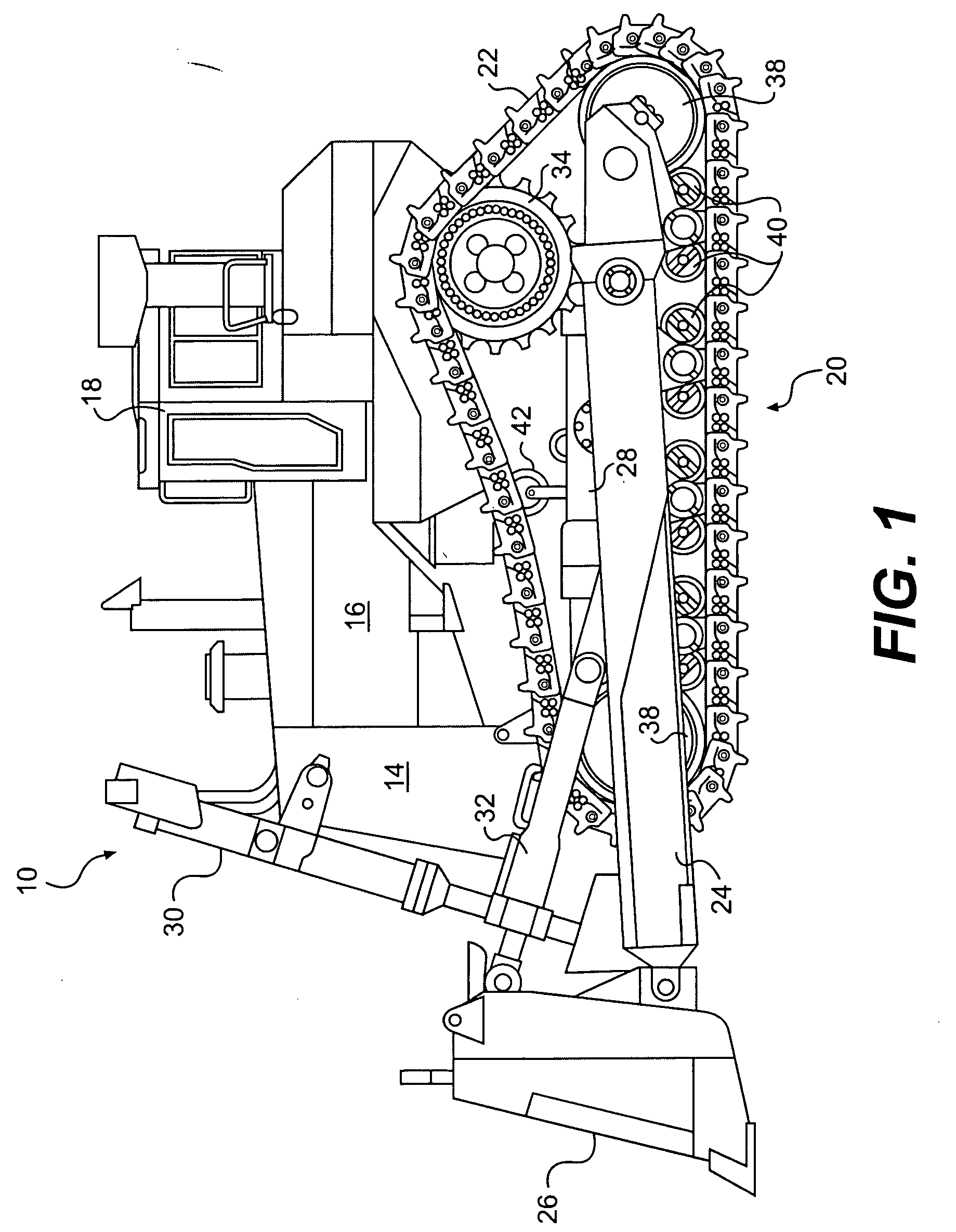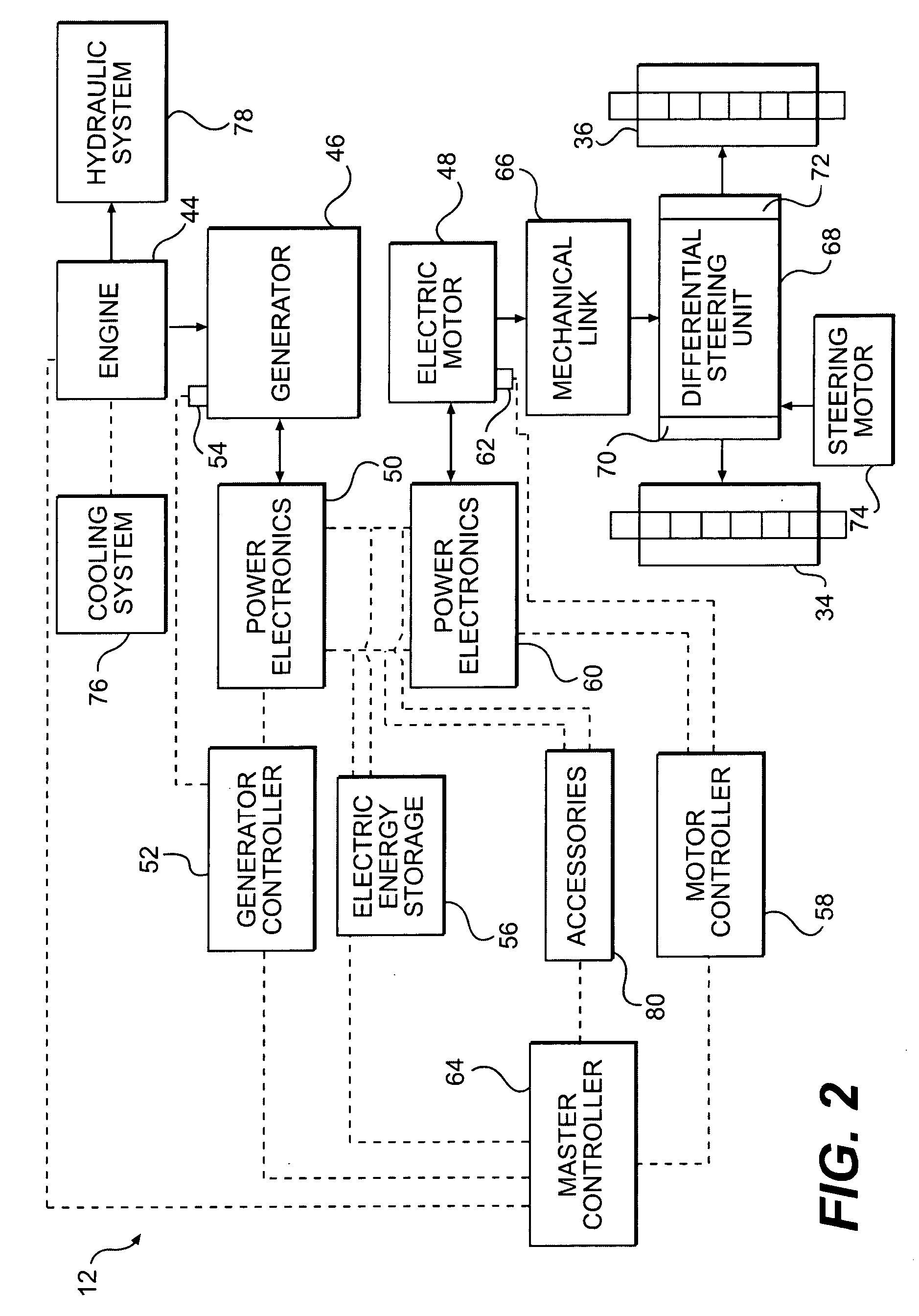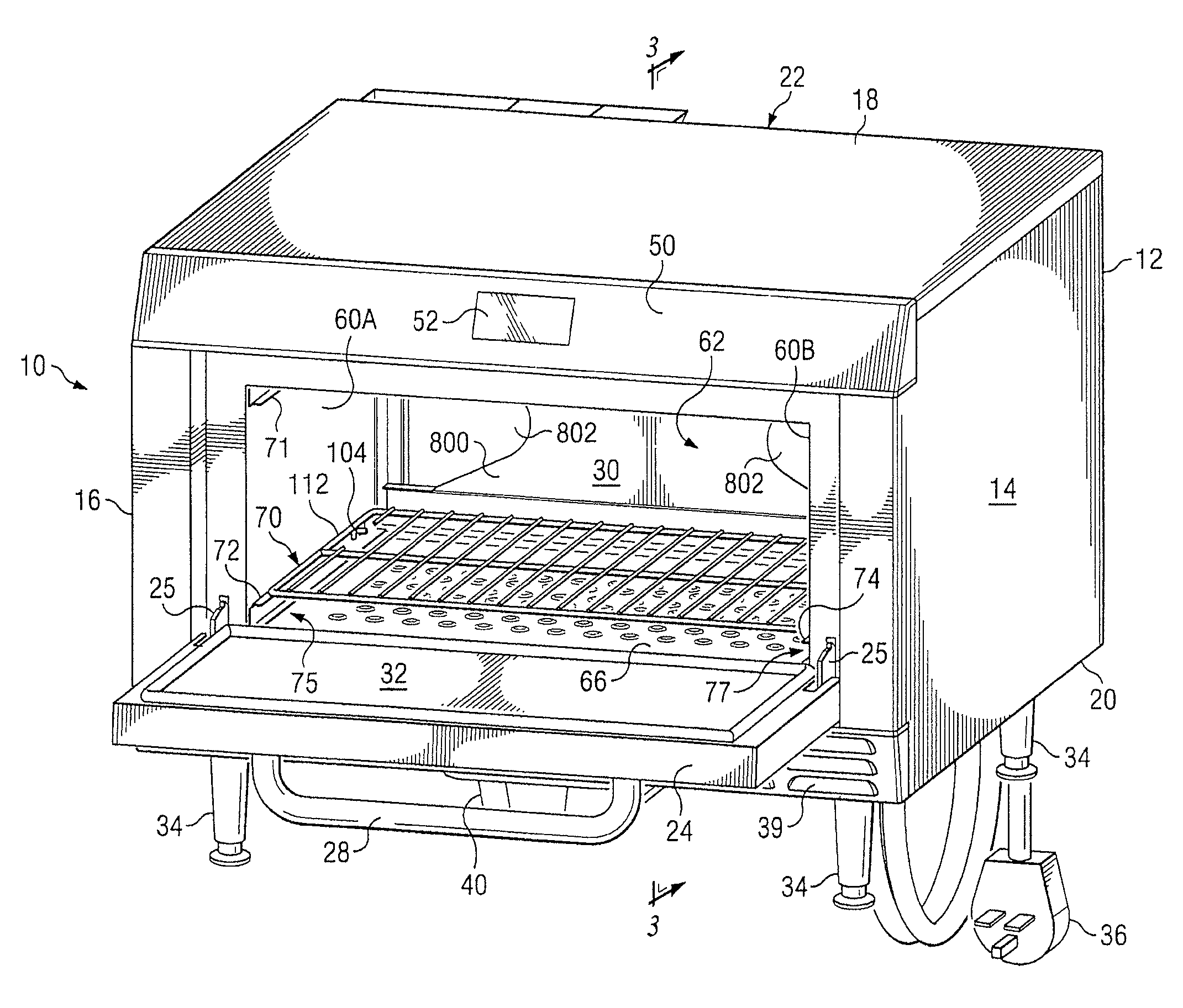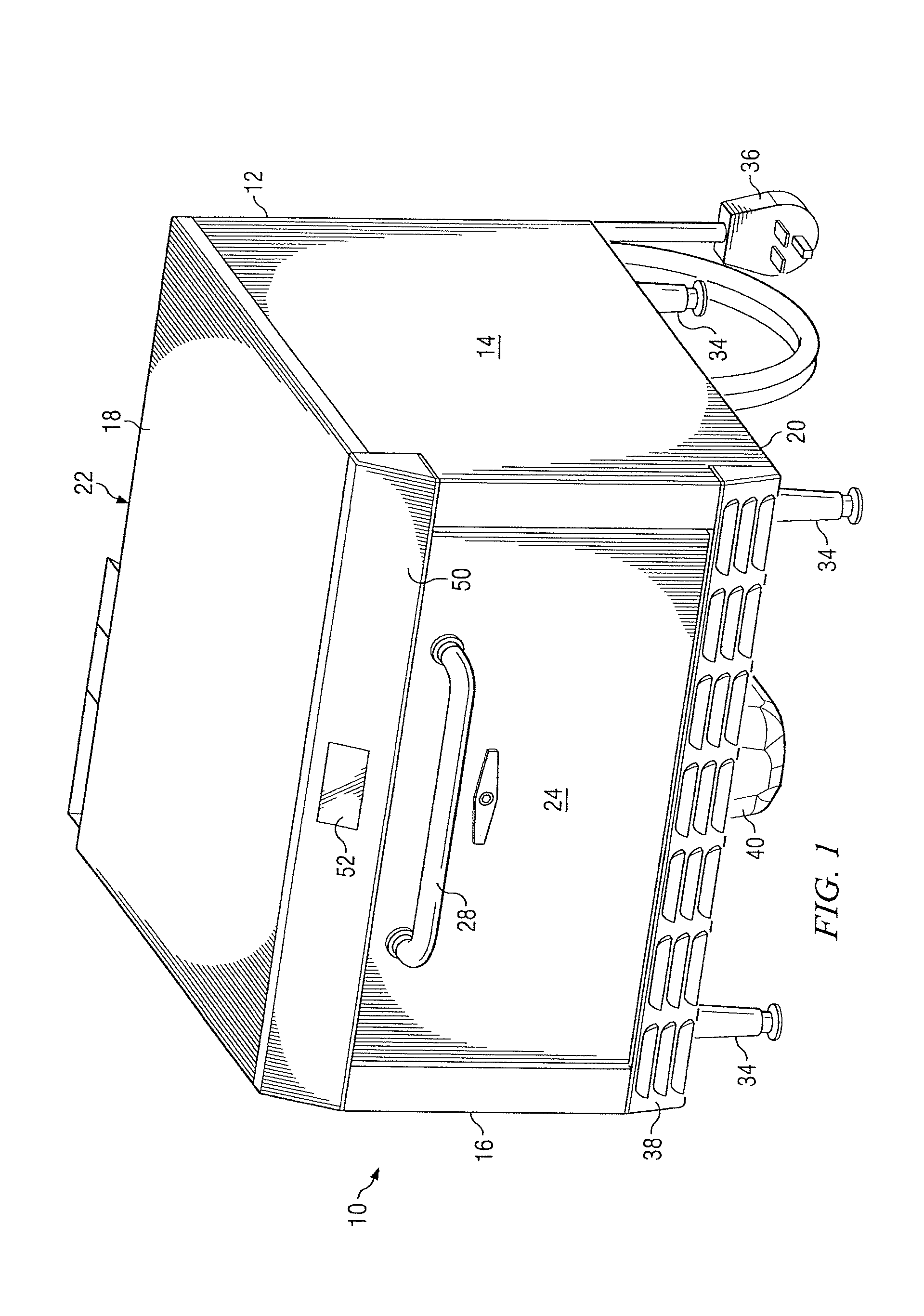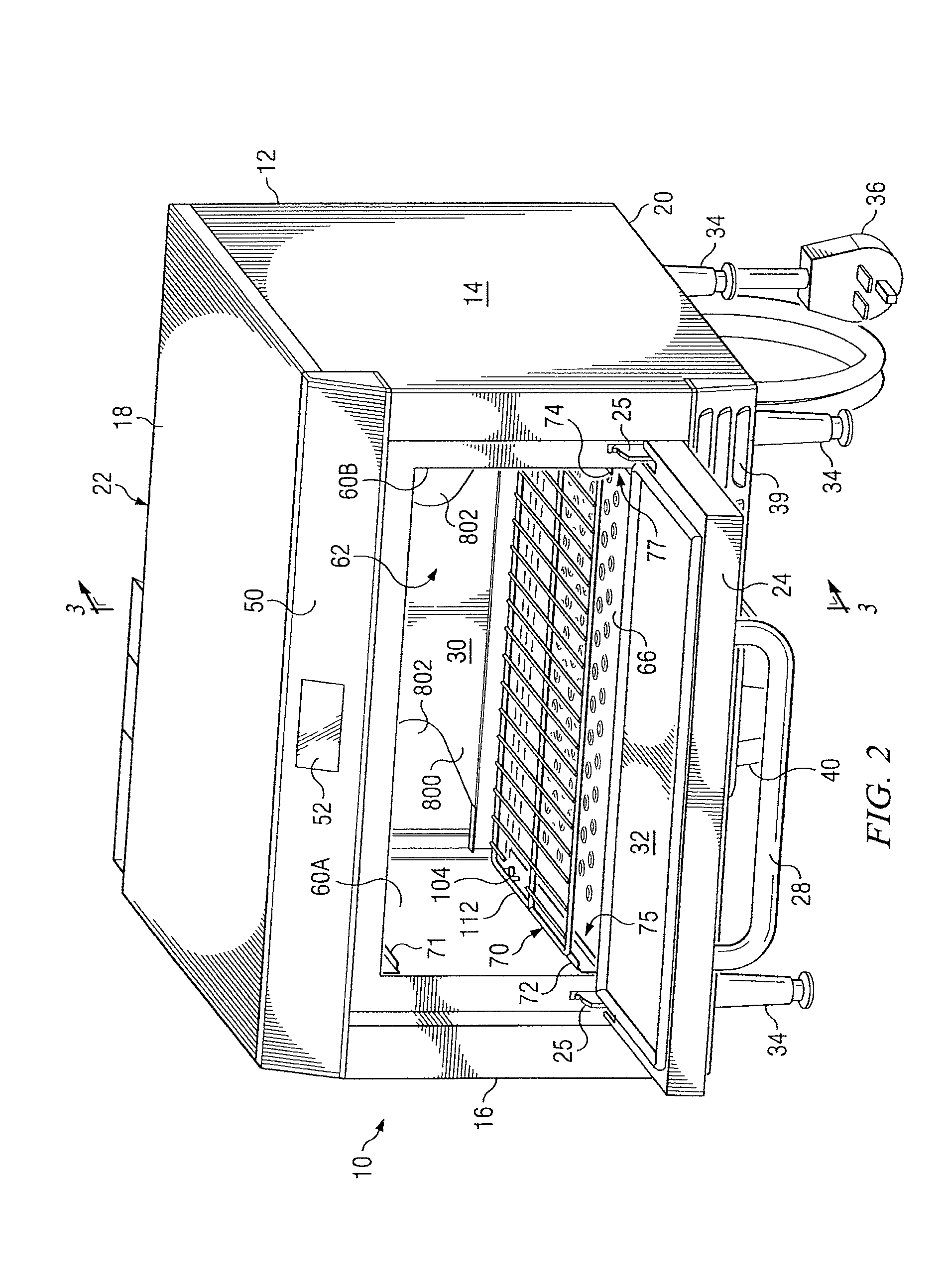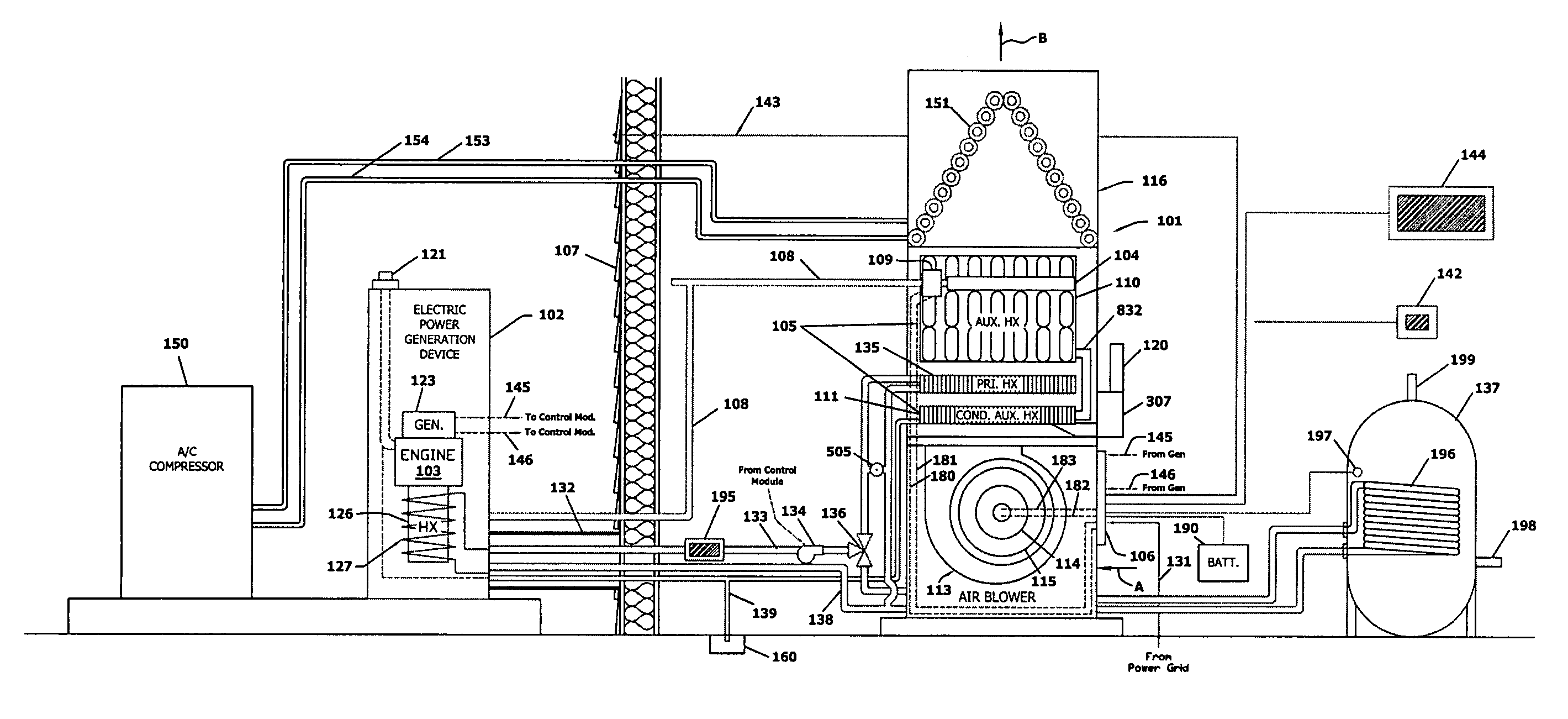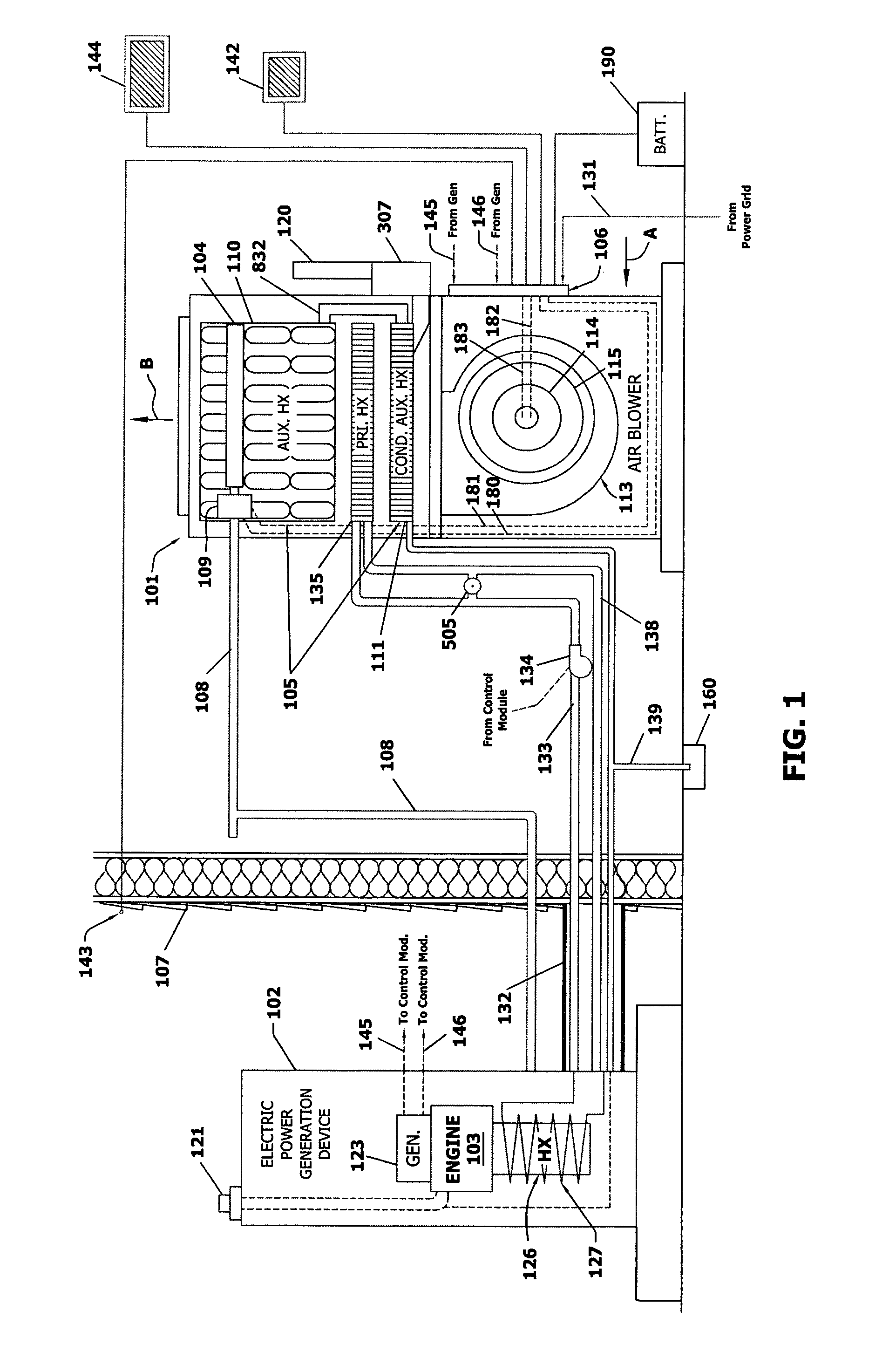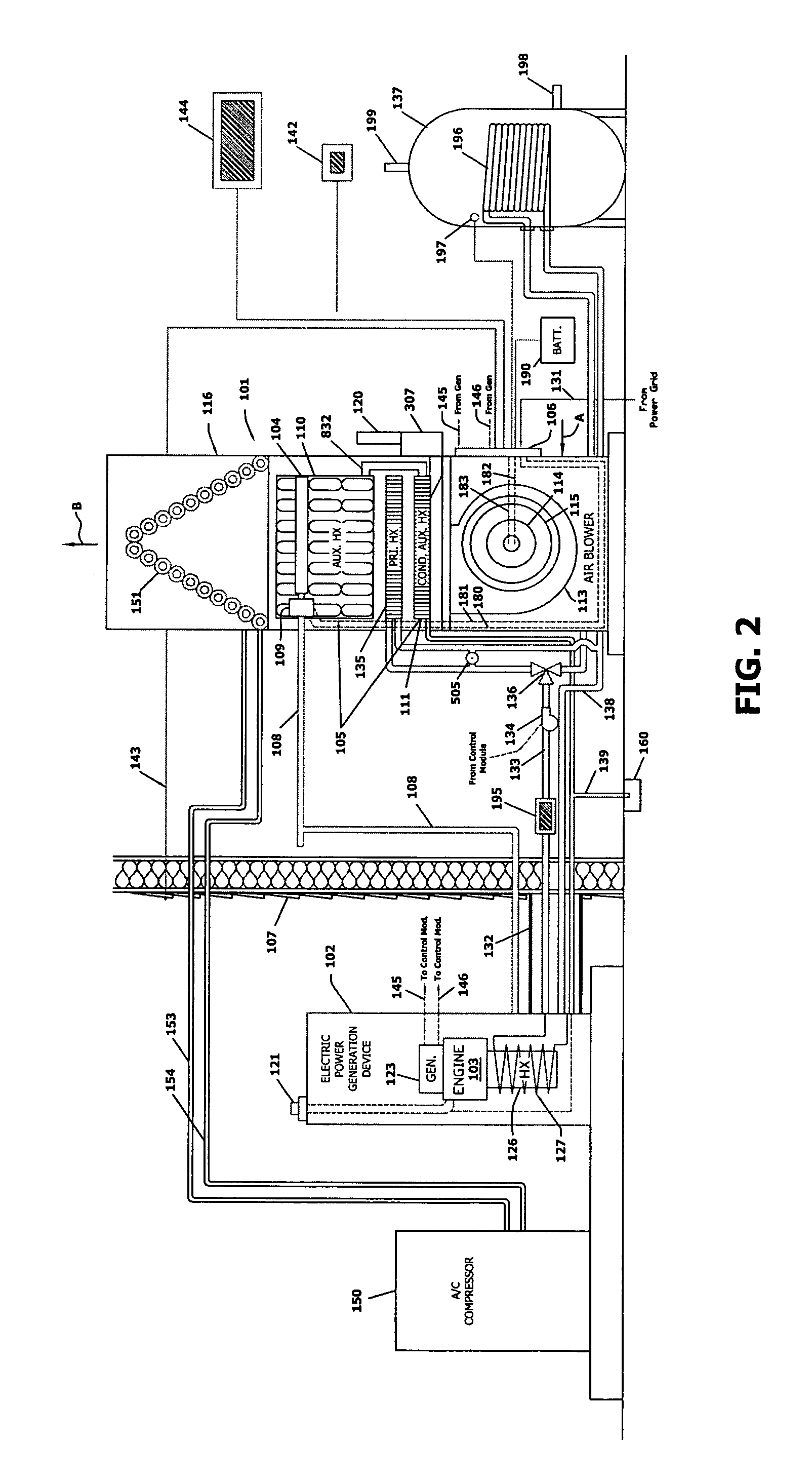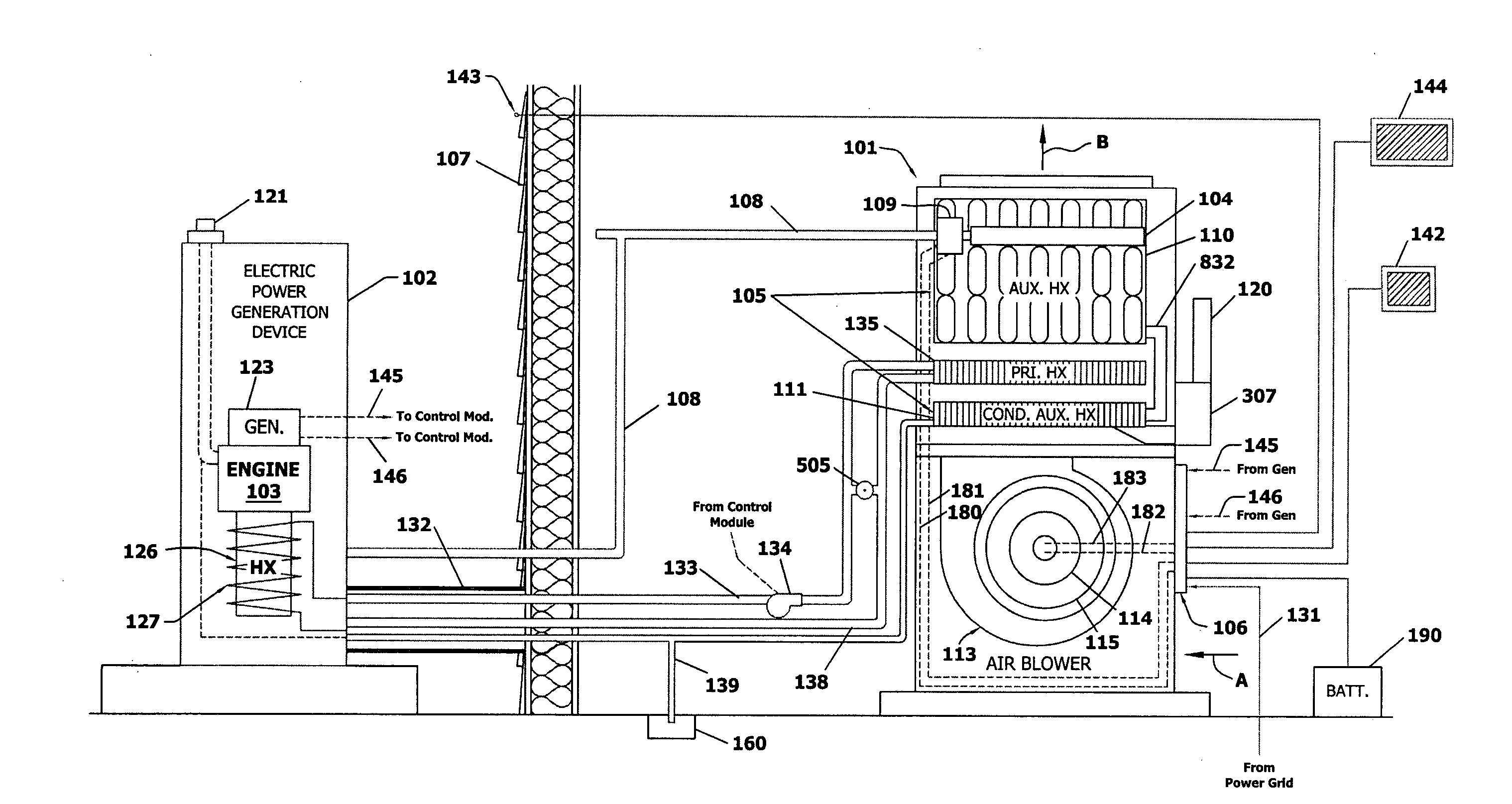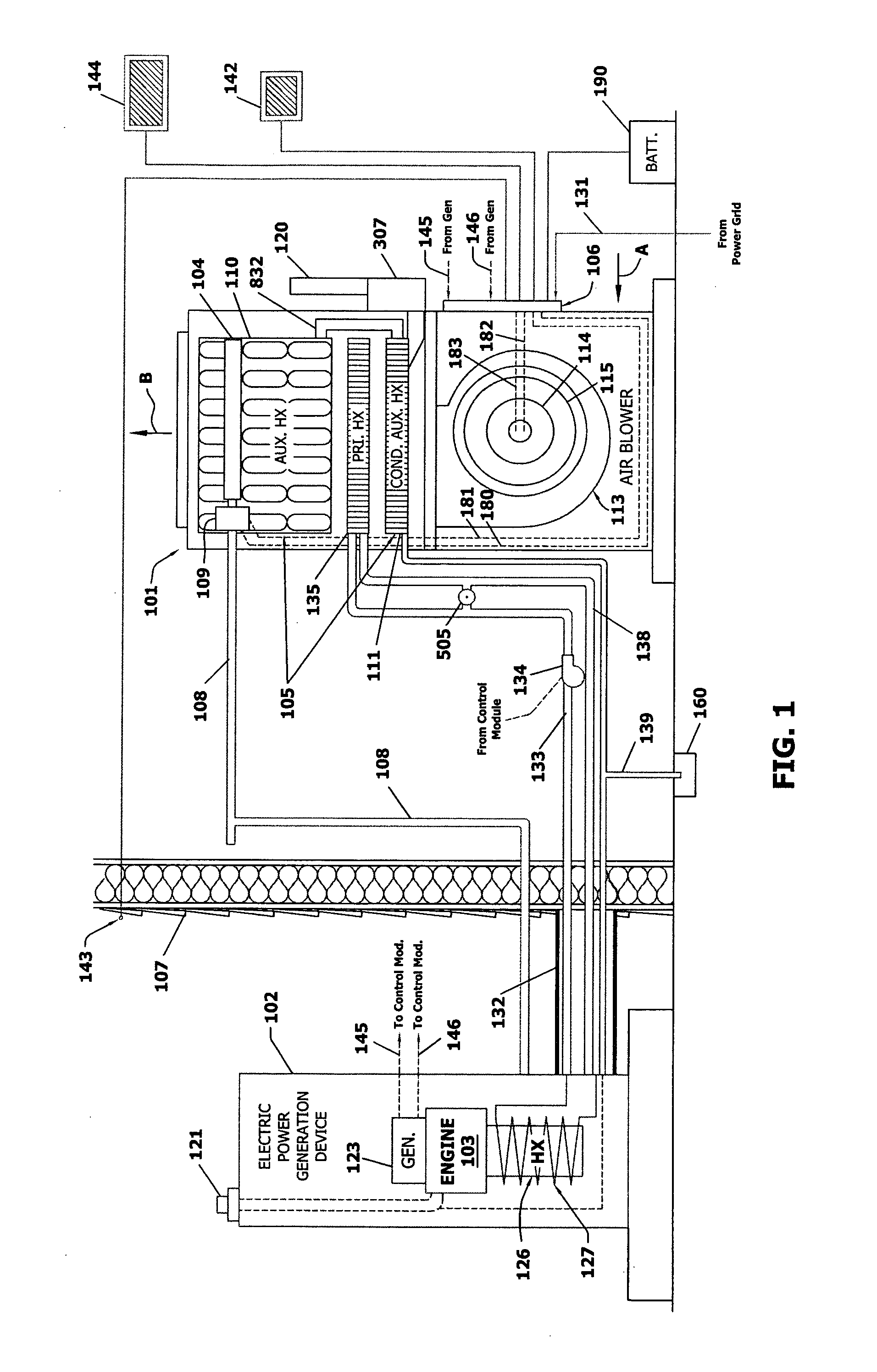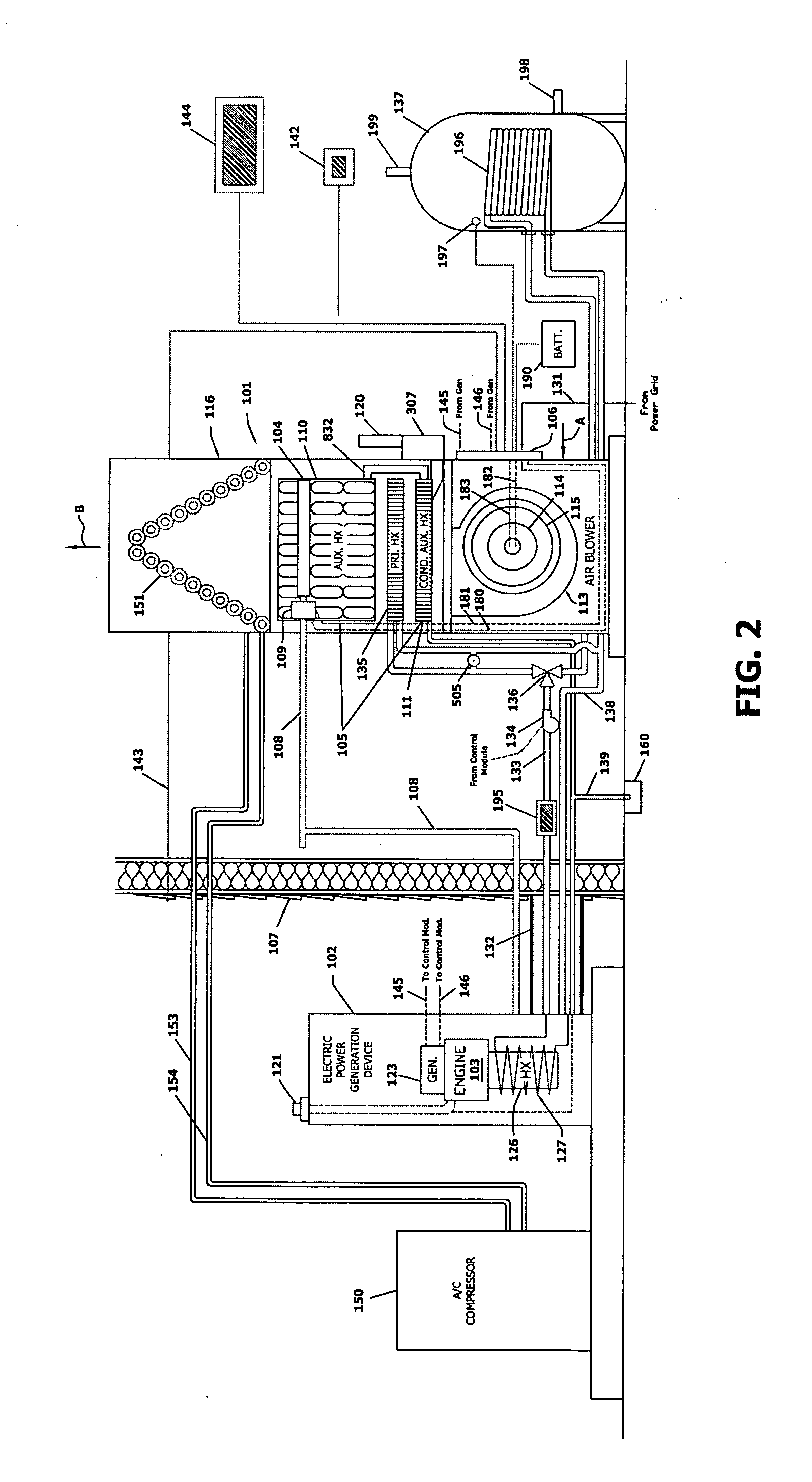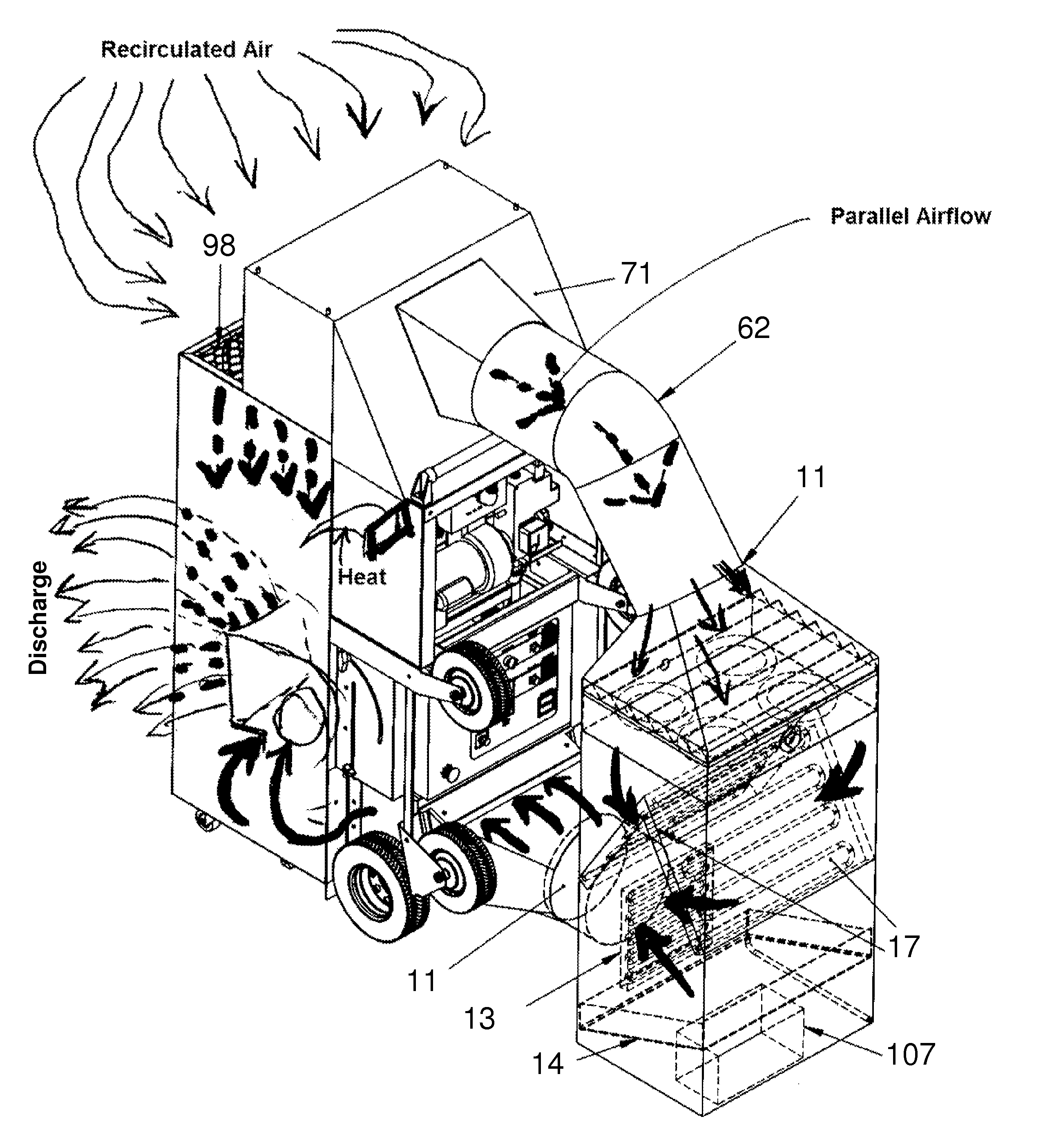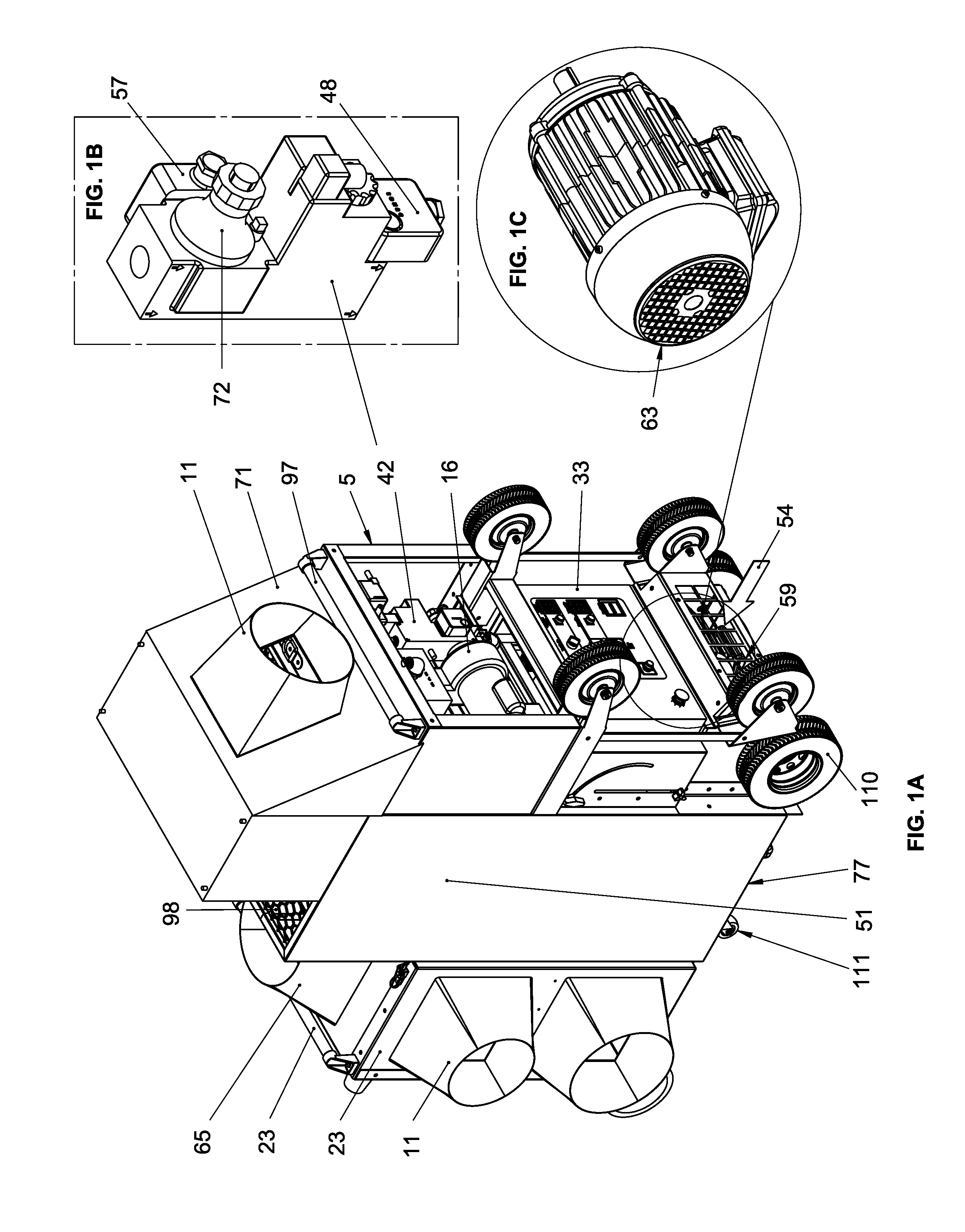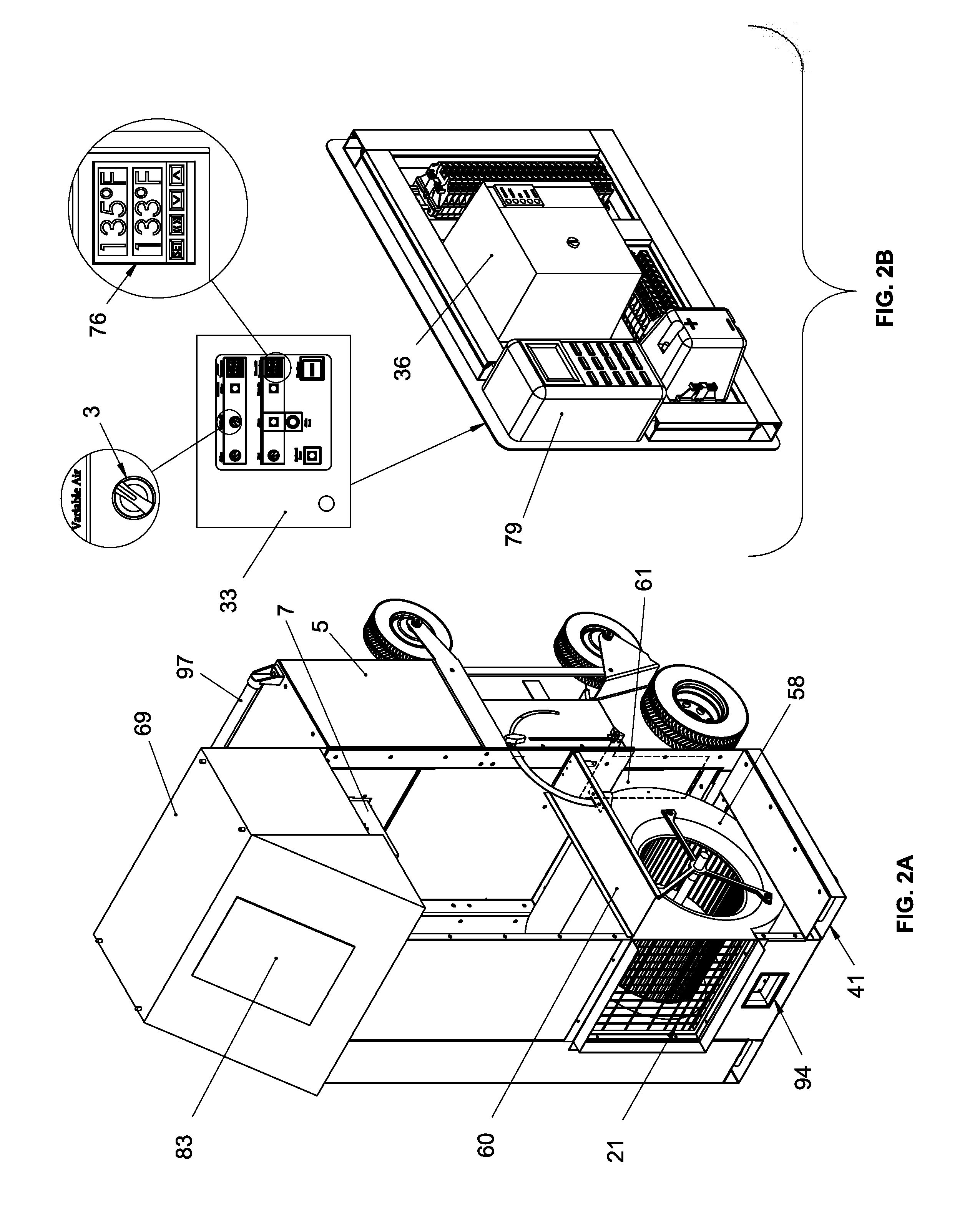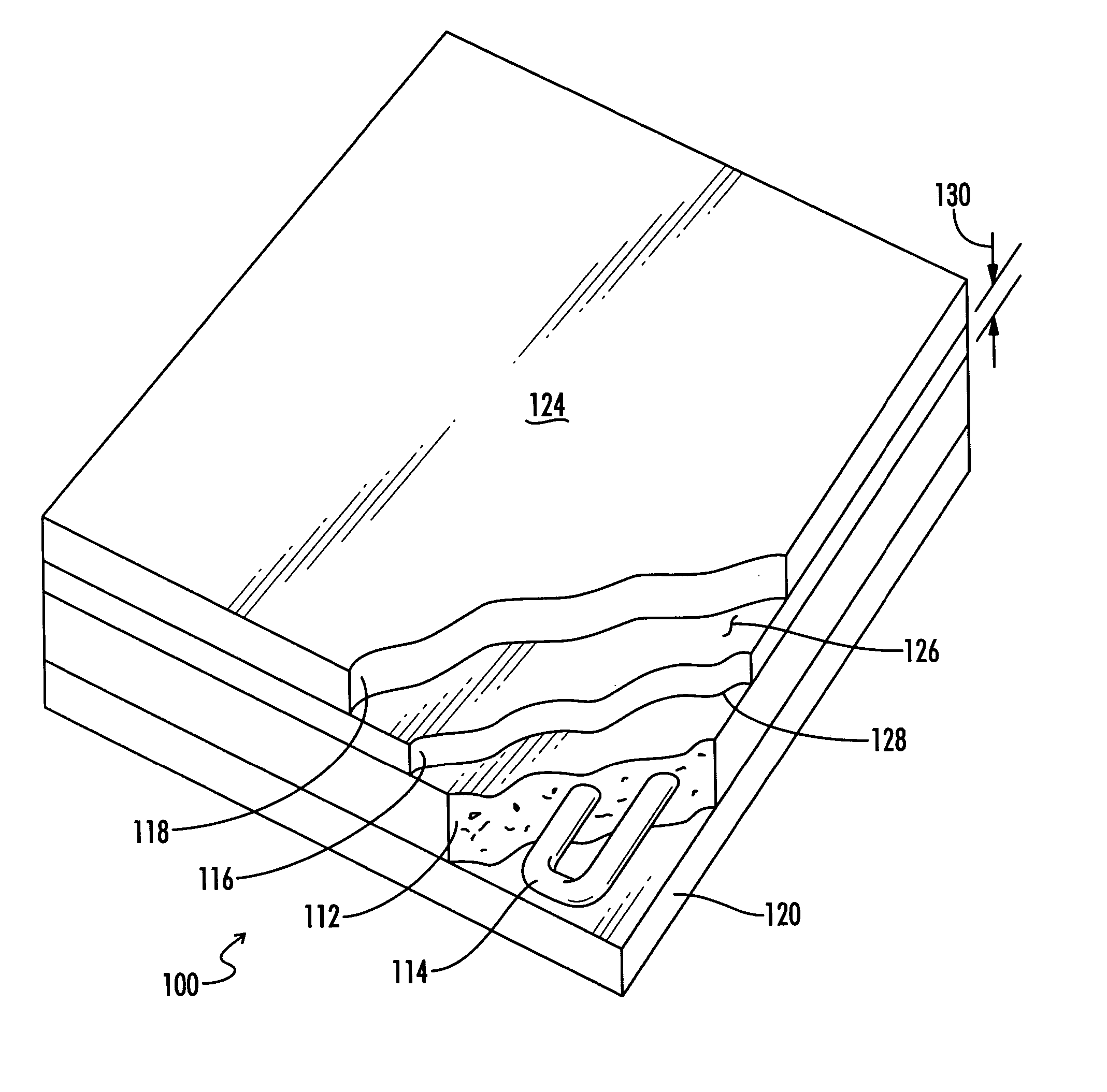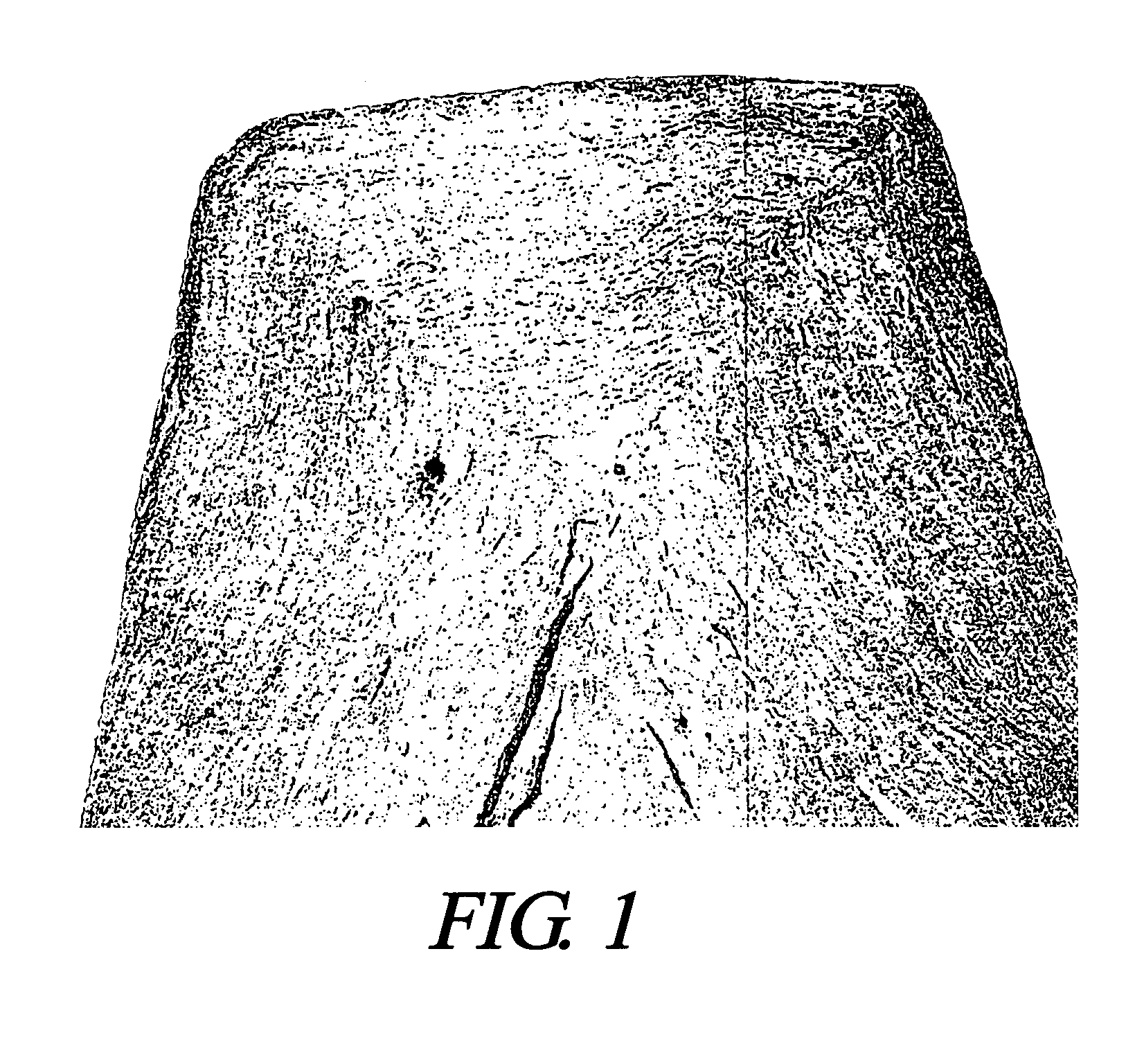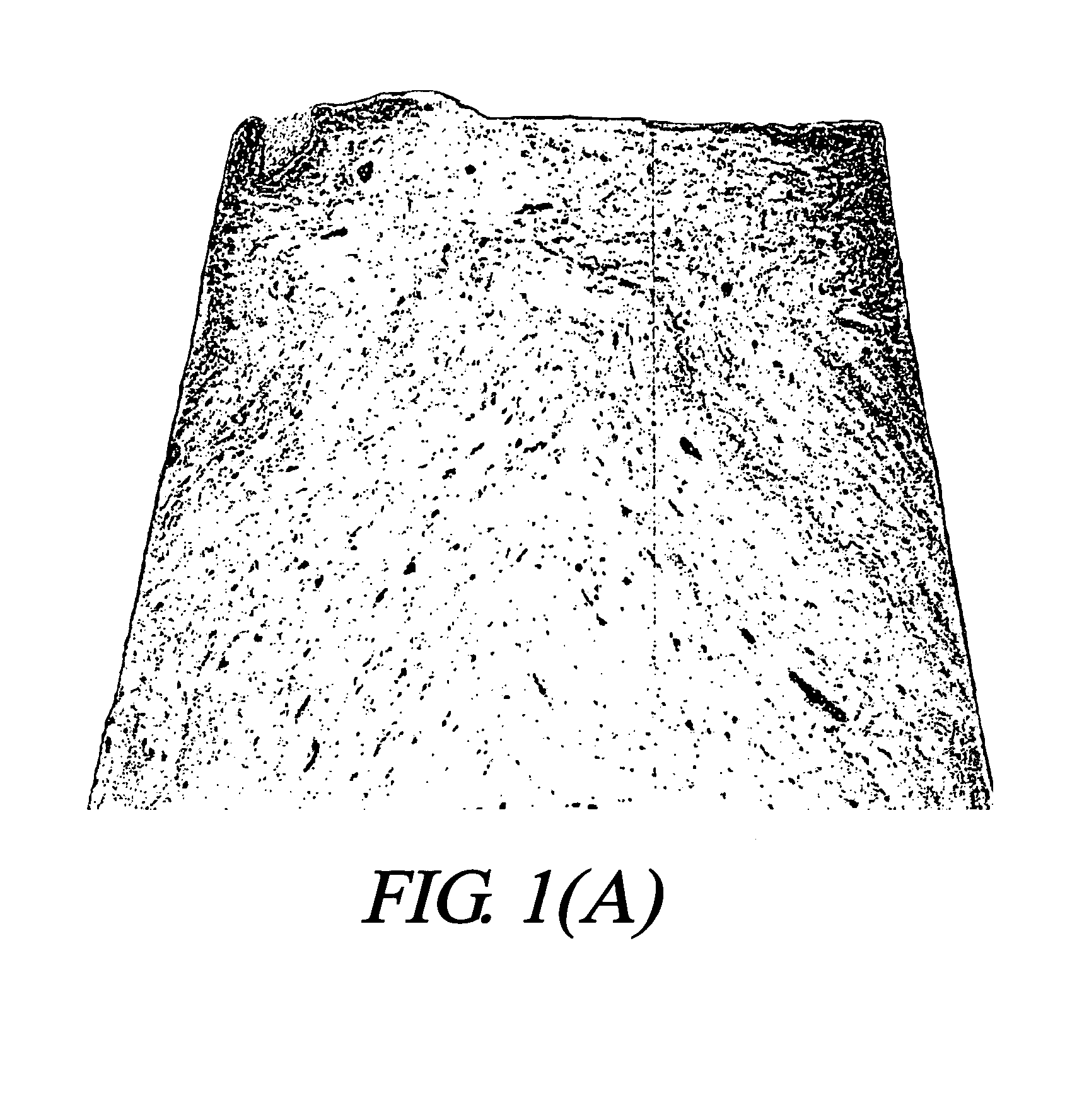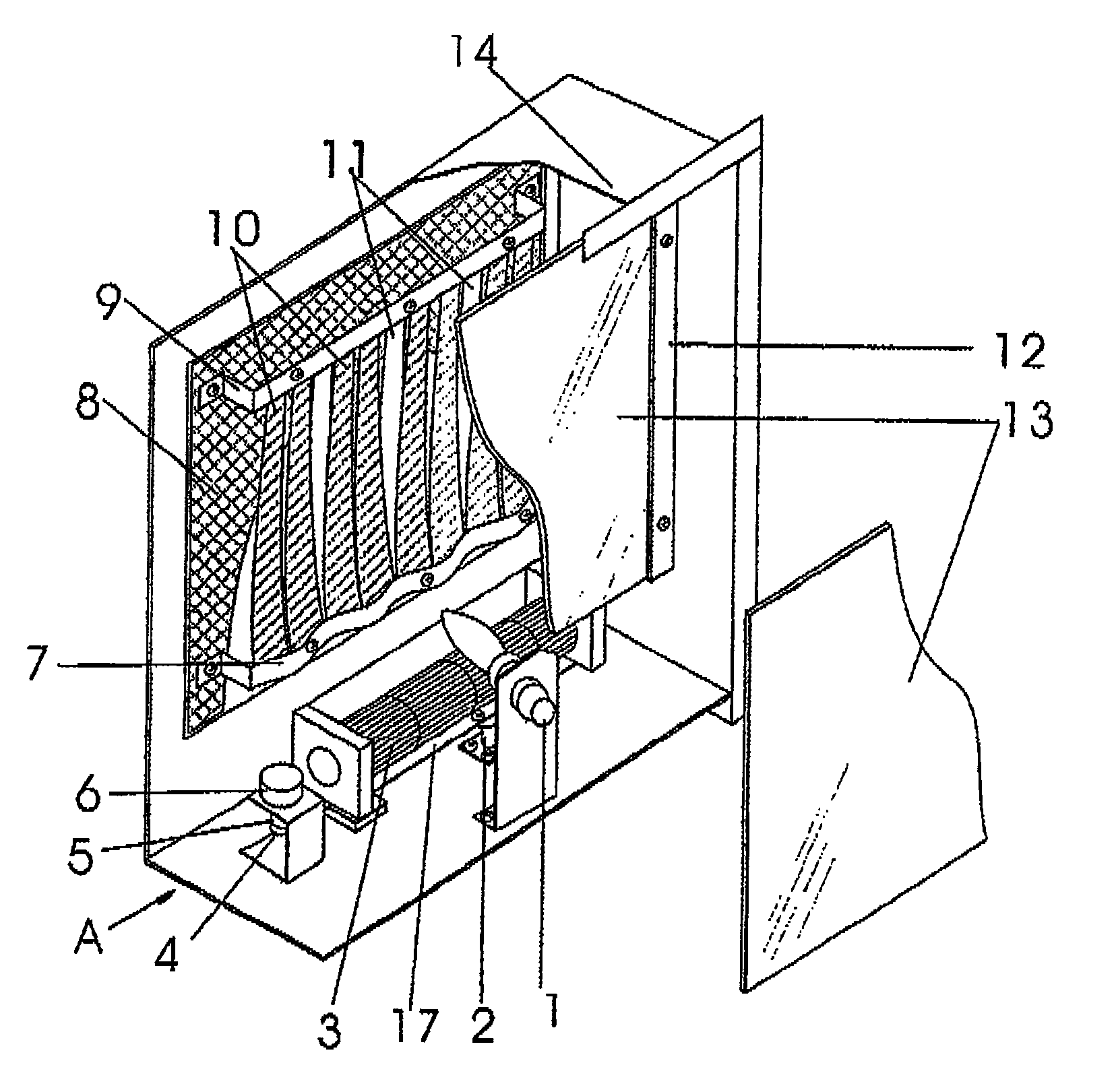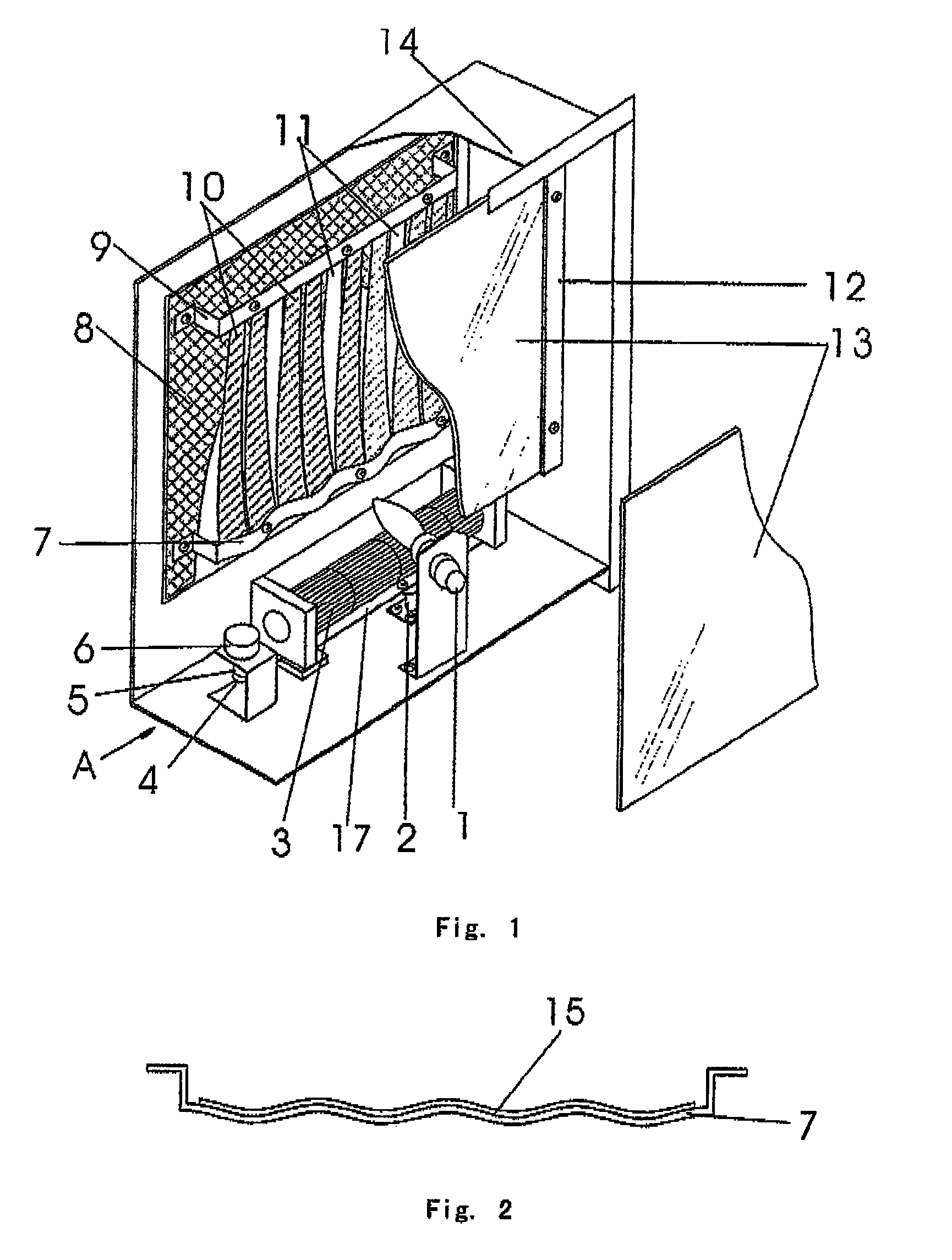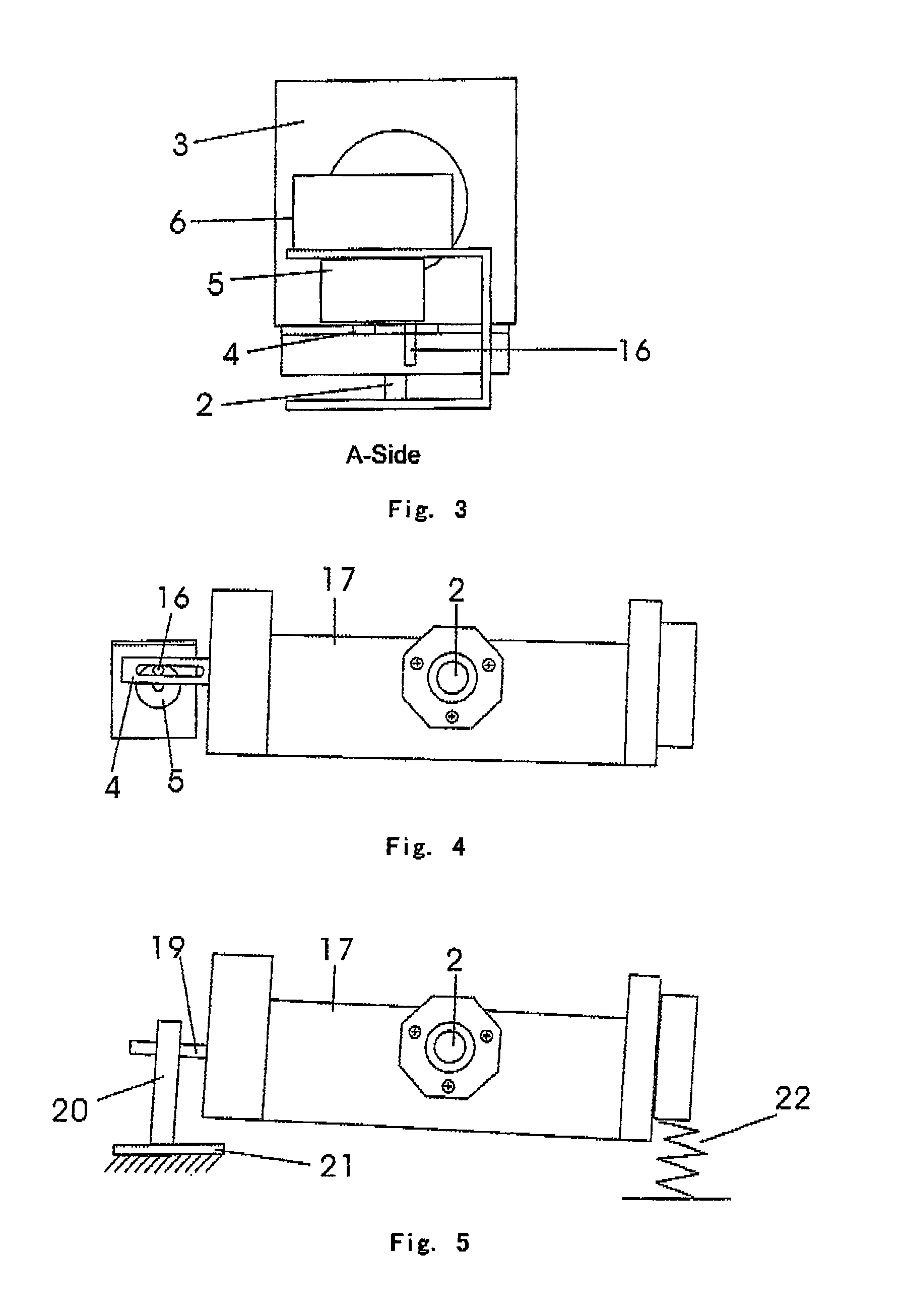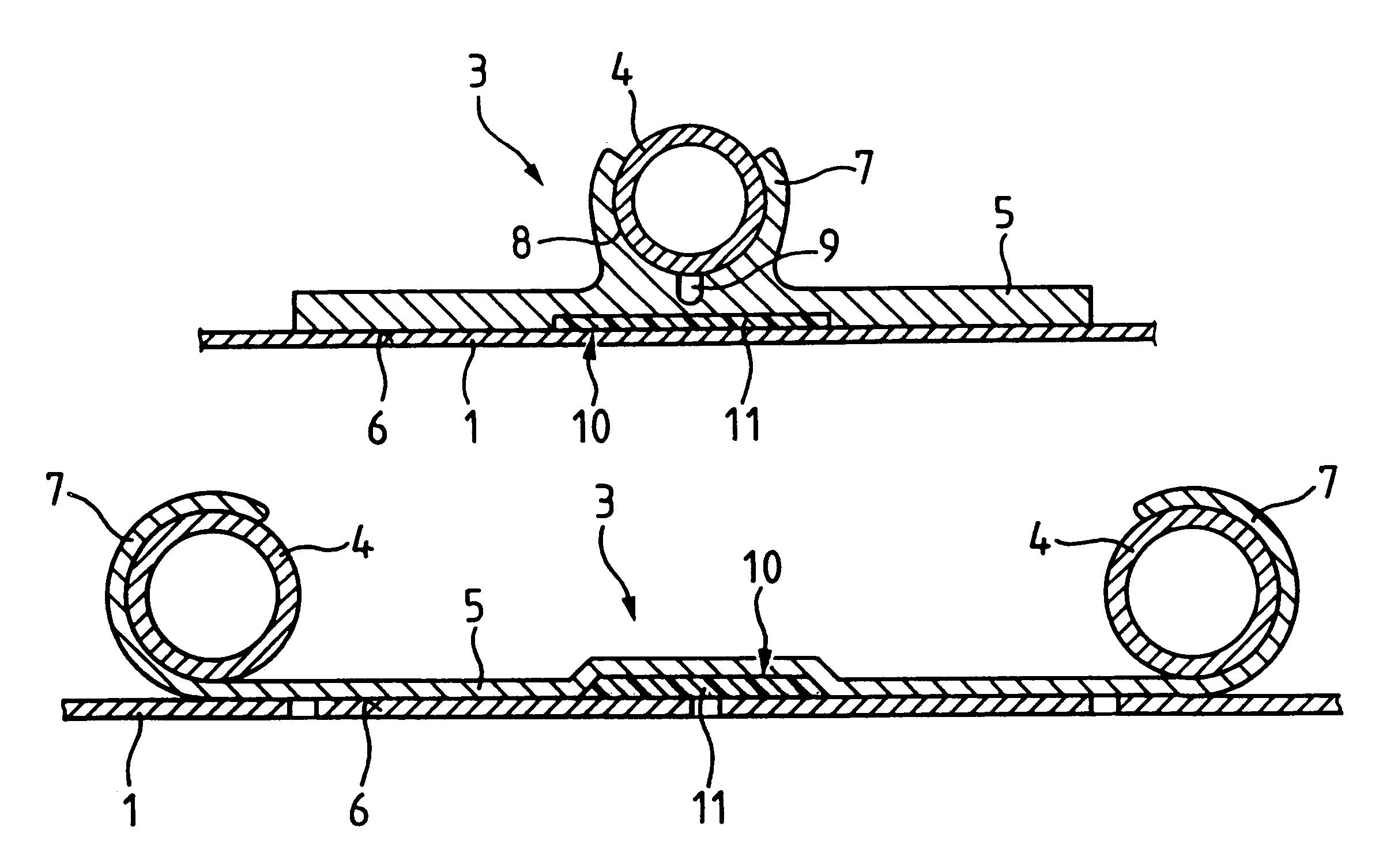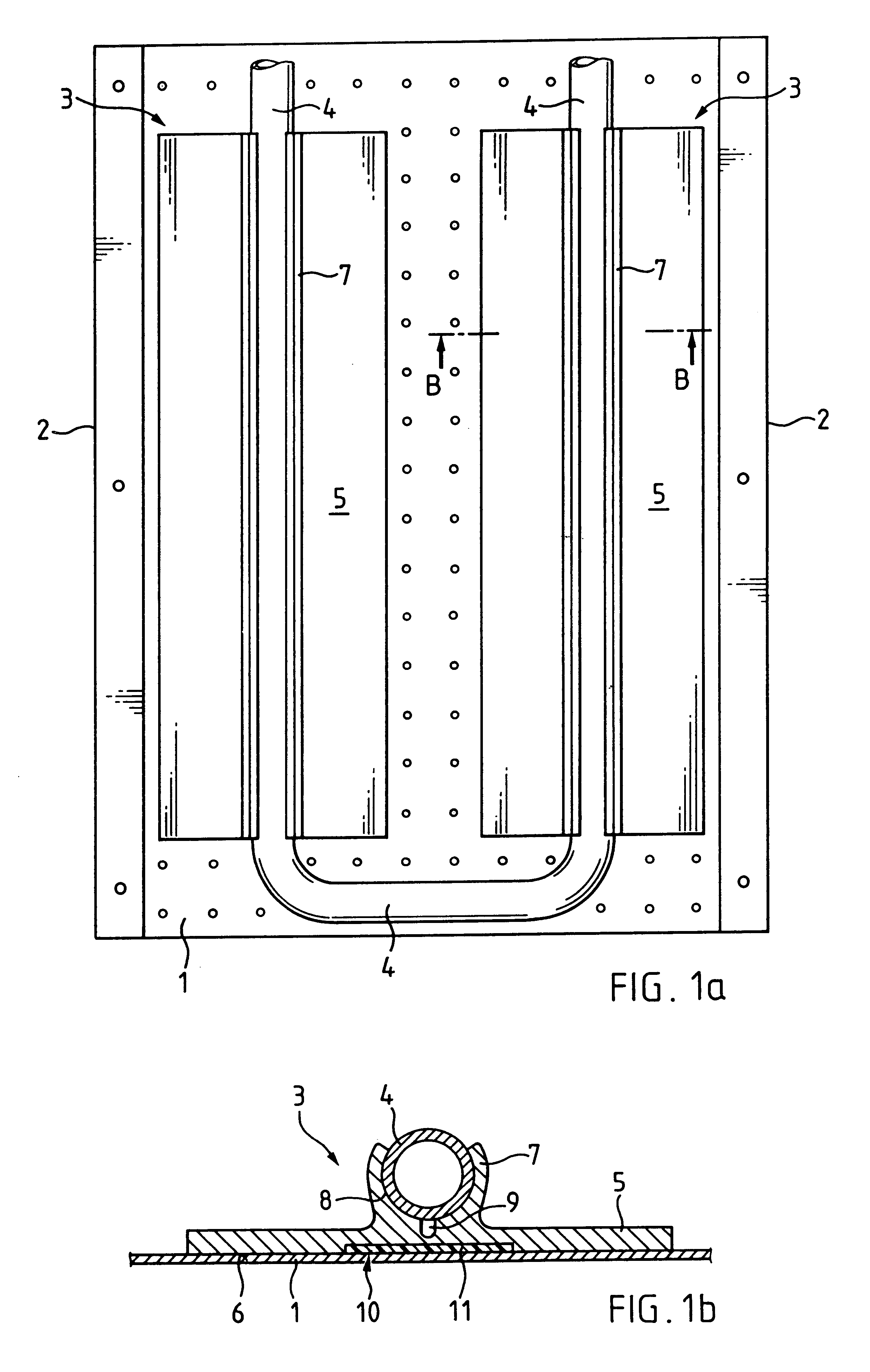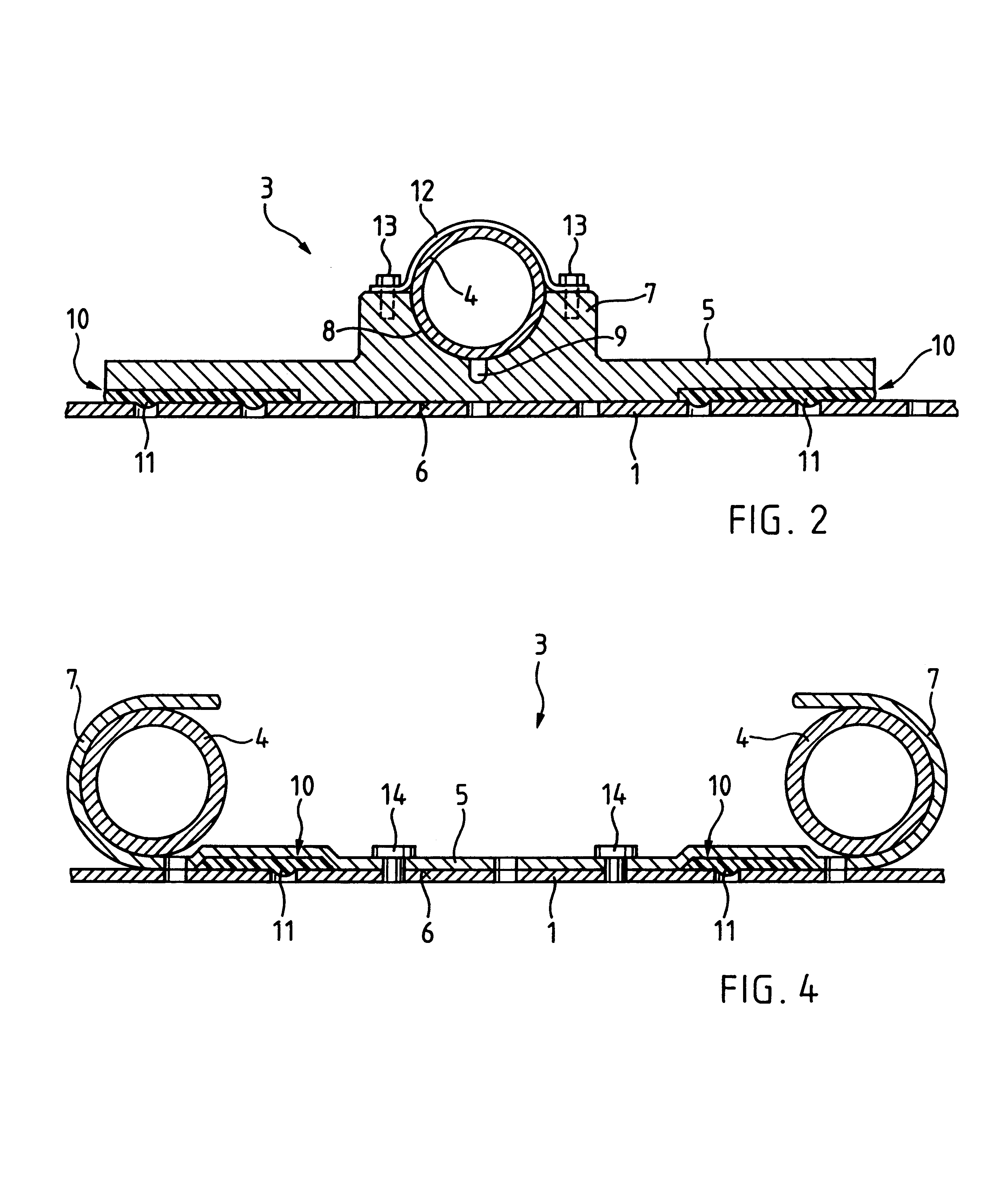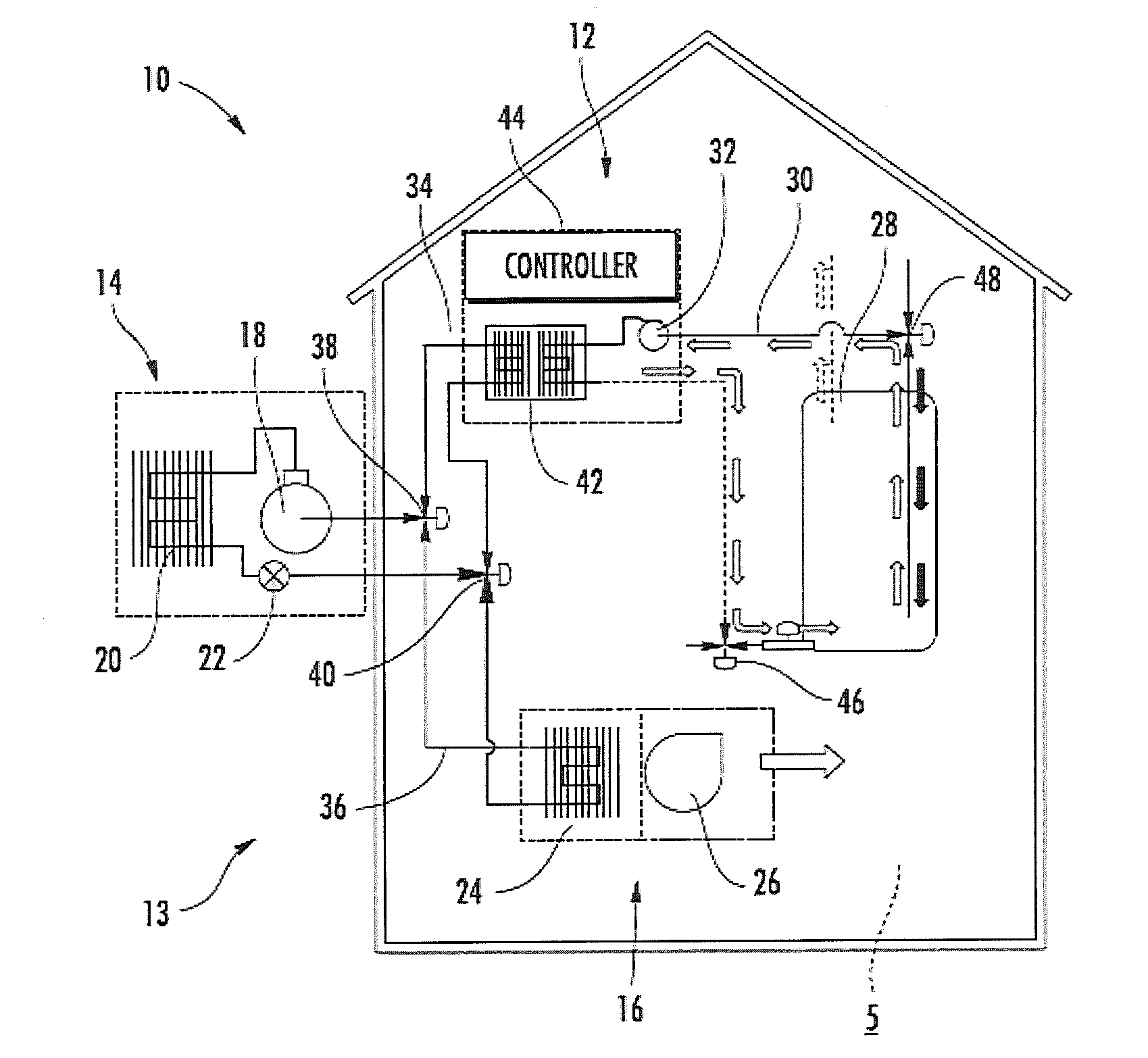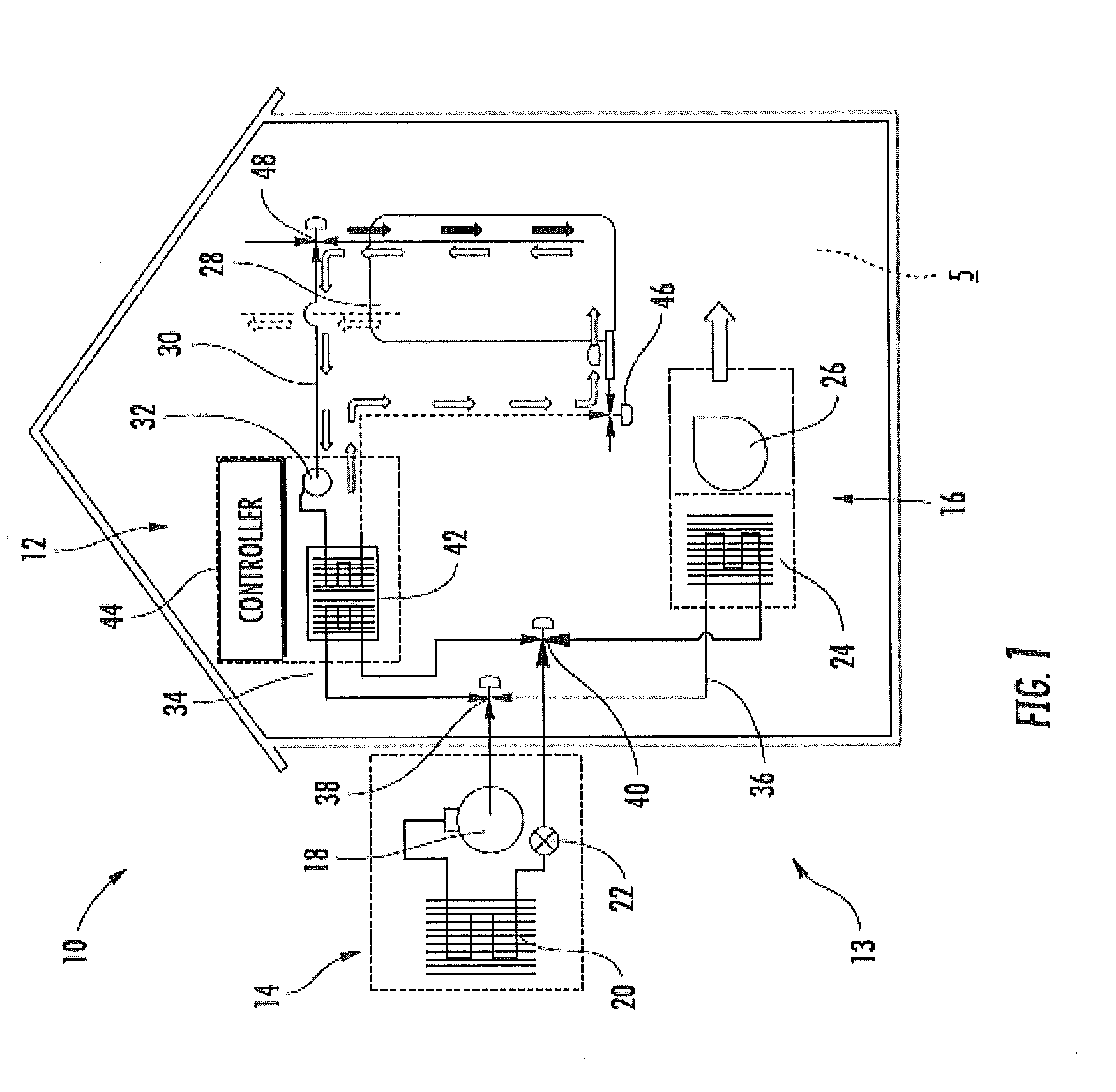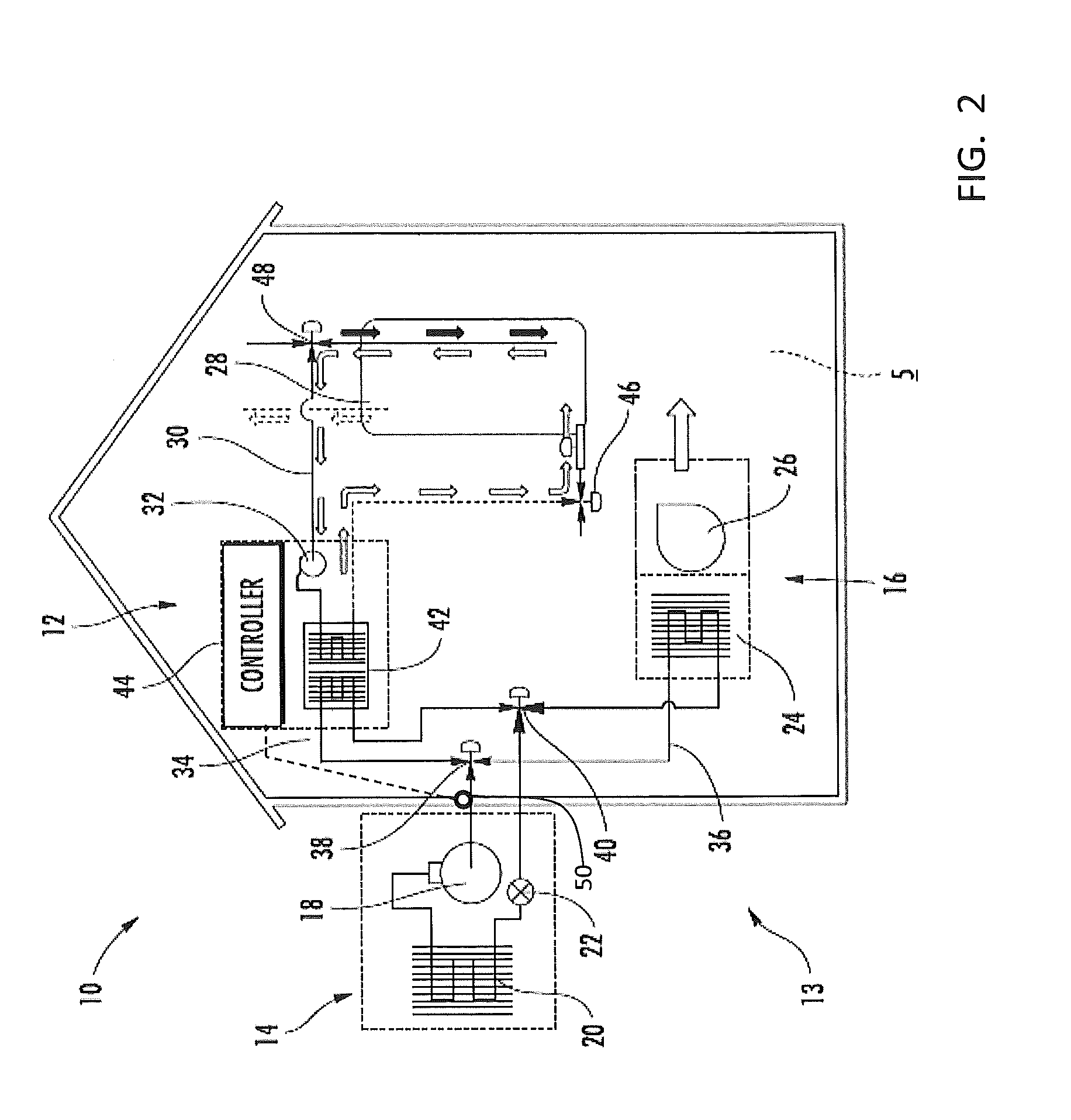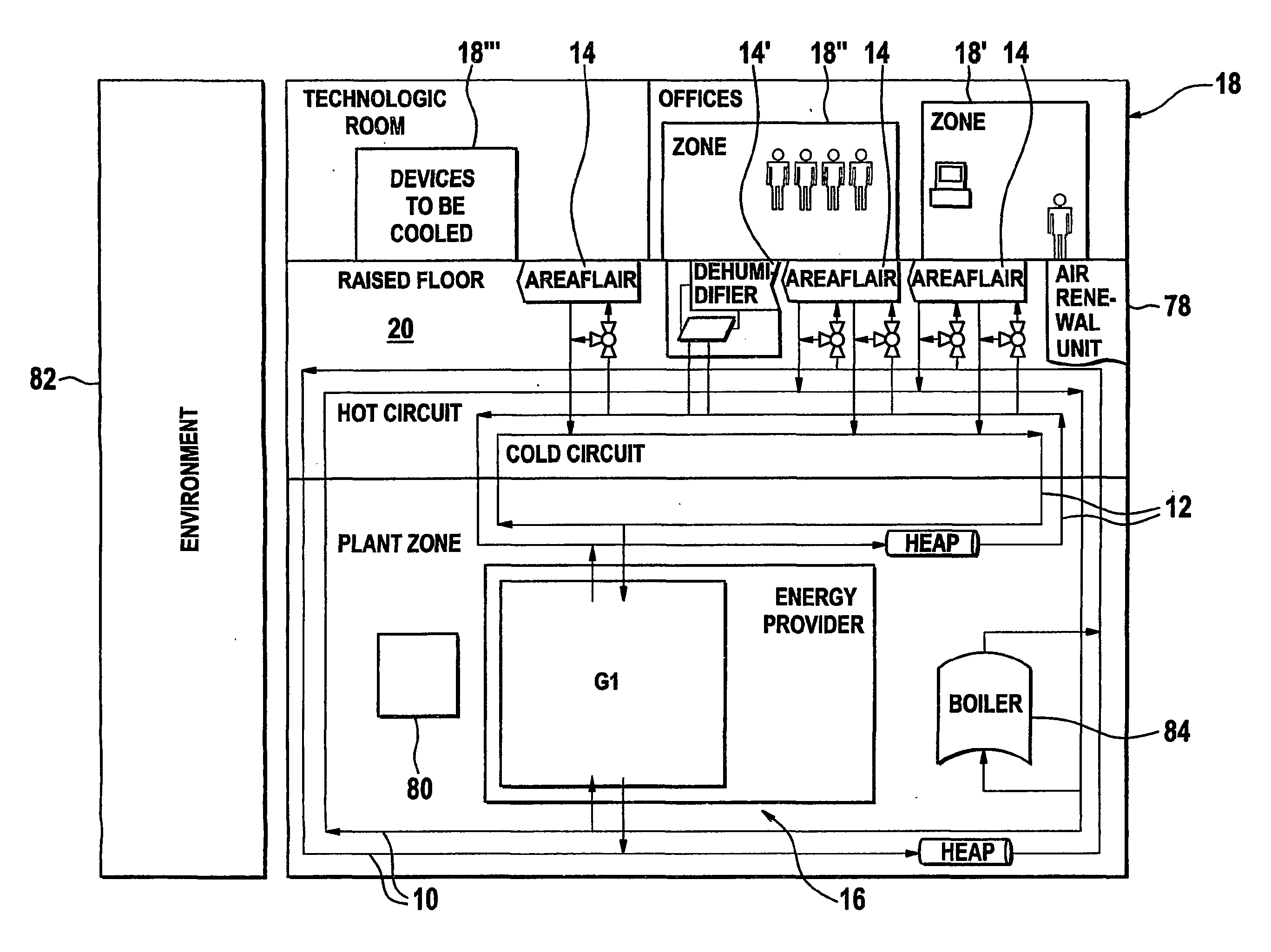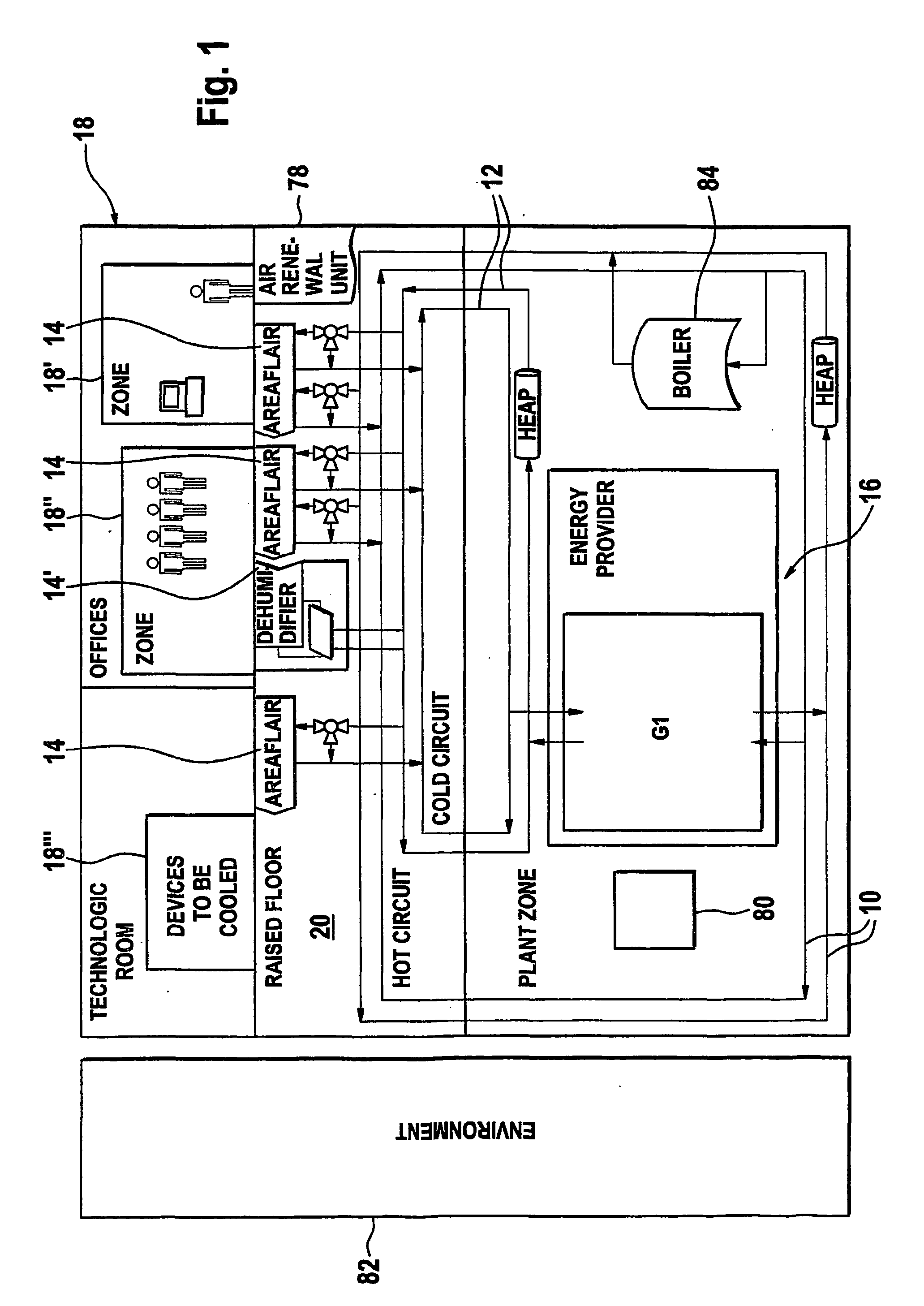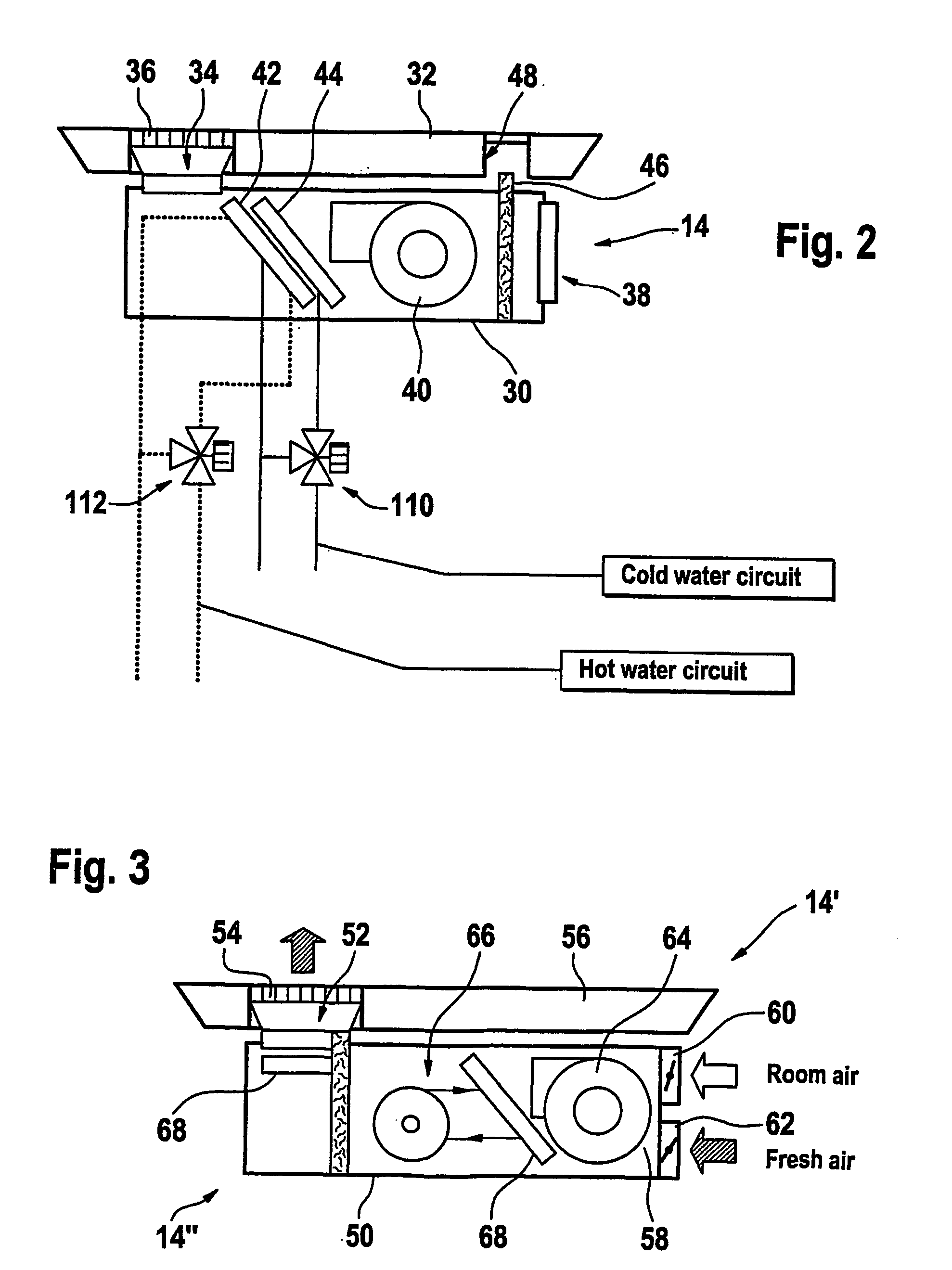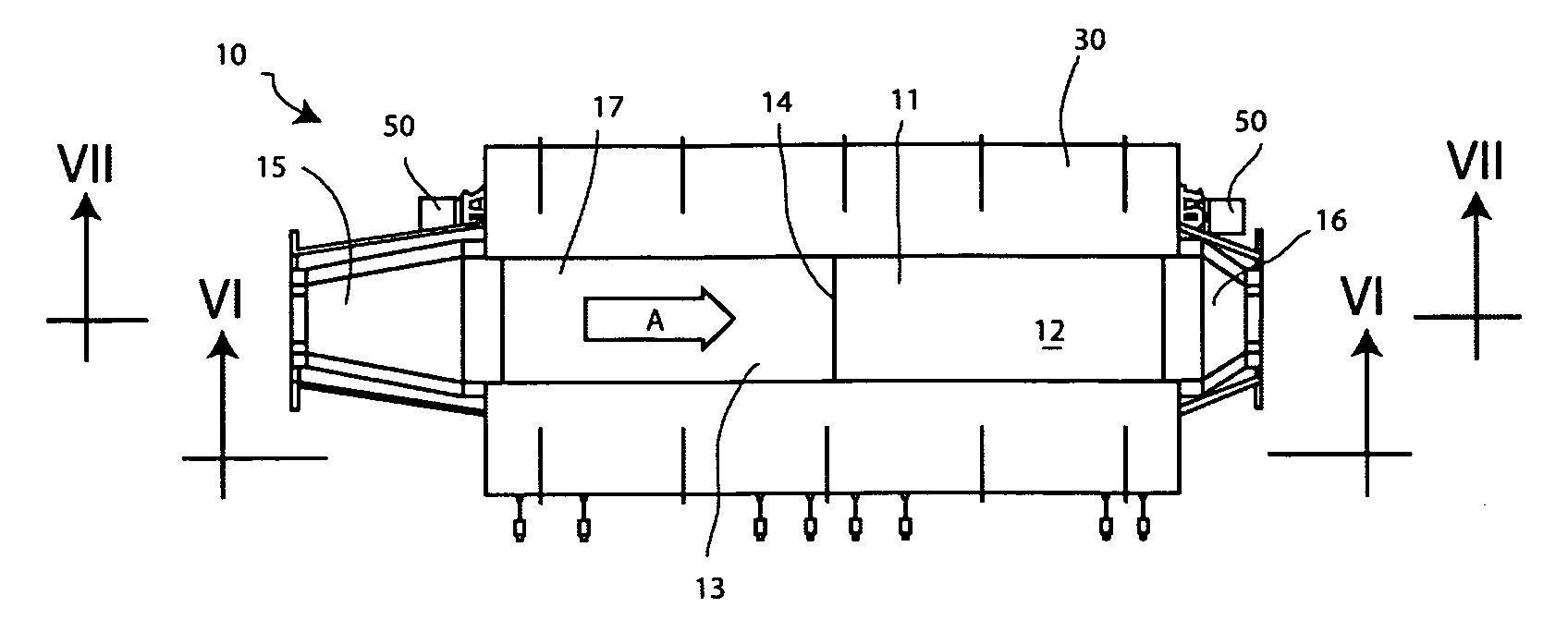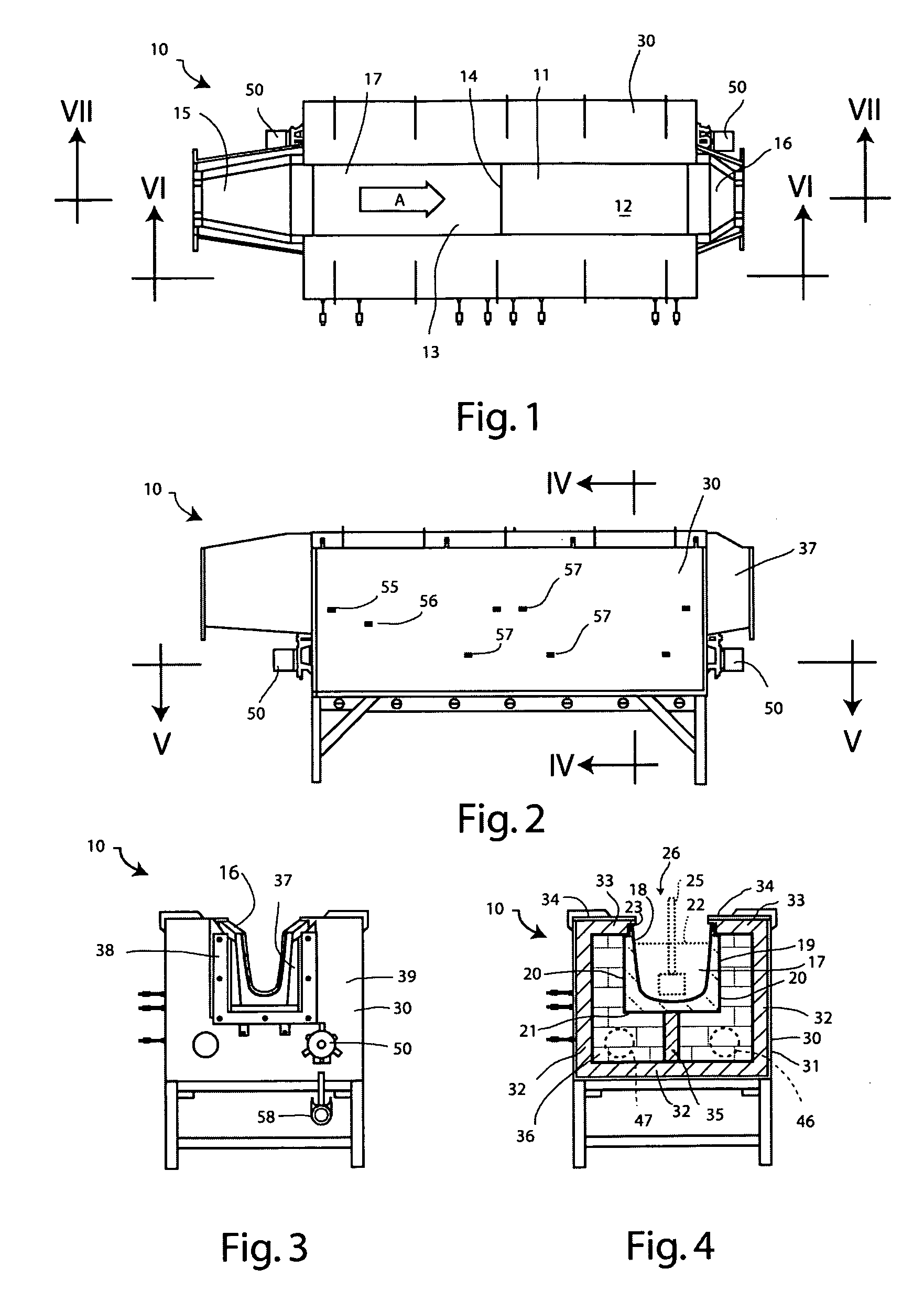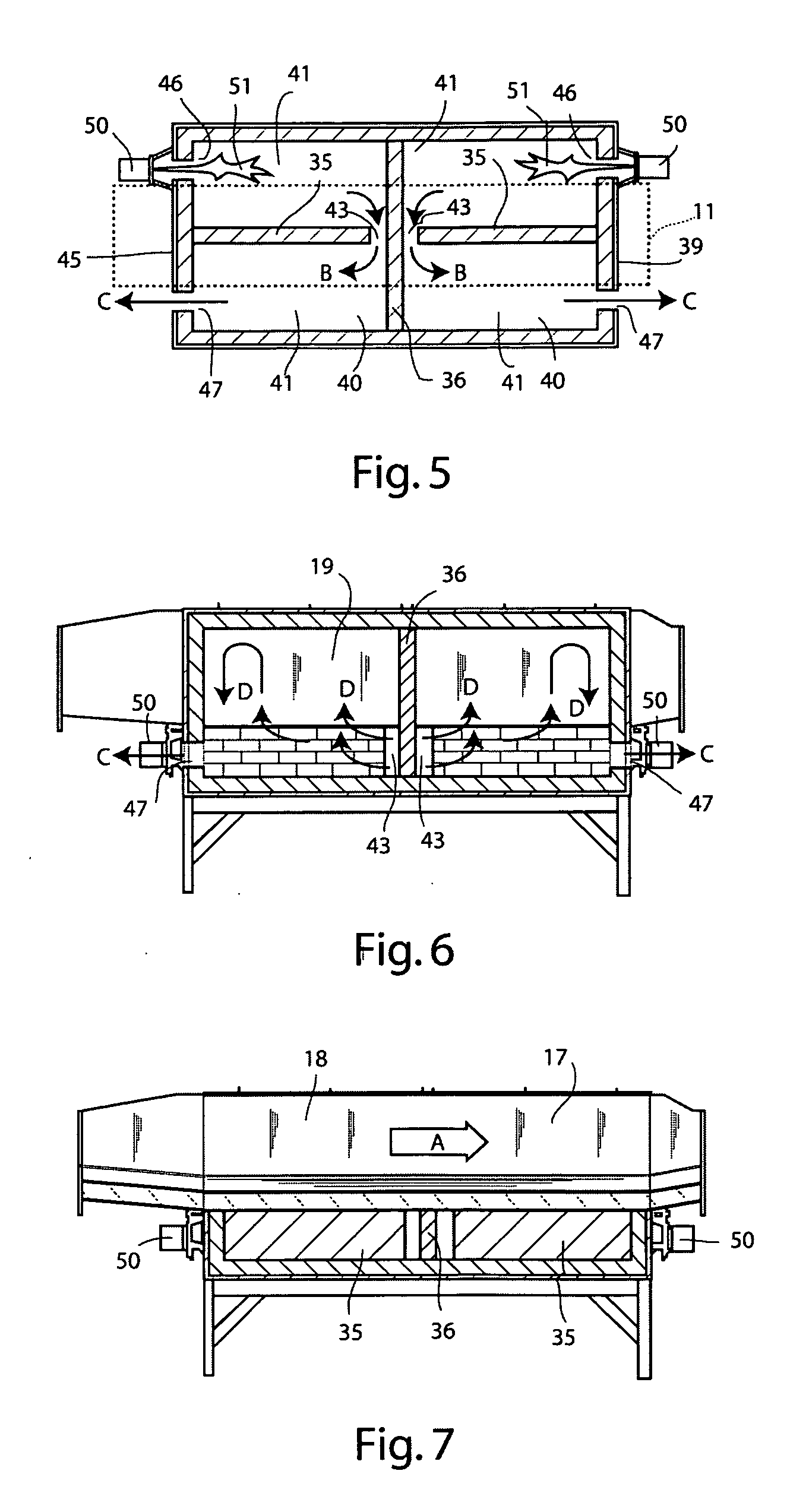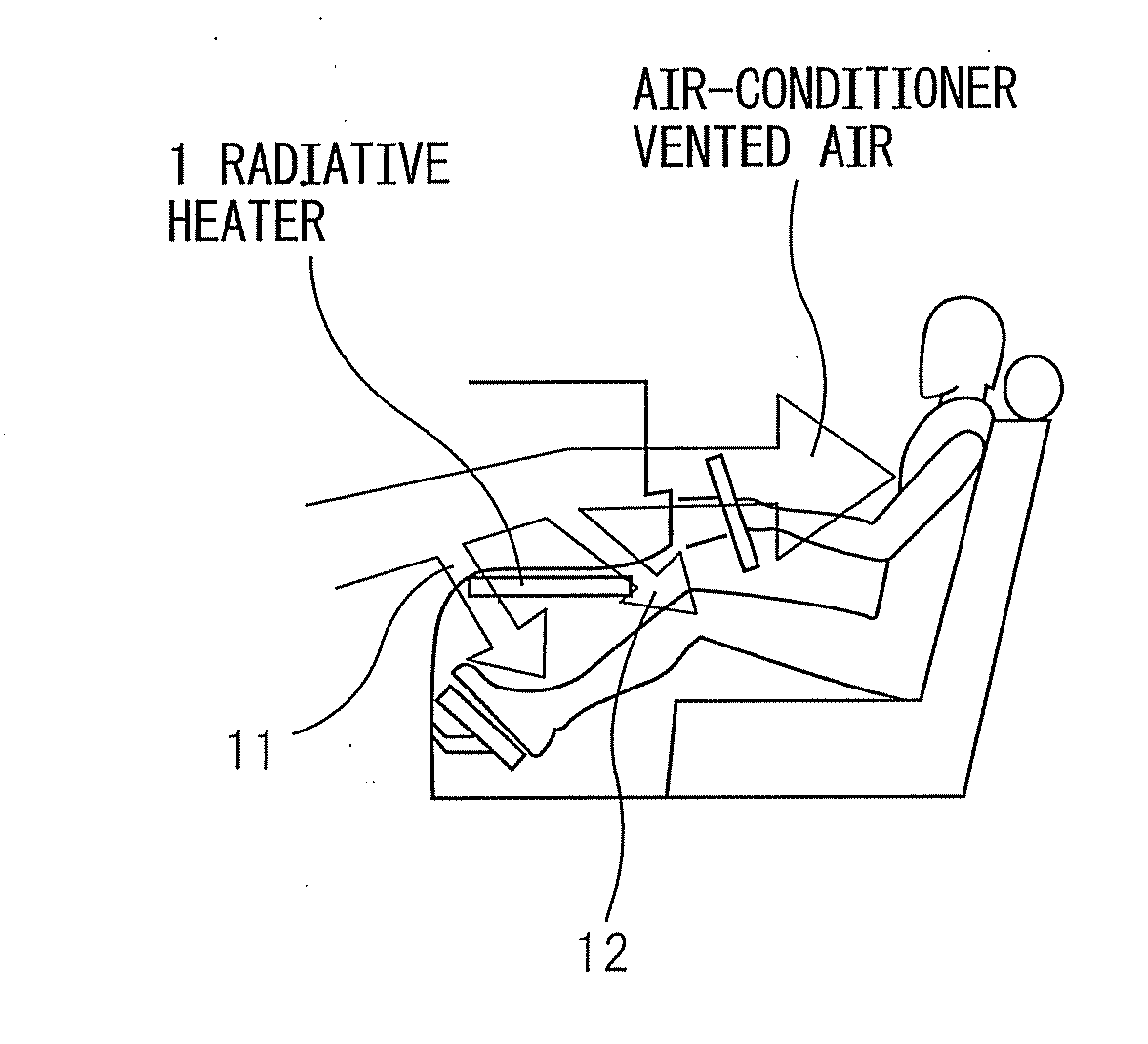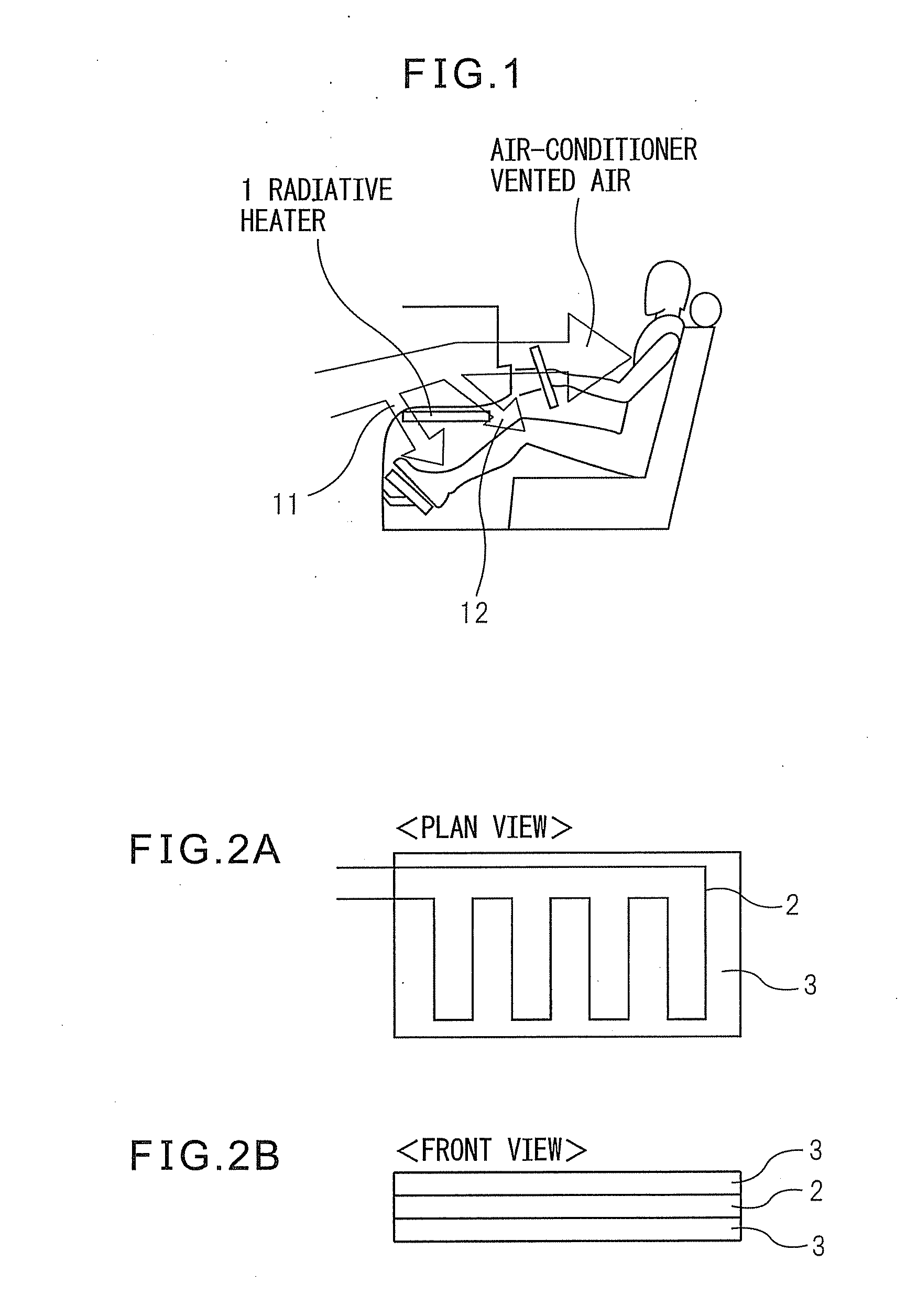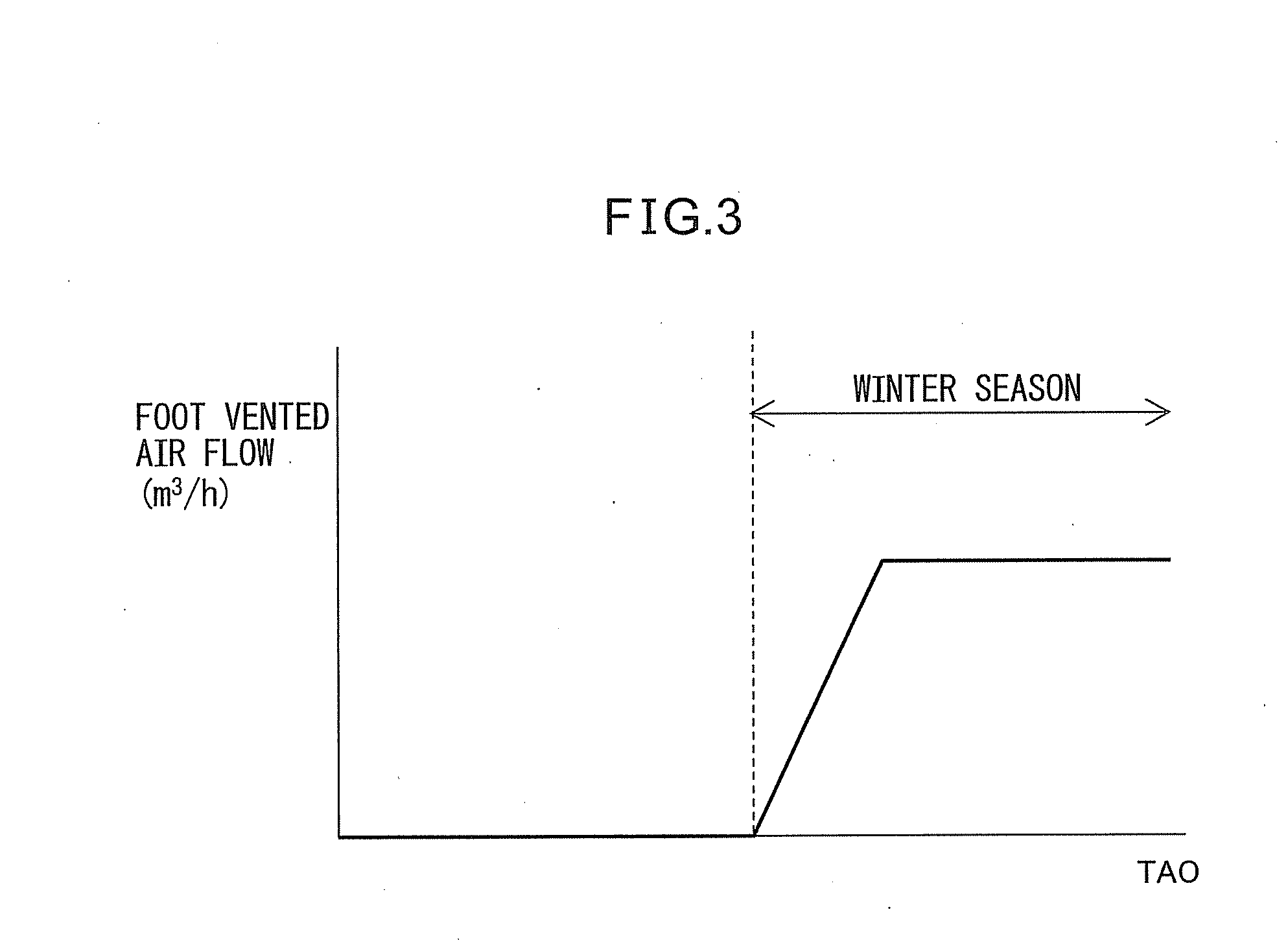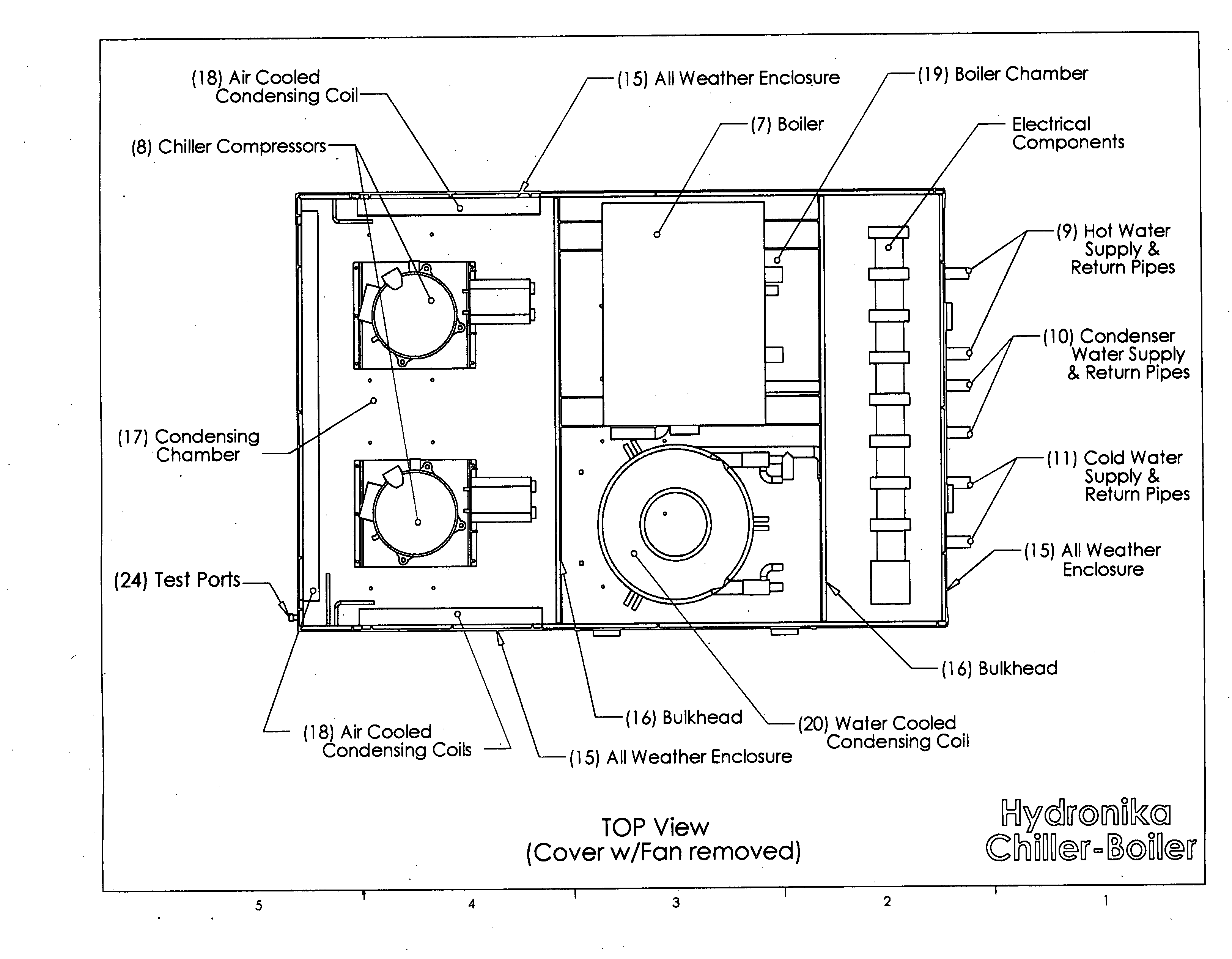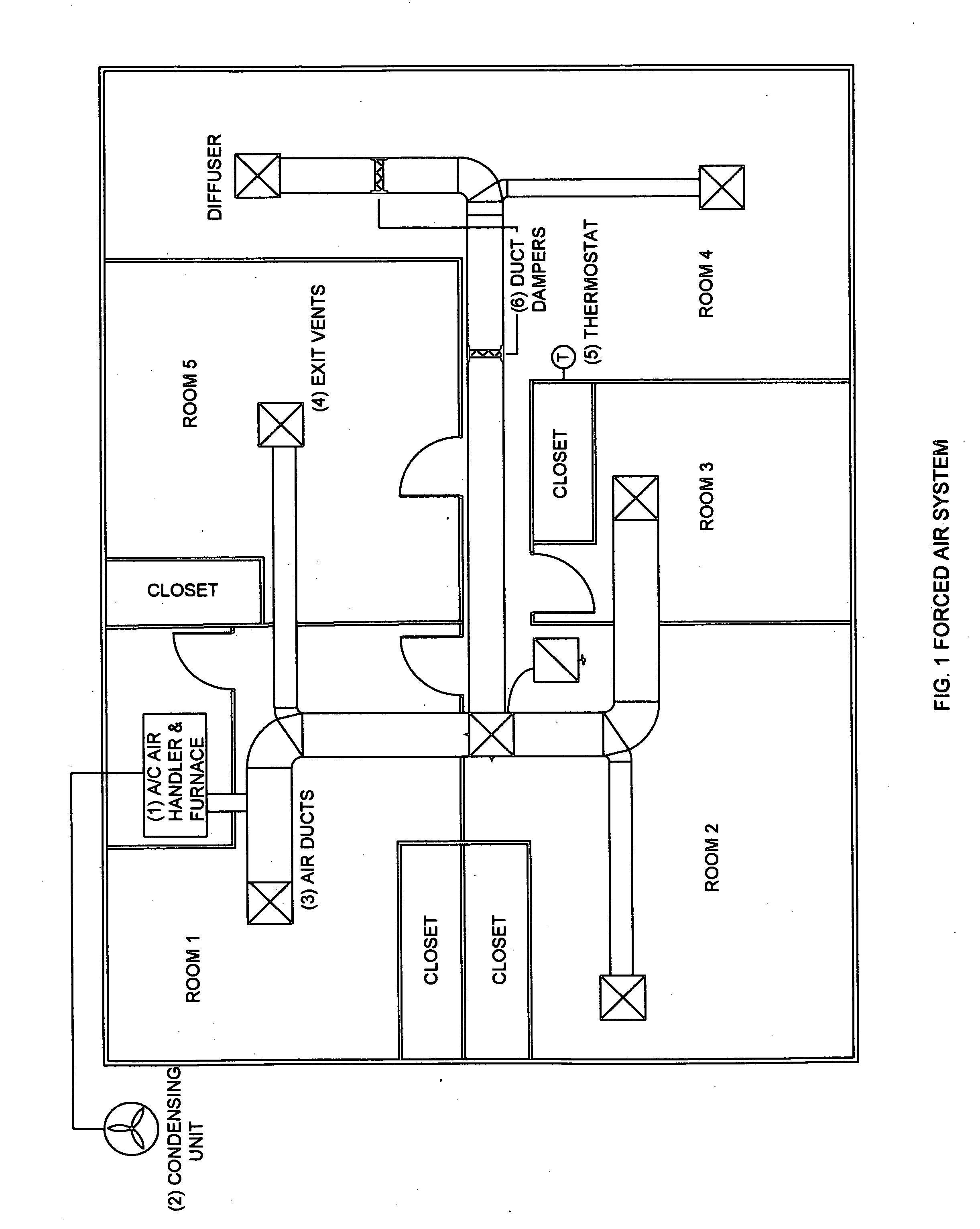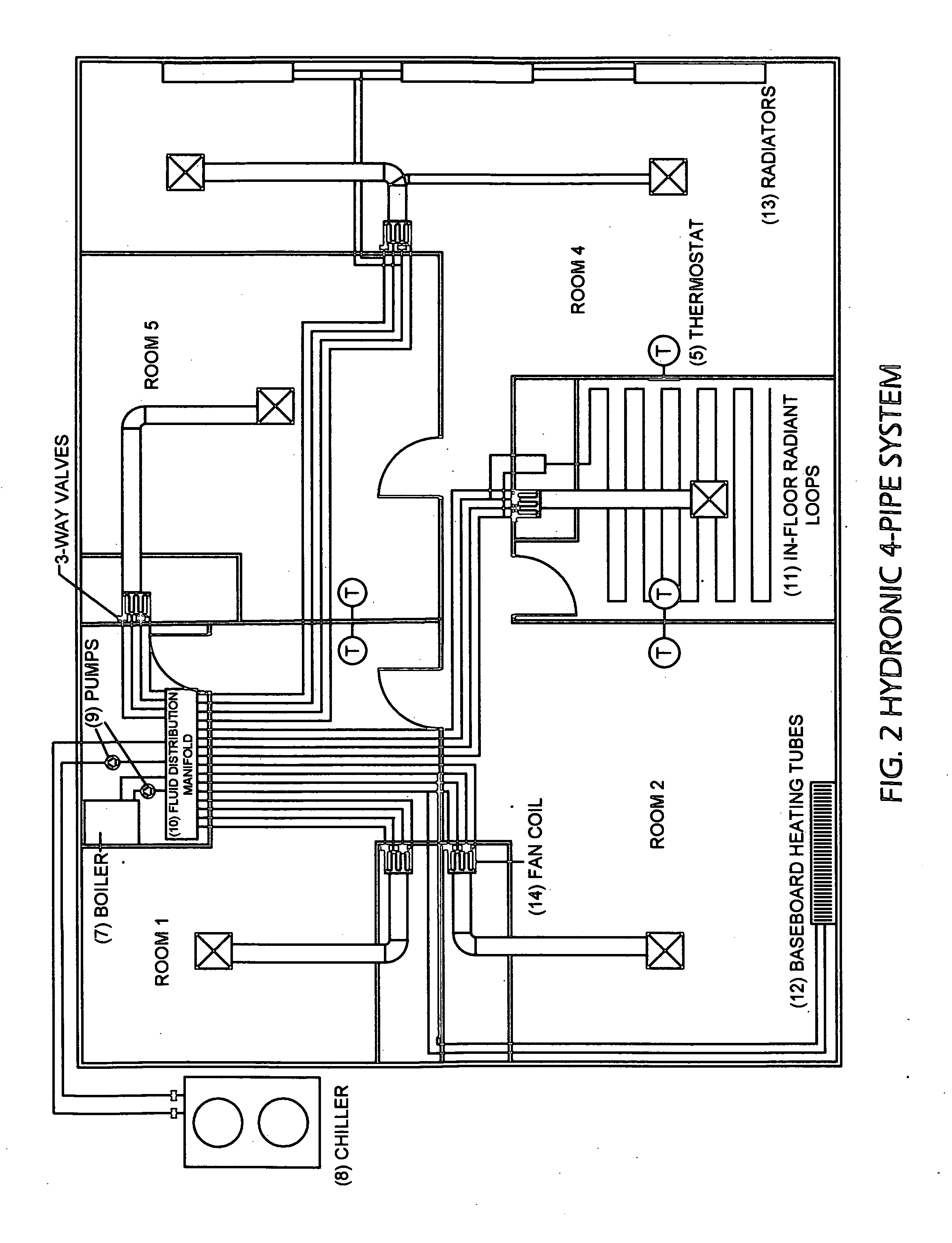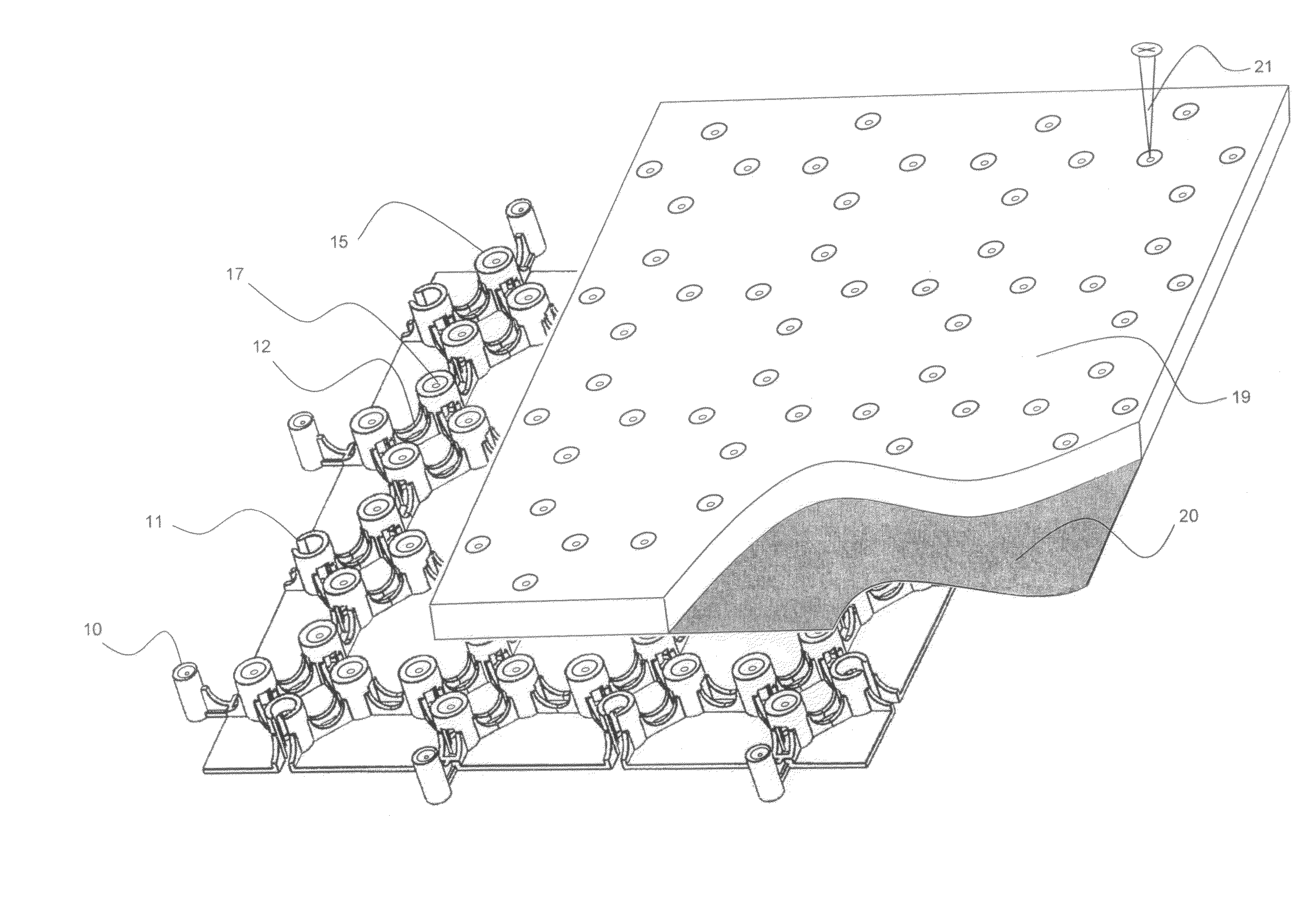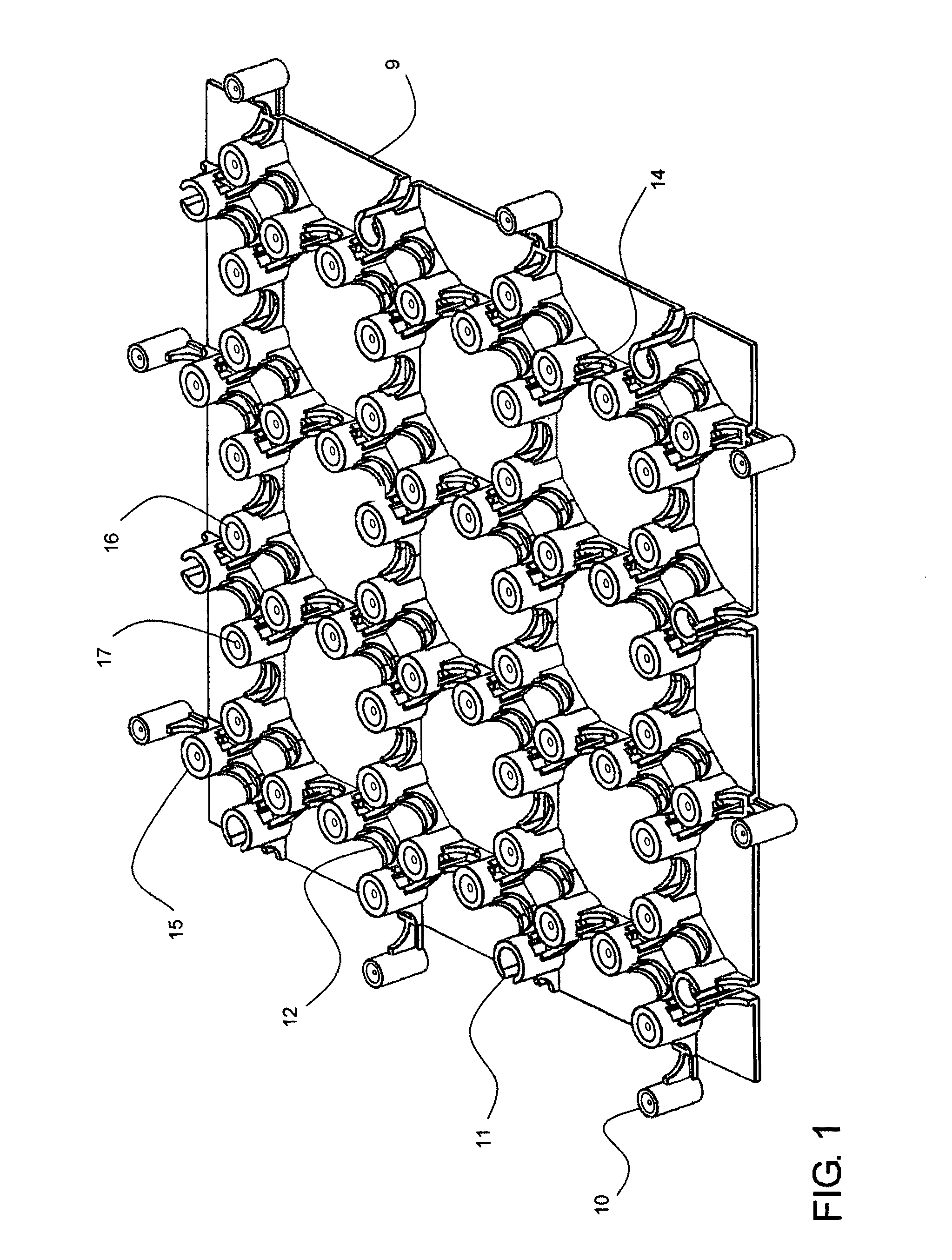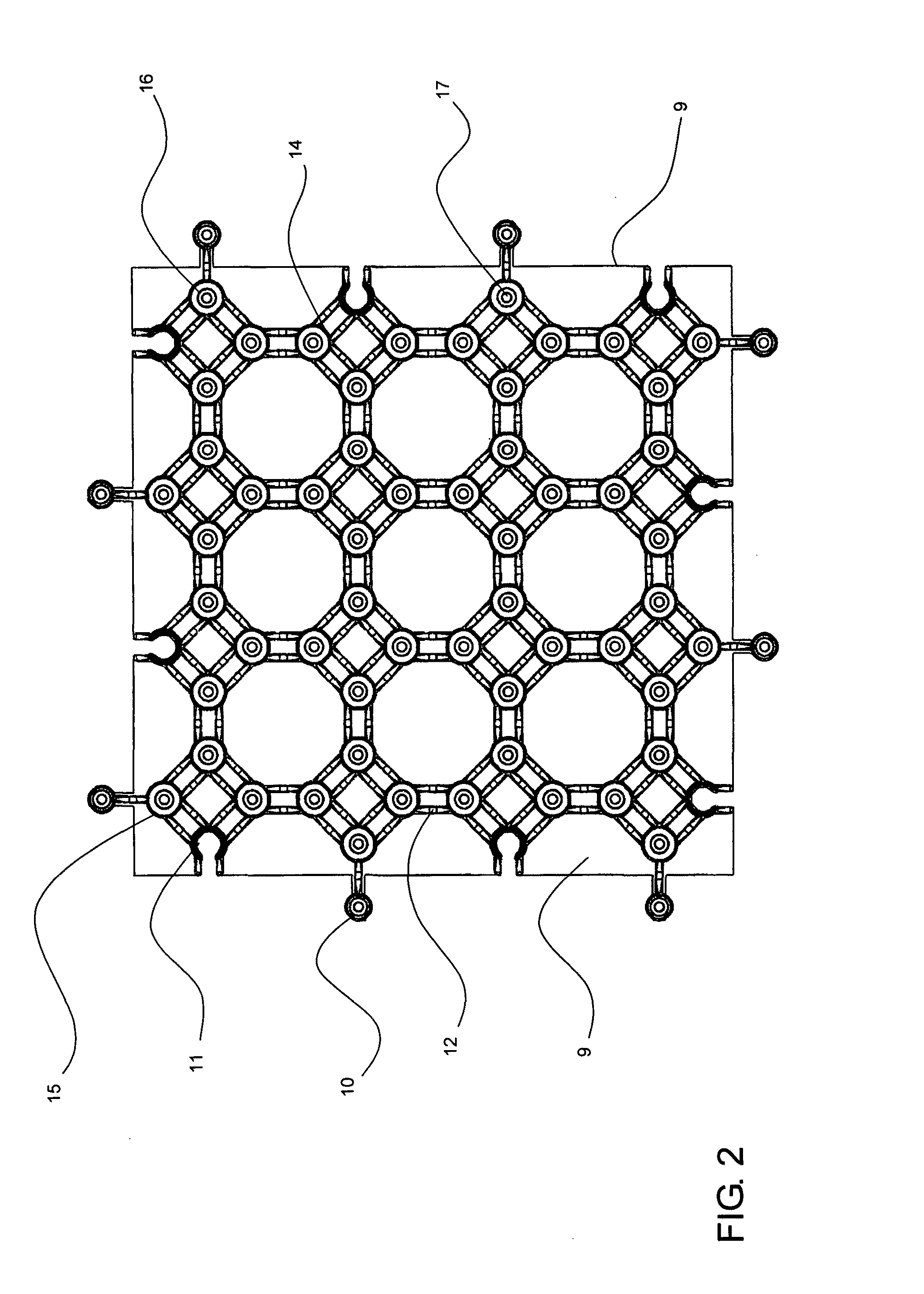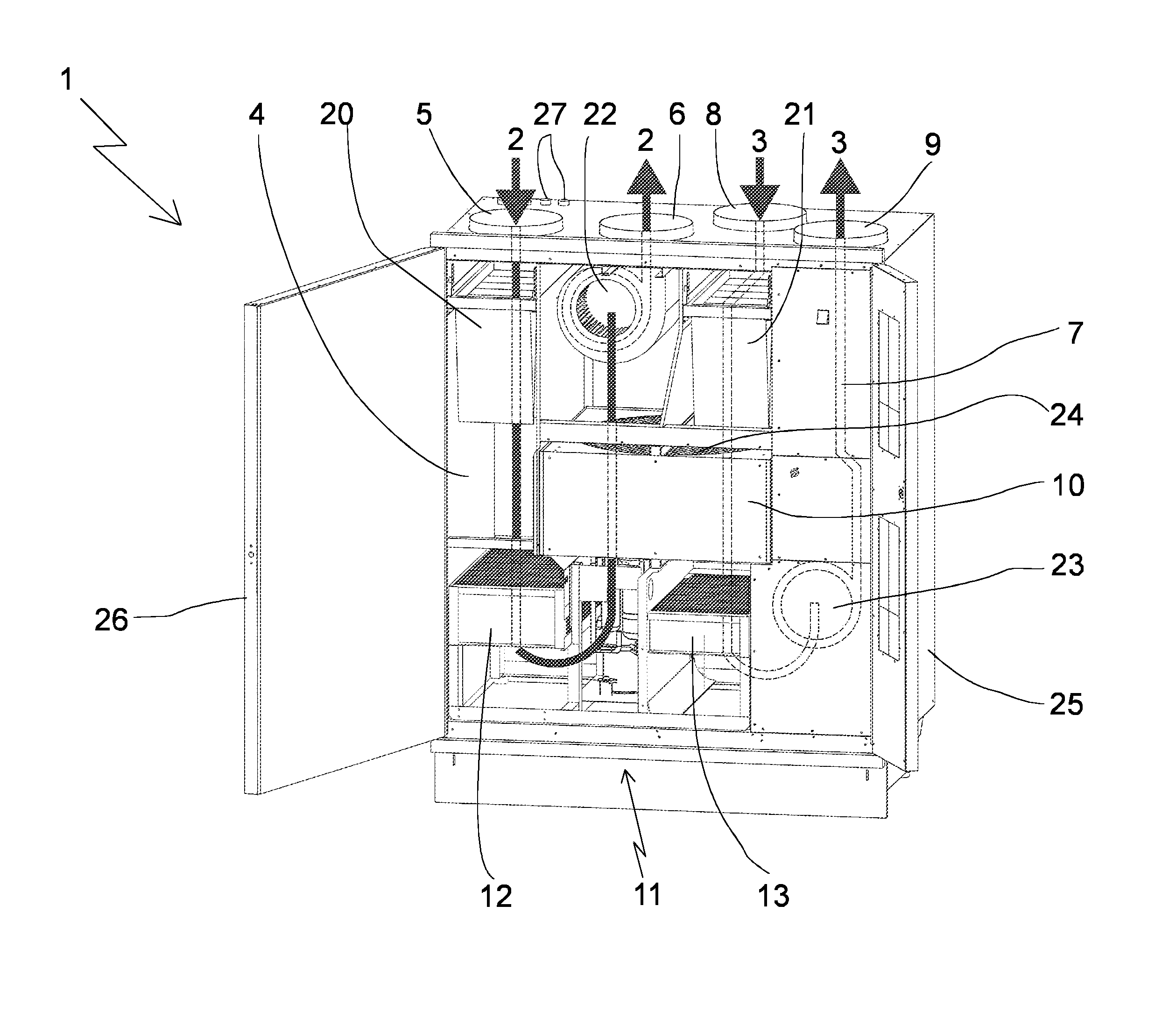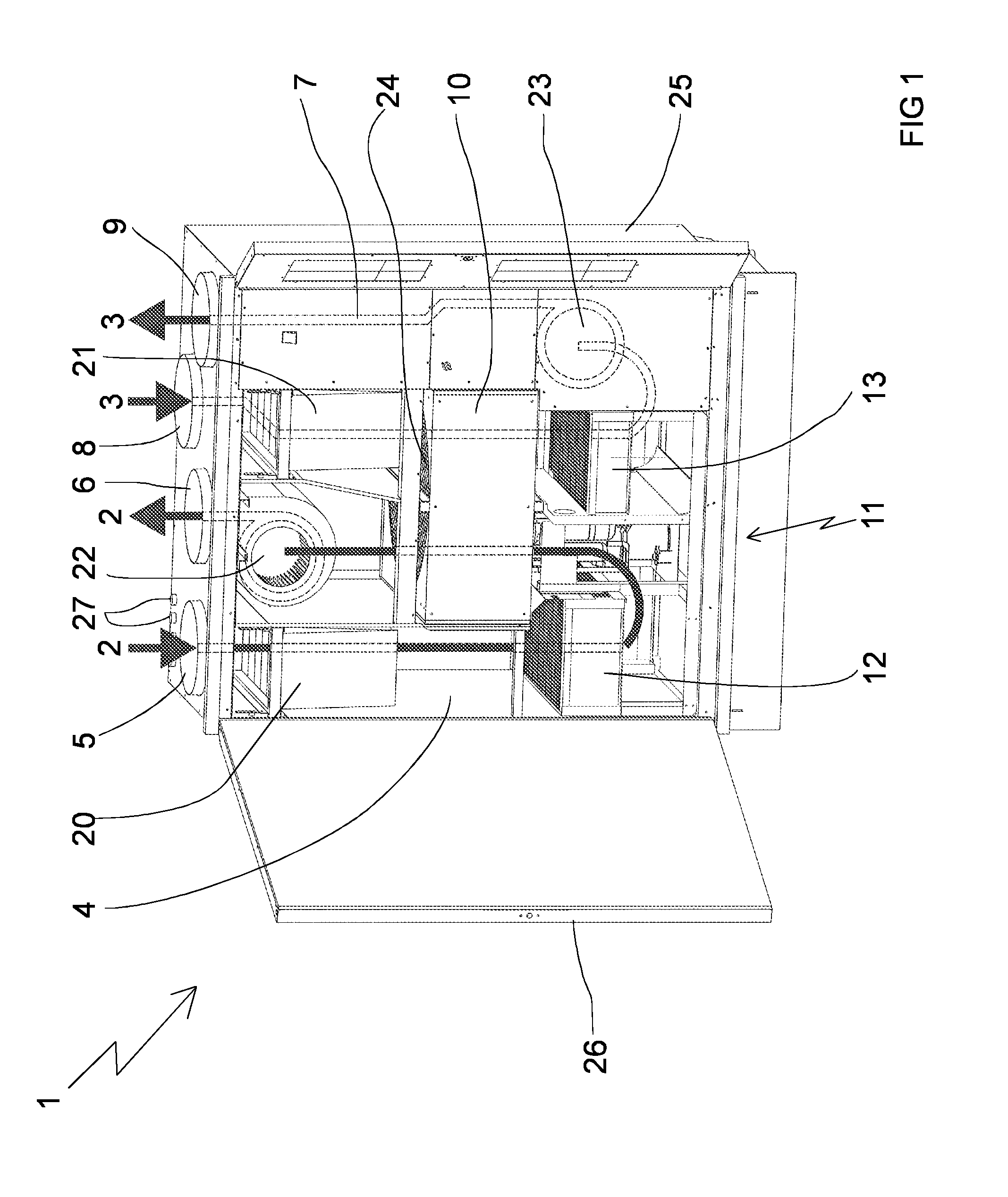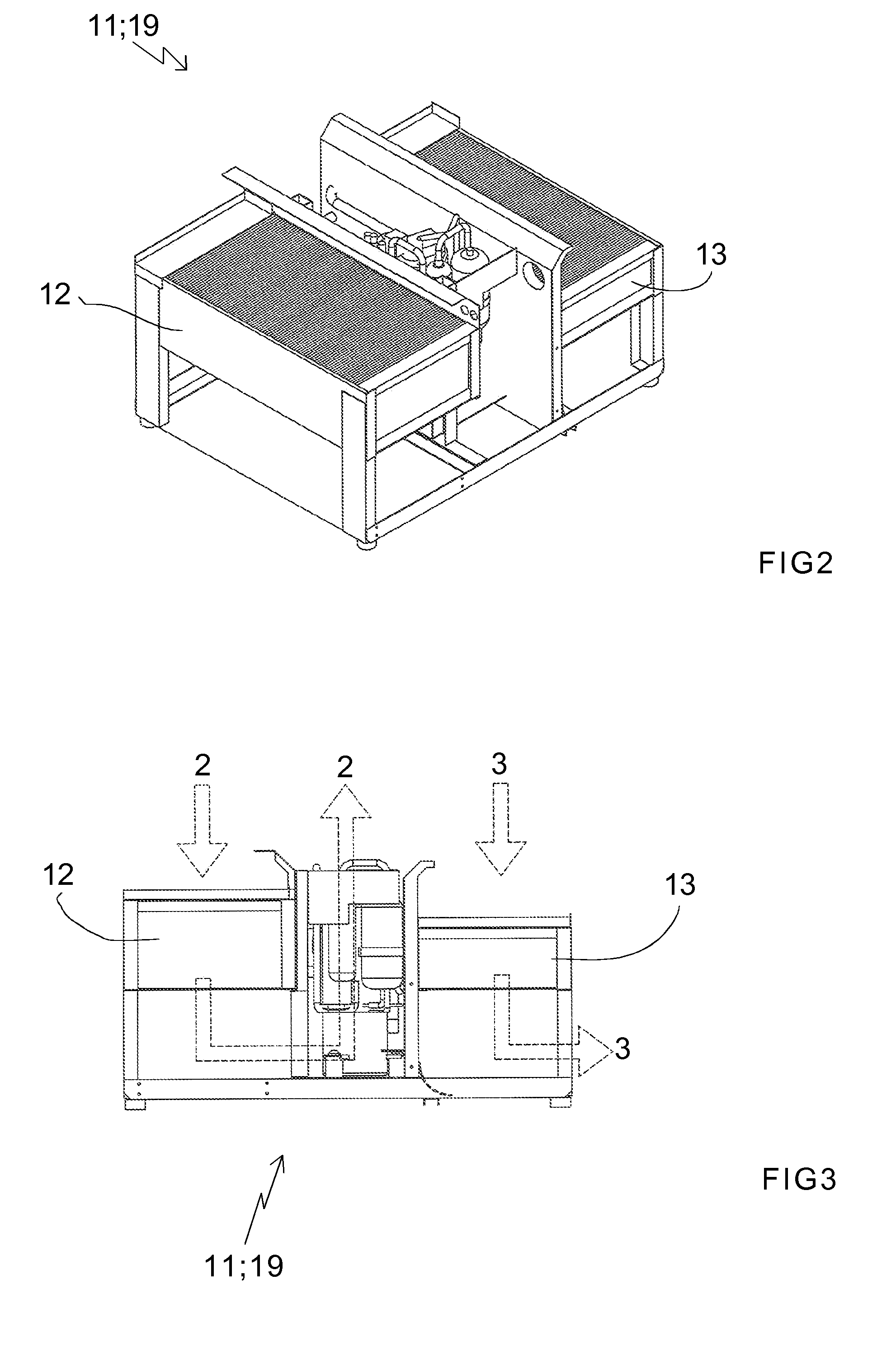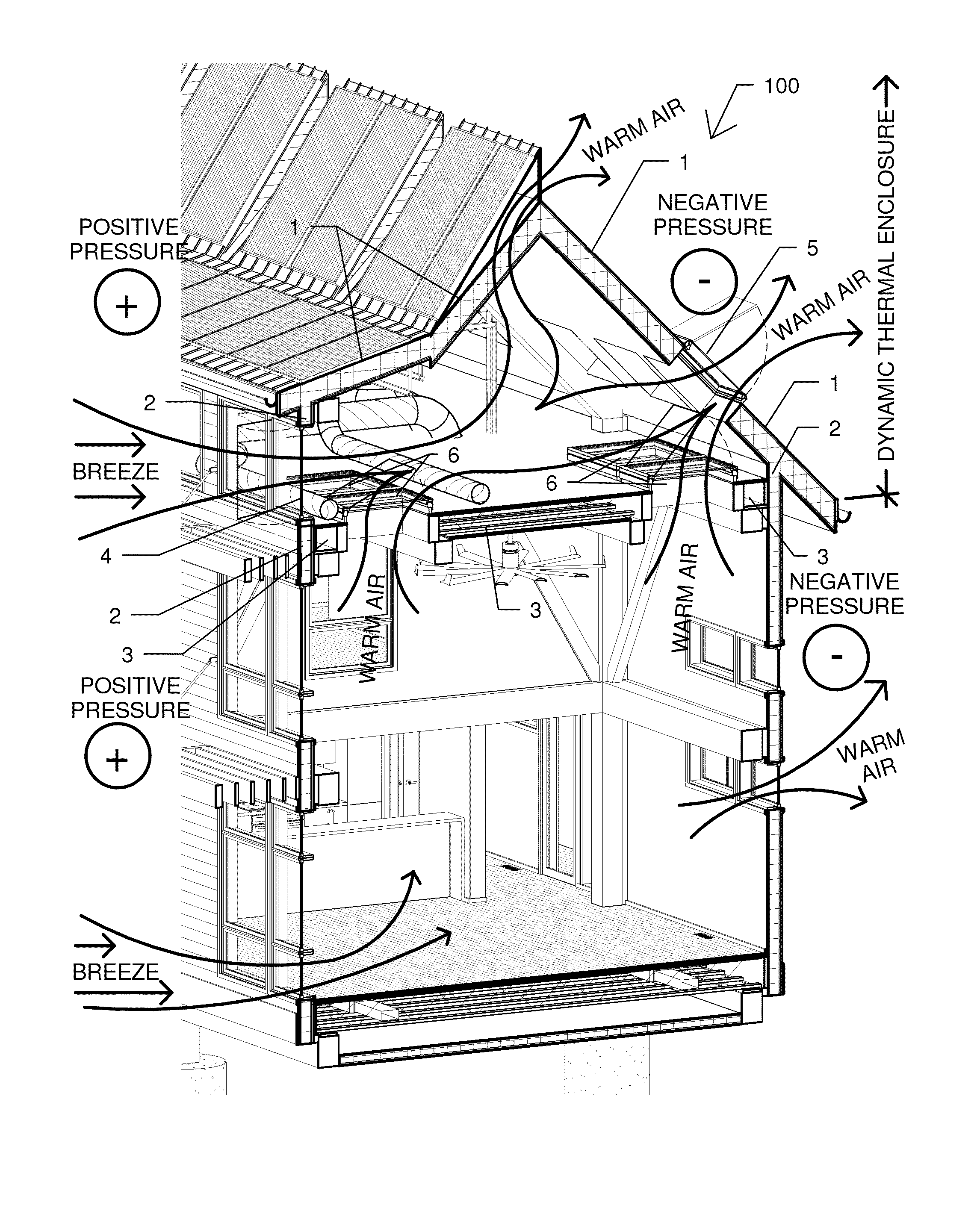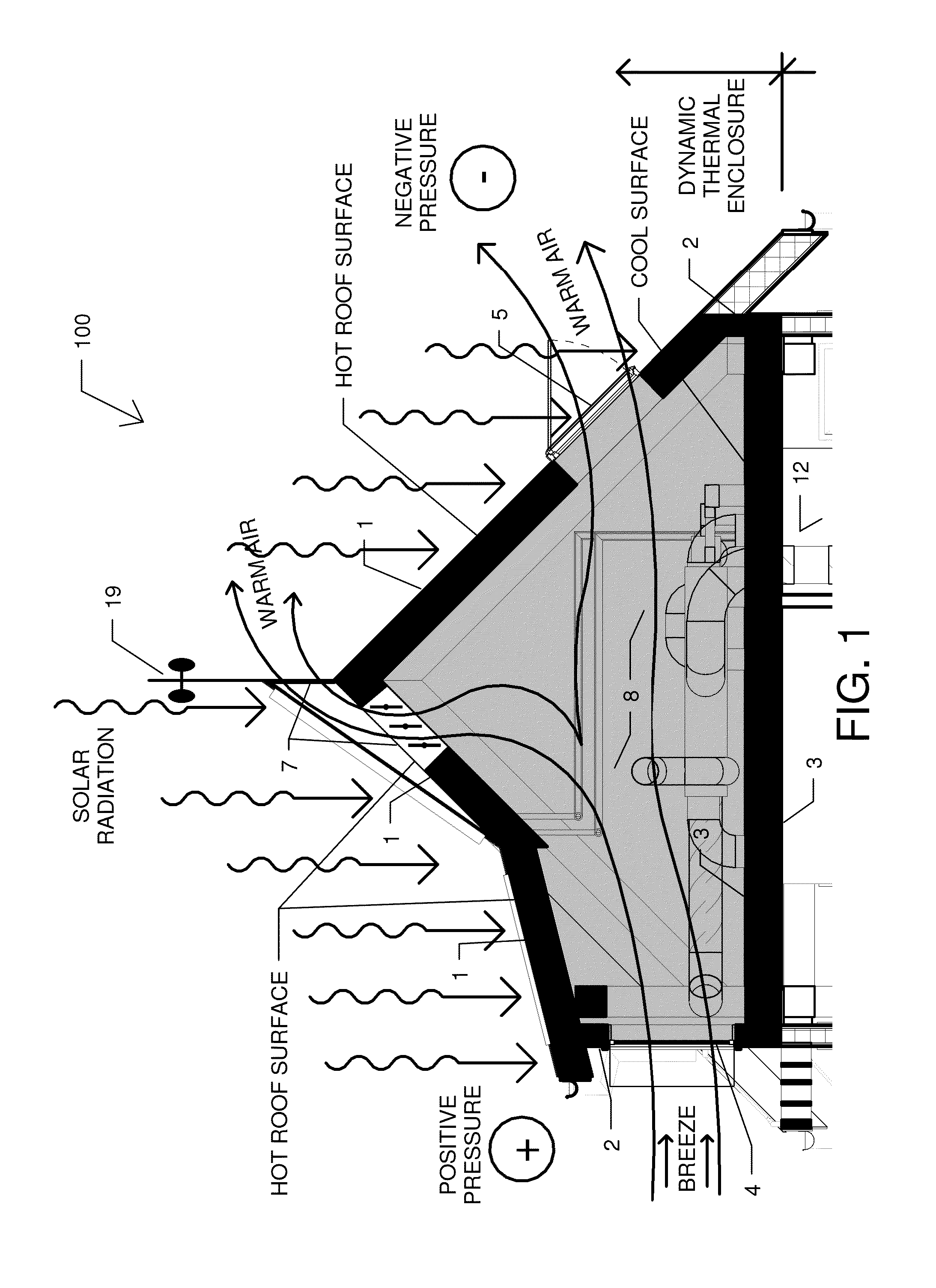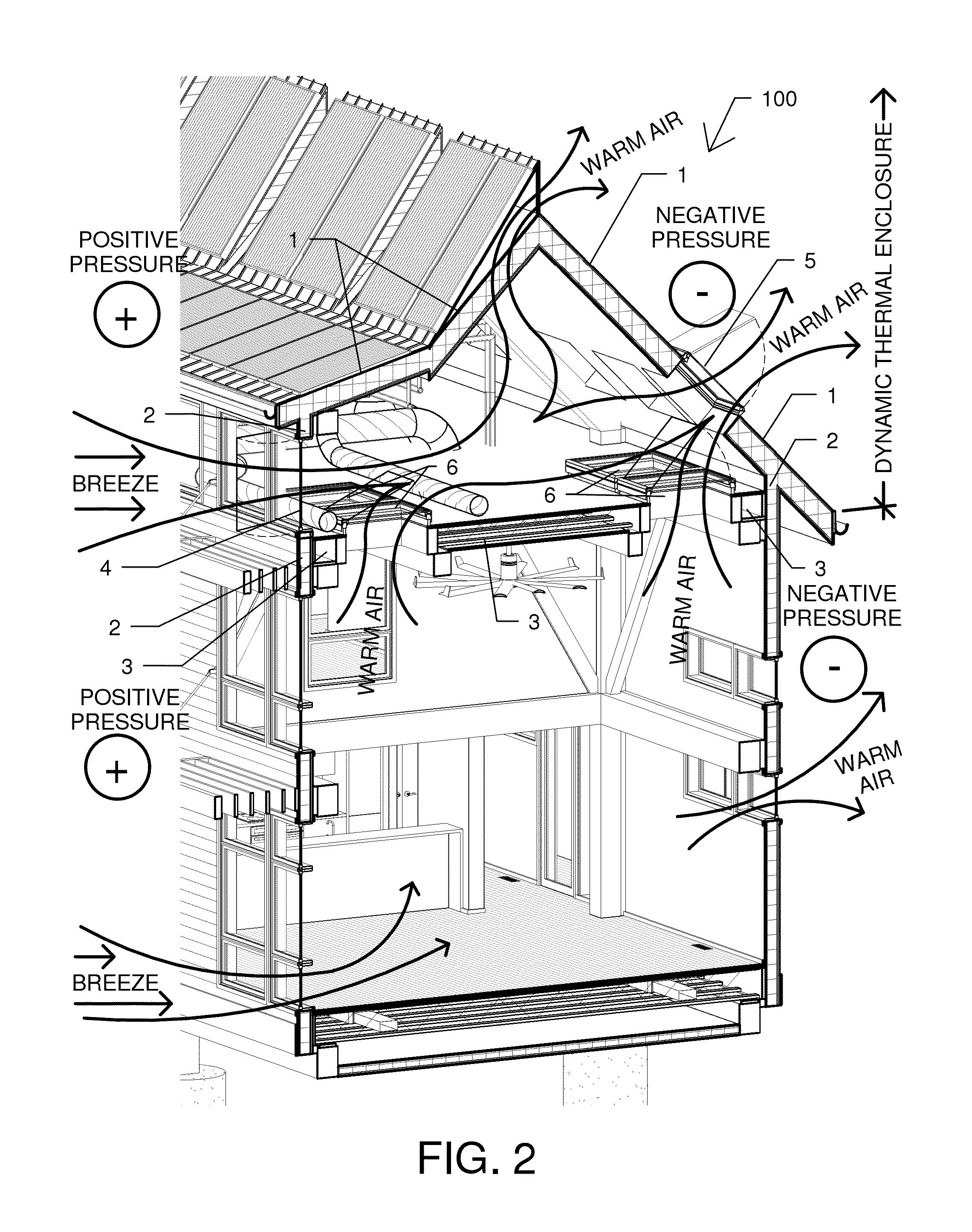Patents
Literature
787results about "Hot-air central heating" patented technology
Efficacy Topic
Property
Owner
Technical Advancement
Application Domain
Technology Topic
Technology Field Word
Patent Country/Region
Patent Type
Patent Status
Application Year
Inventor
Configurable system and method for cooling a room
InactiveUS6557624B1Improve efficiencyReduce air pressureMechanical apparatusHot-air central heatingNuclear engineeringConfigurable systems
A method and system are disclosed for cooling a room having one or more heat generating objects. A number of heat exchangers are disposed adjacent a floor or ceiling and extends substantially entirely or partially between the walls of the room. A fan unit is disposed adjacent the heat exchanger and draws or blows cooled air from the heat exchanger and directs the drawn air into the room. The fan unit is capable of being repositioned along a different portion of the heat exchanger so as to redefine the flow of cooled air into the room. The cooling system components are modularized enabling configuration of a number of components to cool a room.
Owner:VERTIV CORP
Cooling system and method
A fluid communication system for providing coolant to and exhausting coolant from a cooling unit includes flexible tubing and a plurality of support members. Each support member is configured to be secured to a support structure and to be releasably secured to the flexible tubing. Each support member includes a first part and a mating second part, with the first and second parts being configured to be secured to one another with the flexible tubing disposed in between. A method of installing a fluid communication system of a cooling system is further disclosed.
Owner:AMERICA POWER CONVERSION CORP
Assembly For Providing A Downflow Return Air Supply
InactiveUS20100248609A1Maximize capacityMaintain depthFluid heatersHot-air central heatingEngineeringAir conditioning
An assembly for supplying heated air to a housing with an interior that is adapted to hold air conditioning equipment. The housing has a top portion and a back portion, where the top portion defines a first opening that leads to the interior of the housing, and where the first opening is proximate the back of the top portion of the housing. The back portion of the housing defines a second opening that leads to the housing interior, where the second opening is proximate the top of the back portion. The assembly includes a flue external to the housing and adapted to be coupled to the housing such that the flue encompasses and is in fluid communication with the first and second openings, the flue defining an inlet for conducting heated air into the flue and an outlet for conducting heated air out of the flue and into the housing through the first and second openings. The air cooled by the air conditioning equipment in the housing is used to cool electronic equipment.
Owner:WRIGHT LINE
Combination radiant and forced air climate control system
InactiveUS6957696B1Easy to operateInhibition of activationTemperature control without auxillary powerDucting arrangementsResidenceControl system
A method and controller for controlling the operation of a zoned climate control system including a primary heat source, a secondary heat source, a cooling unit, and a humidifier unit. The controller is configured to receive both heating demand signals and cooling demand signals from a plurality of zone thermostats positioned throughout the residence. Upon receiving a heating demand signal, the controller operates the primary heat source to provide heat to the zone issuing the heating demand signal. The controller determines whether the primary heat source satisfies the heating demand signal within a maximum heating period. If the heating demand is not satisfied within this period, the controller activates the secondary heat source to supplement the heat being supplied by the primary heat source.
Owner:KRUMNOW MARK J
Method of extermination utilizing heated air
InactiveUS20050246942A1Conducive to pest controlUniform temperature distributionHot-air central heatingOther heat production devicesTemperature stratificationEngineering
A method of exterminating organisms is provided utilizing heated circulating air. First, a determination is made as to which enclosed areas of the building or other structure are to undergo extermination. This step defines an application zone. Next, a desired elevated temperature limit is established for heated air that is to be circulated through the application zone. Heaters are provided in airflow communication with the application zone, and circulation fans are positioned throughout the application zone to move the heated air for proper heat distribution. The heaters utilize an amount of recirculated air already present in the application zone to cut down on the amount of energy needed to raise the air temperature within the application zone towards the desired elevated temperature limit, and to eliminate the need for high CFM airflow heaters to achieve air temperature elevation. The temperature at various nodes within the application zone may be monitored to allow personnel to redirect circulating airflow within the application zone to balance out areas of higher air temperature with areas of lower air temperature. The method takes advantage of convection heat transfer to raise the temperature evenly within an application zone, minimizing temperature stratification which could result in ineffective pest extermination and / or damage to equipment and facilities.
Owner:IND FUMIGANT
System and method for hydronic space heating with electrical power generation
ActiveUS20050161521A1Easy to useMaximizing run timeInternal combustion piston enginesWaste gas energyCogenerationEngineering
This invention provides a system and method for cogeneration of electric power and building heat that efficiently interfaces a liquid-cooled electric power generator with a multi-zone forced hot water (hydronic) space heating system. The system and method utilizes an electric generator with an electric output capacity (kW) that is near the time-averaged electric power consumption rate for the building and with a heat generation capacity that is useful for meeting building heating needs. This generator is operated as the priority source of heat for the building, but normally only when there is a demand for heat in building, with the intent of running the generator for long periods of time and generating a total amount of electric energy (kWhs) that is significant in comparison to the total electric energy consumption of the building over time. The actual onsite time-variable power demand (kW) is met by a combination of the cogenerated electric power produced on site and quantities of electric power from the public electric power grid or another external power source. Hence, useful electric power is generated on site as a by-product of the required generation of heat for space or water heating. The generator is run at a speed / operating condition that is appropriate to maintaining a long operational life.
Owner:CLIMATE ENERGY
Cogeneration system
InactiveUS20060283967A1Maximum energy efficiencyImprove the heating effectMechanical apparatusHeat pumpsCogenerationProcess engineering
A cogeneration system is disclosed which includes a generator, a drive source for driving the generator, a waste heat supplying heat exchanger for enhancing the heating performance of a heat pump type air conditioner, an auxiliary heating heat exchanger using the waste heat of the drive source as a heat source for heating indoor air, and a regeneration heat supplying heat exchanger using the waste heat of the drive source as a heat source for regenerating a dehumidifier. The cogeneration system can use the waste heat of the drive source for diverse purposes in accordance with the indoor environment, and can have a maximal efficiency.
Owner:LG ELECTRONICS INC
Use of renewable energy like solar, wind, geothermal, biomass, and hydropower for manufacturing combustion air for a fossil fuel burner and firebox
InactiveUS20080131830A1Reduce the amount requiredCarbon reductionSolar heating energyFuel heating with wind energyCombustion chamberEvaporation
Invented is a method of making combustion air for a fossil fuel burner, as a coal burning power plant, oil refinery or gas fired household appliance. Combustion air is made from solar, wind, biomass, hydropower or geothermal. A staged progression using lower cost greenhouses, or flatplates, or solarponds, feed warm air to higher cost concentrator solar collectors. Wind energy, biomass, geothermal energy heat and compress combustion air. Hydropower also heats and compresses combustion air. Solar evaporation from salt or impure water creates water or local rain for the hydropower system. Combustion air thus is made economically hot, compressed and high velocity, and placed into a heavily insulated pipes for long distance transmission to a distant power plant.
Owner:NIX MARTIN E
System and method for hydronic space heating with electrical power generation
ActiveUS7284709B2Minimizing starting and stoppingMaximizing run timeInternal combustion piston enginesGas turbine plantsCogenerationElectric generator
This invention provides a system and method for cogeneration of electric power and building heat that efficiently interfaces a liquid-cooled electric power generator with a multi-zone forced hot water (hydronic) space heating system. The system and method utilizes an electric generator with an electric output capacity (kW) that is near the time-averaged electric power consumption rate for the building and with a heat generation capacity that is useful for meeting building heating needs. This generator is operated as the priority source of heat for the building, but normally only when there is a demand for heat in building, with the intent of running the generator for long periods of time and generating a total amount of electric energy (kWhs) that is significant in comparison to the total electric energy consumption of the building over time. The actual onsite time-variable power demand (kW) is met by a combination of the cogenerated electric power produced on site and quantities of electric power from the public electric power grid or another external power source. Hence, useful electric power is generated on site as a by-product of the required generation of heat for space or water heating. The generator is run at a speed / operating condition that is appropriate to maintaining a long operational life.
Owner:CLIMATE ENERGY
Solar heating system for building with cast-in-situ open-web floor
InactiveCN101603698AImprove efficiencyLow costSolar heating energyHot-air central heatingAir cycleThermal energy
The invention relates to a solar heating system for a building with a cast-in-situ open-web floor, which belongs to a system for providing heat for the building by using solar energy. In the proposal, sunlight is focused on a heat energy receiver by a concentration chip, and then hot air generated by the heat energy receiver is blown to the floor by a fan. The floor is formed by cast-in-situ of thin-walled box bodies; the thin-walled box bodies form a hot air cycle channel in the floor by using connecting channels; the hot air heats the floor after entering the floor, so the entire floor becomes a heat dissipating integration. The lower part of the thin-walled box bodies is provided with an air outlet leading to a room; when the air outlet is opened, the hot air is discharged to the room directly to heat the room quickly. The proposal makes use of the energy of the nature, so the solar heating system is clean and environment-friendly and saves cost and power; besides, the proposal makes full use of own structural characteristics of the building to avoid the problems of installation of additional devices and space occupation.
Owner:王本淼 +1
Heat pump system having a pre-processing module
ActiveUS20120180505A1Avoid frostImprove regeneration efficiencyEnergy recovery in ventilation and heatingMechanical apparatusComputer moduleEnergy recovery
A heat pump system is operable in winter mode and / or summer mode, and may be selectively operated in a defrost mode or cycle. The system includes an energy recovery module that receives and conditions air in a regeneration air channel. A pre-processing module is positioned downstream of the energy recovery module. The pre-processing module receives and heats air from the energy recovery module. A regeneration air heat exchanger is positioned downstream of the pre-processing module. The regeneration air heat exchanger receives and conditions air from the pre-processing module. The pre-processing module heats the air from the energy recovery module to increase efficiency of the regeneration air heat exchanger. During the defrost mode, a loop of regeneration air may be recirculated between the supply air channel and the regeneration air channel in order to defrost the regeneration air heat exchanger.
Owner:NORTEK AIR SOLUTIONS CANADA INC
Photovoltaic passive heating wall
InactiveCN1944829AReduce indoor heat loadLess investmentHot-air central heatingWallsElectricityPassive heating
The photovoltaic passive heating wall includes glass plate with photovoltaic cells adhered to the back side, two summer ventilating openings, two winter ventilating openings, heat collecting wall, and DC blower for speeding the airflow in the airflow channel. The photovoltaic glass plate is installed on one frame parallel to the heat collecting wall, two summer ventilating openings are in the upper and the lower part of the airflow channel separately, two winter ventilating openings are in the upper and the lower part of the heat collecting wall separately, and the DC blower is installed in the winter ventilating openings or the airflow channel. The present invention has photovoltaic cells, forced airflow to lower the temperature of the cells and raised electricity generating efficiency, the electricity generating and heating functions and building appearance with fascination.
Owner:UNIV OF SCI & TECH OF CHINA
Modular heat exchange system
ActiveUS20090114381A1Increase flexibilityFunction increaseFluid heatersHot-air central heatingModularityEngineering
A modular heat exchange system for use in a central heat exchange installation in buildings, including at least one heat exchange element equipped for exchanging heat between environmental air and a fluid which is conducted through the heat exchange element. The heat exchange element has a predetermined first shape with opposite lateral sides. At least one non-heat-exchange add-on element, equipped for adding a given additional functionality to the system, has a predetermined second shape with a complementary lateral side to one of the opposite lateral sides of the heat exchange element.
Owner:WILLEMS RONY
Electric powertrain for work machine
An electric powertrain includes an engine configured to provide mechanical energy and a generator operably coupled to the engine and configured to convert at least a portion of the mechanical energy into electric energy. The electric powertrain further includes at least one electric motor operably coupled to the generator, a plurality of driving members, and at least one power electronics unit configured to control at least one of the engine and the generator. The at least one electric motor is configured to provide torque for the plurality of driving members.
Owner:CATERPILLAR INC
High speed convection oven
A convection heating apparatus capable of providing effective, high speed cooking without the assistance of microwave energy. The oven apparatus includes an exterior cabinet, a door, and a cooking chamber having interior side walls, a back wall, and a lower jet plate. The oven further includes a blower for circulating gas through the lower jet plate into the cooking chamber. In addition, the oven includes a product support disposed within the cooking chamber above said lower jet plate. The product support is disposed on a rail that is positioned to hold the lower jet plate in place when air is circulated therethrough. Optionally, the oven further includes an upper jet plate disposed within the cooking chamber above the product support. Temperature controlled gas is circulated through the upper jet plate toward the product support and any food product disposed on the product support. The oven may also include means for imparting movement to the product support during cooking operations in order to provide a more even cooking of a food product. A catalytic converter material is disposed downstream from the blower and upstream from a return plate which controls the direction of gas flow from the cooking cavity and protects the catalytic converter material.
Owner:TURBOCHEF TECH INC
System and method for warm air space heating with electrical power generation
This invention provides a system and method for cogeneration of building heat and electric power and that efficiently interfaces a warm air heating system with a liquid-cooled electric power generator. The system and method utilizes an electric generator that is rated at near the time-averaged electric power consumption for the building. This generator is operated as the priority source of heat for the building, but normally only when there is a demand for heat in building. In this manner, the generator can run to generate a significant part of the building's electric power but in a manner that is typically supplemented in variable quantities by power from a public power grid. The heat output is directed via a liquid coolant circuit on the generator, as needed, to the warm air heating unit for the building. The warm air heating unit blows return air through a cabinet and out to the supply duct(s). The warm liquid coolant is directed through a primary heat exchanger in the cabinet. The air is passed over this primary heat exchanger to provide heat to the building. When heat from primary heat exchanger is insufficient to heat the building fully, an auxiliary heater, operated typically by burning fuel, supplements the heat through one or more auxiliary heat exchangers arranged in line along the airflow path with the primary heat exchanger. The blower that directs the airflow is controlled variably in speed to create the most efficient use of electric power by the blower and a desirable heated air delivery temperature.
Owner:CLIMATE ENERGY
System and method for warm air space heating with electrical power generation
This invention provides a system and method for cogeneration of building heat and electric power and that efficiently interfaces a warm air heating system with a liquid-cooled electric power generator. The system and method utilizes an electric generator that is rated at near the time-averaged electric power consumption for the building. This generator is operated as the priority source of heat for the building, but normally only when there is a demand for heat in building. In this manner, the generator can run to generate a significant part of the building's electric power but in a manner that is typically supplemented in variable quantities by power from a public power grid. The heat output is directed via a liquid coolant circuit on the generator, as needed, to the warm air heating unit for the building. The warm air heating unit blows return air through a cabinet and out to the supply duct(s). The warm liquid coolant is directed through a primary heat exchanger in the cabinet. The air is passed over this primary heat exchanger to provide heat to the building. When heat from primary heat exchanger is insufficient to heat the building fully, an auxiliary heater, operated typically by burning fuel, supplements the heat through one or more auxiliary heat exchangers arranged in line along the airflow path with the primary heat exchanger. The blower that directs the airflow is controlled variably in speed to create the most efficient use of electric power by the blower and a desirable heated air delivery temperature.
Owner:CLIMATE ENERGY
Multi-Component System for Treating Enclosed Environments
ActiveUS20150128483A1Eradicate smoke and water damageStructural damageHot-air central heatingDrying solid materials with heatComputer moduleEngineering
Described herein is a heating system where air is drawn into a system where hot gas is injected into it. The air is then discharged at a regulated temperature into an environment through ductwork to heat environments to elevated temperatures and employing functional modules to further condition the air to humidify, dehumidify, decontaminate with airborne free-radicals, and filtrate in both stationary and portable applications. The system is useful to eradicate pests, disease germs, bacteria, viruses, and mold. The system is also useful in water remediation and comfort heating. The system can be configured to create a parallel path to both heat and dehumidify the airflow blended and discharged at the operator-chosen set-point temperatures.
Owner:SUPPLIER SUPPORT INT
Flexible graphite flooring heat spreader
A floor heating system includes a flooring substrate having a heating or cooling element in heat transfer relationship therewith. A heat spreader is in heat transfer relationship with the flooring substrate. The heat spreader includes a layer of flexible graphite material. A floor covering overlies the layer of flexible graphite material. Temperature variations across an exposed surface of the floor covering are reduced by the presence of the flexible graphite heat spreader, thus providing an improved and more uniform heating to the floor and to the room with which the floor is associated.
Owner:NEOGRAF SOLUTIONS LLC
Solar cell module
A solar cell module includes a substrate, a photo-electricity generating device (i.e., a solar cell or a block of solar cells), a filler resin sealing the photo-electricity generating device on the substrate, and a surface film covering the filler resin. An insulating film is inserted between the photo-electricity generating device and the substrate so as to be inside the substrate, and an inorganic fibrous sheet is inserted between the photo-electricity generating device and the surface film so as to be disposed inside the insulating film. The substrate is bent at a portion thereof free from the insulating film. The solar cell member thus provided can exhibit a long-term reliability for outdoor use because of effective suppression of intrusion of moisture thereinto.
Owner:CANON KK
Flame imitation manufacturing device of an electrical-heated fireplace
InactiveUS8081872B2Improve fidelityIncrease authenticityDomestic stoves or rangesHot-air central heatingEngineeringFireplace
A flame imitation manufacturing device of a fireplace relates to a flame imitation manufacturing device for simulating the burning state in a fireplace in the field of household appliances. Said device comprises a housing, a cross flow fan and a light source mounted on a base plate of the housing, a simulated fire chamber mounted on a back plate of the housing, ribbons mounted on the back plate of the housing by means of upper and lower strip bars and above the cross flow fan, and a light-transmitting glass plate mounted on the housing and in front of said ribbons. This invention, characterized in that said cross flow fan is a swinging one, is advantageous in that supplying wind non-directively by utilizing the swinging of said fan improves the flying state of ribbons so as to make the image state of burning flames more vivid, greatly enhances the authenticity of flames and lowers the cost thereof, and thus is adaptable to various flame imitation electrical-heated fireplaces and electrical appliances.
Owner:WANG ZHUHONG
Contact element and ceiling element for a heating and cooling ceiling
InactiveUS6910526B1Heat transferEasy to useFluid heatersHot-air central heatingHeat conductingEngineering
In order to improve the heat-conducting connection between a contact element (3) and a ceiling panel (1) which are adhesively bonded to one another, the contact panel (5) of the contact element (3) is provided with an adhesive depression (10) in the contact surface (6), said depression taking up only part of said contact surface, while the remaining part of the latter rests directly against the upper side of the ceiling panel (1). The contact panel (5) may be elastically or plastically deformable, e.g. along a bending groove (9), with the result that it adapts more easily to irregularities, such as those caused, for example, by slight sagging of the ceiling panel (1). This permits larger widths of the contact panel (5) without impairing the thermal contact. In order to ensure close abutment of the parts of the contact surface (6) which are not adhesively bonded to the upper side of the ceiling panel (1), the contact panel (5) can be appropriately prestressed.
Owner:BARCOL AIR
Hybrid Space And Hot Water Heating Heat Pump
A hybrid space and water heating heat pump system includes a heat pump including an outdoor assembly and an indoor assembly; a hot water module including a first heat exchanger, a controller, and a water pump connected to a water line, the first heat exchanger being configured for heating water; and a water heater in fluid communication with the hot water module, the water heater configured for receiving heated water from the first heat exchanger; wherein the controller is configured to select between one of conditioning an interior space or heating of the water in the first heat exchanger; and wherein the heat pump is configured for circulating a refrigerant through a first refrigerant circuit in response to the conditioning of the interior space and circulating the refrigerant through a second refrigerant circuit in response to the heating of the water in the first heat exchanger.
Owner:CARRIER CORP
Air-conditioning system
ActiveUS20040148950A1Reduce energy consumptionReduce the space occupiedSpace heating and ventilation detailsHeating and refrigeration combinationsEngineeringAir conditioning
An air-conditioning system for a building comprises a hot water distribution circuit (10), a cold water distribution circuit (12) and several terminal air conditioning units (14). Each of these terminal air conditioning units (14) comprises a fan (40) for blowing air in a space of the building, a heating coil (42) connected to the hot water distribu-tion circuit (10) and / or a cooling coil (44) connected to the cold water distribution circuit (12). At least one ambient temperature control system allows to control heating power of the heating coils and cooling power of the cooling coils. The system further includes a calorific energy management system (80) with a heat pump for transferring calorific energy: a) from the cold water distribution system to the hot water distribution system; b) from the cold water distribution system to atmosphere; and c) from the atmosphere to the hot water distribution system. The calorific energy management system (80) is capable of managing the calorific energy transfers with a three level control system so as to optimise energy consumption.
Owner:UNIFLAIR IND SPA
Method of and apparatus for conveying molten metals while providing heat thereto
InactiveUS20080163999A1High heat conductivityPrevent oxidationHot-air central heatingLighting and heating apparatusCombustionEngineering
The invention relates to a method of and apparatus for providing heat to a molten metal flowing through metal-conveying apparatus. The apparatus includes a molten metal-conveying channel, an enclosure for receiving and circulating combustion gases while preventing entry of the gases into said channel, a heat-conductive body of material separating at least part of the channel from the enclosure; and a combustion device for generating combustion gases and delivering the gases to the enclosure. Heat from the combustion gases is used to heat molten metal held in the channel, while preventing contact between the combustion gases and the molten metal. The body of material may be a trough used to form the channel, a tube for conveying the molten metal, or a tube acting as the enclosure, or the like.
Owner:NOVELIS INC
Vehicular heating system
InactiveUS20120234932A1Increase temperatureHeating up fastHot-air central heatingAir heatersEngineeringHeating system
A vehicular heating system comprising a passenger compartment air-conditioner and a radiative heater which heats a foot area of a passenger, said vehicular heating system detecting foot vent heat which said foot vent air flow has and controlling said passenger compartment air-conditioner and said radiative heater in accordance with that heat.
Owner:DENSO CORP
Combined chiller and boiler HVAC system in a single outdoor operating unit
InactiveUS20090188985A1Save spaceCreate flexibilityFluid heatersHot-air central heatingCooling fluidChiller
A combined chiller-boiler HVAC system which integrates all operating components including the boiler, chiller, distribution pumps, condenser coils, condenser fans and controls onto one single enclosed platform built for installation exterior to the structure being served and designed to produce heated or cooling fluid sequentially or simultaneously in differing areas of a building on demand. This system utilizes both air and water cooling whereby waste heat absorbed during a water cooling cycle, can be captured and re-directed for other uses.
Owner:SCHARING MICHAEL G +1
Radiant mat grid
Owner:BACKMAN JR JAMES JOSEPH
Air Supply Unit
InactiveUS20100170655A1Inhibit transferSimple structureEnergy recovery in ventilation and heatingAir treatment detailsRefrigerantHeat energy
The object of the invention is an air supply unit (1) for recovering heat energy from an air stream (e.g., exhaust air) and transferring the heat energy to another air stream (e.g., supply air). The air supply unit (1) comprises a casing (25), in the casing (25) an exhaust air channel (4) for leading exhaust air (2) through the casing (25) of the air supply unit (1), in the casing (25) a supply air channel (7) for leading supply air (7) through the casing (25) of the air supply unit (1), and in the casing (25) a heat exchanger (10) for transferring heat energy between the exhaust air (2) flowing in the exhaust air channel (4) that leads through the casing (25) and the supply air (3) flowing in the supply air channel (7). In the casing (25), the air supply unit (1) comprises a heat pump (11) having a first heat interchanger (12) having a first interior for refrigerant, and a second heat interchanger (13) having a second interior for refrigerant. The first heat interchanger (12) is adapted into the supply air channel (4) between the first inlet (5) and the heat exchanger and the second heat interchanger (13) is adapted into the supply air channel (7).
Owner:ENERVENT
Energy-efficient building structure having a dynamic thermal enclosure
ActiveUS8726586B1Eliminate the problemEasy to disassembleLighting and heating apparatusSpace heating and ventilation detailsControl cellFresh air
A constructed enclosure, adjacent to an interior habitable space, uses a microprocessor-based control unit to operate enclosure openings to provide a multi-layer insulation barrier containing or creating heat, or providing a radiant barrier, isolating by open air, a thermal insulating layer from warm exterior surfaces, maximizing insulation values. The enclosed space, through the use of openings, which in one embodiment are windows, skylights and dampers connected to louvers, is heated by radiant exposure or cooled by natural air flow or exhaust fan. Return air is heated upstream from a forced air heating unit by traversing ductwork heated by the enclosure and by direct solar exposure from enclosure windows. Enclosure openings to the habitable interior spaces create air displacement drawing warm air out of the interior and fresh air in through exterior windows. The energy efficient system is tailored for immediate climate specific conditions.
Owner:STEVENS KIRK RUSSELL +4
Popular searches
Semiconductor/solid-state device details Solid-state devices Efficient regulation technologies Air conditioning systems Cooling/ventilation/heating modifications Semiconductor devices Ventilation systems Domestic cooling apparatus Electrical apparatus contructional details Casings/cabinets/drawers details
Features
- R&D
- Intellectual Property
- Life Sciences
- Materials
- Tech Scout
Why Patsnap Eureka
- Unparalleled Data Quality
- Higher Quality Content
- 60% Fewer Hallucinations
Social media
Patsnap Eureka Blog
Learn More Browse by: Latest US Patents, China's latest patents, Technical Efficacy Thesaurus, Application Domain, Technology Topic, Popular Technical Reports.
© 2025 PatSnap. All rights reserved.Legal|Privacy policy|Modern Slavery Act Transparency Statement|Sitemap|About US| Contact US: help@patsnap.com
